
Catholics for Renewal
Subtitle
News 2018 (to June)
Views expressed are those of the Authors and may or may not always represent those of Catholics For Renewal.
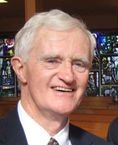
Extract from Eric Hodgens, John Menadue blog, 30 June 2018
The Catholic Church is facing a perfect storm. How well will an Australian National Synod deal with it? The 19th century was a stormy period for the Catholic Church as the papacy battled to regain its European dominance undermined by the Enlightenment and the French Revolution. How appropriate that the First Vatican Council final vote declaring Papal Infallibility was accompanied by thunder and lightning – a massive storm. Papal power won out in the long run as Paul Collins has shown in “Absolute Power”. But – at a price. Four intertwining crises are currently creating a perfect storm for the Catholic Church. The first crisis stems from the Industrial Revolution, the Enlightenment and its progeny – human rights. This brought us cars in the garage and democracy in the forum. Authority now came from the people, not from the king (or pope). It took time to catch on. The Amish stuck doggedly to the horse and buggy – the Church to monarchy. But when the ordinary punter woke up that he was being taken for a ride the game was over. The second crisis is clerical sexual abuse. Priests have held consecrated authority for centuries, yet 7% of them have been found to be child abusers. Nothing deauthorises a consecrated class more than being found out harbouring criminals. No wonder that transparency is taboo for power institutions. Nowhere to hide. This leads on to the third crisis – corporate coverup of the crime, blaming the victim and persecuting the whistle-blower. Today’s social sciences have a lot to say about crisis management, but monarchs don’t readily take notice of new ideas that are not their own. The fourth is the inevitable outcome – the very culture of the institution is exposed as defective. There have been signs along the way that something was wrong.....(more)

Extracts from Media and Communications Office, Melbourne Catholic, Friday 29 June 2018
The Holy Father Pope Francis has appointed Most Reverend Bishop Peter Andrew Comensoli of the Diocese of Broken Bay as the ninth Archbishop of Melbourne. Archbishop-elect Comensoli (b.1964) grew up in the Illawarra region of New South Wales and was educated by the Good Samaritan Sisters and Marist Fathers. He studied commerce at the University of Wollongong and worked for a time in the banking sector. He entered the seminary in 1986 and was ordained in 1992. Following his ordination, Archbishop-elect Comensoli undertook postgraduate studies in moral theology in Rome and at the University of St Andrews in Scotland. After serving in a number of parishes in the Diocese of Wollongong, he was Diocesan Chancellor for six years prior to his appointment as Auxiliary Bishop to the Archdiocese of Sydney in 2011 and as Apostolic Administrator to the Archdiocese of Sydney in 2014. He has served as Bishop of Broken Bay for the past three-and-a-half years. The life of Christian discipleship is a precious gift, developed through hearing and responding to God’s call. In accepting this call to be a new missionary among God’s people of the Archdiocese of Melbourne, I readily acknowledge the great responsibility entrusted to me, along with the frailties I carry,’ he said. ‘To the good people of Melbourne, let me say that you are already in my prayers. As I come among you I place my trust in the tender encouragement of Jesus. We are pilgrims together in the Lord’s vineyard. As we take these first steps in friendship, may we anchor our lives to his Gospel.....In announcing the appointment, Pope Francis also accepted Archbishop Denis Hart’s resignation after 17 years as Archbishop of Melbourne. Archbishop Hart will serve as Apostolic Administrator of the Archdiocese until the installation of Archbishop-elect Comensoli on Wednesday 1 August.....(more) Photo: Melbourne Catholic

Edited extract from ACBC, Melbourne Catholic, 28 June 2018
Pope Francis has appointed Fr Charles Gauci, currently administrator of St Francis Xavier’s Cathedral in Adelaide, the seventh Bishop of Darwin. Australian Catholic Bishops Conference president Archbishop Mark Coleridge welcomed the appointment of a man who is known for his deep spirituality and real commitment to evangelisation. ‘Fr Charles has ministered to people from many walks of life – as a pastor in parishes, a chaplain to schools, a spiritual director and retreat leader,’ Archbishop Coleridge said. ‘He will be a great gift to the Church in Darwin with all its challenges and also a good addition to the Bishops Conference because of his long and varied experience as priest and teacher of the faith.’ Fr Gauci was born into a faith-filled family in Malta and arrived in Australia as a 13-year-old. He was ordained for Adelaide in 1977 and has served in parishes across the Archdiocese. He has also held a number of archdiocesan leadership roles, including as chairman of the Council of Priests.....Fr Gauci said he hopes to visit the Diocese – which takes in almost all of the Northern Territory – as soon as possible so he can meet the local people and speak with Bishop Eugene Hurley, who has served in Darwin for the past 11 years and as a bishop for almost 20 years. ‘Bishop Eugene is a great man; I’m humbled to succeed him. He will help me understand the Diocese, its communities and ministries. With that knowledge and discerning what God is asking of me, I will seek to fulfil the task now entrusted to me,’ he said. ‘I look forward to continuing to learn from all the people of God as their fellow traveller.’....(more) Melbourne Catholic ACBC
Extract from Inés San Martín, Crux, Vatican Correspondent, 28 June 2018
ROME - Pope Francis will create 14 new cardinals on Thursday, 11 of whom will be in a position to elect, and be elected as, the next pope. They come from 12 countries, including Madagascar, Japan, Pakistan, Iraq, Mexico, Peru, Spain and Italy, in another attempt by the pontiff to make the College of Cardinals a reflection of the universality of the Church.....(more)

The Vatican Congregation for the Clergy has issued a 'final' decision dismissing Heart’s Home founder Father Thierry de Roucy for 'disobedience'
Limited extract from Céline Hoyeau, subscription journal La Croix Internationals, 28 June 2018
France: In a rare Vatican decision, the founder of the international association Points Coeur (Heart’s Home), which has been sending young volunteers on mission since 1990, has been dismissed from the clerical state, La Croix has learned. The Vatican decision brought to a close a ten year long process marked by a complex process between Father Thierry de Roucy, now aged 61, the Heart’s Home organization, the bishop of the Diocese of Fréjus-Toulon and Rome. In 2011, de Roucy was found guilty of abuse of ecclesiastical power, sexual abuse and absolution of an accomplice in the person a young assistant priest. The latter was subsequently relieved of his priesthood at his own request after church authorities concluded that he had been subject to undue influence. 'Final' decision....(source) Photo: La Croix International, promesaartstudio/stock.adobe.com
Extract from John L. Allen Jr. Editor, Crux, 27 June 2018
ROME - Perhaps Pope Francis’s most powerful aide for the last five years, who will be named a cardinal tomorrow, says it’s still “premature” and “too early” to judge the results of the pontiff’s much-ballyhooed reform of the Vatican. “It’s still to early to judge the reform,” said Italian Cardinal-designate Angelo Becciu, speaking to reporters on Wednesday. “Many things have changed, things have been modified in discasteries [a word referring to Vatican departments], but we’re still searching to find the best path,” he said. The state of Francis’s reform has been questioned lately by observers who note that aside from the consolidation of some pre-existing Vatican departments and the creation of some new ones, there’s been little tangible change in Vatican structures and operations. In the meantime, the Vatican’s traditional centers of power, especially the all-important Secretariat of State, appears to have consolidated its role rather than seeing it diminished or redefined. Becciu, however, counseled patience....(more)
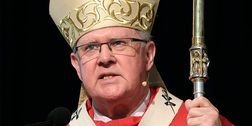
Extract from Mark Bowling, The Catholic Leader, 27 June 2018
BRISBANE Archbishop and Australian Catholic Bishops Conference president Mark Coleridge has used a Vatican visit to publicly demand bishops “be accountable” in changing Church culture that made child abuse possible. “We’re not above the law, we are not a law unto ourselves nor is the Church a law unto herself,” Archbishop Coleridge said following a conference on safeguarding and child protection held at Rome’s Pontifical Gregorian University on June 18-21. In Rome, Archbishop Coleridge also met with leading Church officials interested in the episcopate in Australia, the process of responding to the Royal Commission and preparations for the Plenary Council. He used a lunch hosted by the Australian Ambassador to the Holy See and attended by the Vatican’s deputy foreign minister, to reiterate his key message: “… that the bishops are keen to work with the government in tackling child abuse at every level”. “The presence of Vatican officials made it clear that the Holy See shares the same commitment,” Archbishop Coleridge said. Archbishop Coleridge was one of several Australian keynote speakers at the Anglophone Safeguarding Conference, reflecting on the theme “Culture, an enabler or barrier to safeguarding”. Some elements of Catholic culture had been “very destructive” and there were aspects of Church culture that had hindered progress in addressing allegations of sexual abuse, Archbishop Coleridge said. “I’ve tried to identify the points at which Catholic culture made child abuse possible and also gave rise to the cover-up of the abuse that happened,” he said. “One word that’s used to describe a large and complex phenomenon within the culture is clericalism – in other words, authority geared to power and not to service. “In many ways, what happened in the Catholic Church was that our strengths became our weaknesses.” Archbishop Coleridge said an example of those strengths was that closeness that Catholic clergy and religious shared with families. However, he said, it was precisely that which, “in certain situations, gave them access to the children who were abused”. Nevertheless, Archbishop Coleridge said that just as strength can become a weakness, a weakness could also become a strength. “I believe that the agony we are passing through this time in fact is a purification of the Church that has already made us stronger,” he said.....(more). Photo Catholic Leader, Emilie Ng
Extract from James Roberts, The Tablet, 27 June 2018
Pope Francis expanded on the issue in the press conference on the plane back from Geneva to Rome on Monday. The leadership of the German bishops’ conference today issued a statement saying that they are determined vigorously to pursue the initiative on intercommunion that they launched after their plenary in February this year. The initiative, they said is aimed at producing “greater unity” between Christian Churches. In Germany the vast majority of mixed marriages, couples the handout seeks to accommodate, are between Catholics and Lutherans. “It is important for us that we are on an ecumenical quest to achieve a more profound understanding and even greater unity among Christians, and we consider ourselves to be obliged to stride forward in this matter courageously,” the permanent council of the conference said. The council is made up of the current 26 diocesan bishops, out of a total conference membership of 66. A decision to help mixed-denomination couples to both receive communion, and an associated handout for parishes, was approved at the bishops’ conference’s spring plenary on 22 February by a two-thirds majority, and has since proved highly controversial. One month later, on 22 March, seven bishops, including Cardinal Rainer Maria Woelki of Cologne, Germany’s largest diocese, sent a letter to the Congregation for the Doctrine of the Faith (CDF) in Rome asking for clarification as to whether the issue was within the competence of a local bishops’ conference or rather a matter for the Universal Church. Francis reaffirmed on the plane that under the Code of Canon Law, it is up to the local bishop to decide under what conditions communion can be administered to non-Catholics, and not up to local bishops’ conferences. The problem with having an entire bishops’ conference deal with such questions is that “something worked out in an episcopal conference quickly becomes universal”, he said. Whatever the German conference may come up with in the end, he said, will likely be “an orientational document so that every one of the diocesan bishops can determine by himself what the Code of Canon Law already permits.”.....(more)
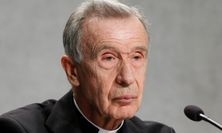
Extract from Christopher Lamb, The Tablet, 27 June 2018
Ladaria has said that the ruling against women being ordained priests was definitive, infallible teaching
The leader of the Vatican’s doctrinal congregation sought to play down expectations about the possibility of female deacons today, arguing that a commission set up by Pope Francis was focussed on their historical role in the early Church rather than on ordination. Cardinal-designate Luis Ladaria told reporters in the Vatican on 26 June, that while women deacons existed in the early Church they were “not the same” as their male counterparts. “The question the Pope has asked, and we have to answer, is what the situation for deaconesses was in the old Church. We know from the sources that they existed in the old Church: but what was the meaning of deaconesses? Was it the same as [male] deacons?” the Prefect of the Congregation for the Doctrine of the Faith said on Tuesday. The doctrinal prefect, who is to be created cardinal by Pope Francis in a ceremony in St Peter’s on 28 June, is president of a body formally established by Francis in August 2016 to examine women deacons. Ladaria said that “the work of the commission is at a good point,” that they had studied the question the Pope had put to them and “passed to the Holy Father our conclusions.” His remarks are the first public comments about the body’s work since it was set up almost two years ago. And he repeatedly underlined that the commission - made up of twelve theologians split equally on gender grounds - was not tasked with giving a yes or no to ordination.....(more) Photo: The Tablet, CNS/Paul Haring

The Catholic Church turned its back on Father Glen Walsh, says his brother
Extract from Joanne McCarthy, Newcastle herald, 23 June 2018
GLEN Walsh was the whistleblower Catholic priest who died alone in a Newcastle church building in November, only weeks before he was due to give damning evidence at the trial of Archbishop Philip Wilson. He took his own life, aged 55 – a priest who paid a devastating price for reporting Hunter paedophile priest Jim Fletcher to police in 2004, while the archbishop kept silent about what he knew. “The church turned its back on Glen,” said his brother, John, only weeks after Wilson was convicted in Newcastle for concealing Fletcher’s crimes, in a case that made headlines around the world. “My brother was a good priest but he was completely shell-shocked after what happened in 2004. He was a shattered man. I watched as he became a shadow of the man he once was,” John Walsh said. Father Walsh’s family has broken the silence imposed by the Wilson trial to reveal the agony they experienced after his suicide. The priest died only months after Maitland-Newcastle Bishop Bill Wright issued an extraordinary message to Hunter Catholic priests on February 10, 2017. The bishop urged clergy to welcome Father Walsh back to the Hunter region. It was more than a decade after the priest was “perhaps sent to Coventry” to live in Sydney and the Central Coast after reporting child sex allegations about Jim Fletcher to police in 2004, Bishop Wright noted. He became something of a whistle-blower and he encountered the opposition and ill-feeling that whistle-blowers often do. Bishop Bill Wright about Father Glen Walsh “What is important to realise is that, essentially, Glen did the right thing,” Bishop Wright wrote....(more). Photo: Newcastle Herald.
Extracts from Junno Arocho Esteves - America The Jesuit Review, Catholic News Service, 22 June 2018
ROME (CNS) -- In the wake of historic allegations of sexual abuse and cover-up in countries around the world, the Catholic Church is experiencing the same challenge that has brought a reckoning to those who used their authority to abuse or silence victims, said an Australian archbishop. Allegations such as those raised against Cardinal Theodore E. McCarrick, retired archbishop of Washington, represent a "major shift" within the culture of the church, Archbishop Mark Coleridge of Brisbane said June 21. Abuse survivors are "willing to speak and they are believed," and the church has new processes of investigation, he added. "It's not unrelated to the #MeToo phenomenon; there's something going on in the culture. And one of the elements of that cultural shift is that people are prepared to speak up in a way that they would never have done before," he told journalists following a four-day conference in Rome on safeguarding and child protection. The Anglophone Safeguarding Conference, held at Rome's Pontifical Gregorian University June 18-21, reflected on the theme, "Culture, an enabler or barrier to safeguarding." Among the speakers at the conference was Jesuit Father Hans Zollner, head of the Pontifical Gregorian University's Center for Child Protection, and Bishop Gilles Cote of Daru-Kiunga, Papua New Guinea. While local cultures can influence how the church in a particular area handles abuse cases, there are aspects of church culture that have hindered progress in addressing allegations of sexual abuse, Archbishop Coleridge told Catholic News Service June 21. "One word that's used to describe a large and complex phenomenon within the culture is clericalism. In other words, authority geared to power and not to service," he said. "In many ways, what happened in the Catholic Church was that our strengths became our weaknesses." An example of those strengths was that closeness that Catholic clergy and religious shared with families. However, he said, it was precisely that which, "in certain situations, gave them access to the children who were abused." Nevertheless, Archbishop Coleridge said that just as strength can become a weakness, a weakness can also become a strength. "In many ways, what happened in the Catholic Church was that our strengths became our weaknesses." "I believe that the agony we are passing through this time in fact is a purification of the church that has already made us stronger. It's kind of a searing grace that we never saw coming, and we certainly wouldn't have chosen. But somehow, God is in the midst of it all, purifying the church and calling us to what we are intended be," Archbishop Coleridge told CNS.....(more)
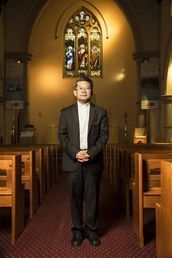
Extracts from Joanne McCarthy, Newcastle Herald, 21 June 2018
There are growing calls for Australia's bishops to release a Truth Justice and Healing Council report. Bishop of Parramatta Vincent Long has broken ranks with the Australian Catholic Bishops Conference to join reform groups and politicians calling for public release of a church report responding to the child abuse royal commission. Keeping the four-volume, 1000-page, church-commissioned Truth Justice and Healing Council report “in-house for any period longer than necessary” is “not in the interest of the kind of church the Pope speaks about”, said Bishop Long in a statement this week. Pope Francis recently urged all Catholics “not to be afraid of being the central drivers of the transformation that is being demanded today” in the wake of the child sexual abuse tragedy. The Australian Catholic Bishops Conference said it would “take some time” to consider the TJHC report it received in March, and would formally respond to the royal commission when it had “completed our dialogue with the Holy See” and received advice from an implementation advisory group appointed in May. On Tuesday shadow social services minister Jenny Macklin said the TJHC report should be made public because “We need full transparency from the Catholic Church on this issue”, more than six months after the Royal Commission into Institutional Responses to Child Sexual Abuse released its landmark final report. More than 60 per cent of abuse allegations to the commission related to Catholic institutions, and there were more than 4400 abuse allegations between 1980 and 2015. “People who have suffered abuse deserve to see the formal response to the royal commission’s recommendations from the Truth, Justice and Healing Council. The royal commission did not make its recommendations lightly,” Ms Macklin said. Attorney General Christian Porter responded to questions about the TJHC report by saying the key to protecting future generations was for “all those involved to be open and transparent about what occurred and what is being done to prevent a recurrence”. State governments and institutions that decide not to accept the commission’s recommendations “should state so and why”, Mr Porter said. In NSW Parliament on Tuesday NSW Greens MP and justice spokesperson David Shoebridge, who played a key role in the campaign for a royal commission, lodged a notice of motion calling for the report’s immediate release because “it’s well past time that survivors, victims and their families and supporters saw the Catholic Church’s response”. “It may be that the TJHC report reflects unfavourably on actions taken by the hierarchy. If that is the case then it’s precisely why it must be released immediately,” Mr Shoebridge said..........Bishop Long, who was sexually abused by clergy as an adult, told the royal commission in February, 2017 the church needed to “dismantle the old model” of Catholicism and end a “pecking order” that had lay people “right at the bottom of the pyramid”. In a statement this week he said all Catholics should be involved with the church’s response to the royal commission, including “taking into account the Truth, Justice and Healing Council (TJHC) report”. The Pope’s comments about church reform and a more active involvement by lay Catholics “should serve as an encouragement for the bishops to engage closely and respectfully with the faithful in responding to the child sexual abuse crisis”, Bishop Long said......(more) Photo: Newcastle Herald
Extract from CathNews, The Mercury, 21 June 2018
The reform plan has put the Tasmanian government at odds with the Church, which says priests must keep confessions secret. Tabling the government’s response to the Final Report of the Royal Commission into Institutional Responses to Child Sexual Abuse in Parliament yesterday, Attorney-General Elise Archer said careful consideration had been given to its 409 recommendations. The Tasmanian government has accepted in whole or in principle the vast bulk of the commission’s recommendations that lie within its jurisdiction and says it will give further consideration to all but three. Ms Archer said state laws would be reformed to provide greater protection to children. “Tasmania will be one of a number of jurisdictions in taking the lead in accepting in principle the need to include priests as mandatory reporters, and importantly to lift the veil from the confessional for the purpose of such reporting,” she said. “The Tasmanian government also accepts, in principle, the need for a specific criminal offence for the failure to report child sexual abuse and criminalising such behaviour,” she said. “Consistent with the need to put children first, the government also accepts in principle the child safe standards recommended by the royal commission.” Hobart Archbishop Julian Porteous backs mandatory reporting but not when it means breaking Church law that requires priests to uphold the seal of confession, 9news.com.au reports. He said any allegations and suspicions of child or vulnerable adult abuse must be reported and acted on.
"The Catholic Church in Tasmania has zero tolerance for the abuse or neglect of children or vulnerable adults and is committed to acting in their best interests," he said yesterday. He joined Catholic bishops across Australia in opposing any legal changes forcing the reporting of abuse revealed in confession, which under canon law would result in a priest's excommunication from the Church....(more)

Extract from CathNews, 21 June 2018
At a national gathering of members yesterday, Catholic Religious Australia elected Josephite Sister Monica Cavanagh as its new president. The 42nd National Assembly of Catholic Religious Australia began on Tuesday, exploring the theme of “Religious in Australia: Evolving with Hope”. Electing a new president and council was a significant part of the gathering. Sr Monica, the congregational leader of the Sisters of St Joseph, said it was “a great honour” to be elected by her peers. “I believe the voice of religious men and women is very important at this time in the life of the Church and the community. We are called to be the prophetic voice – we must be courageous and respond as ecclesial women and men,” Sr Monica said. After a structural review, CRA has moved away from state representation to a model of shared leadership. In a statement release yesterday, CRA said: “The new council members take on this role with great energy and passion for responding to the challenges and opportunities of today’s Church and society. “They are a council who stand together and are committed to strengthening the voice of the religious in Australia.”....(more). Photo: CathNews
Extract from Laurie Goodstein and Sharon Otterman, New York Times, 20 June 2018
Cardinal Theodore E. McCarrick, the former archbishop of Washington and a prominent Roman Catholic voice in international and public policy, has been removed from ministry after an investigation found credible allegations that he sexually abused a teenager 47 years ago while serving as a priest in New York. The news comes at a time when Pope Francis has endeavored to overcome criticism that he has turned a blind eye to child sexual abuse by clergy in Chile and elsewhere. The New York Archdiocese said in a statement that the Vatican was informed and involved in the investigation into Cardinal McCarrick, and that the cardinal has ceased his public ministry “at the direction of Pope Francis.” Cardinal McCarrick, 87, said in a statement that he was innocent, but that he cooperated with the process and accepted the Vatican’s decision. “While I have absolutely no recollection of this reported abuse, and believe in my innocence,” his statement said, “I am sorry for the pain the person who brought the charges has gone through, as well as for the scandal such charges cause our people.”...(more)
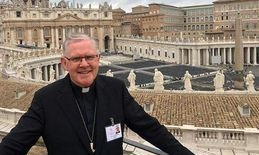
Limited extract from Inés San Martín, John L. Allen Jr, Christopher White, Cruxnow, 20 June 2018
ROME - Arguably, few people in Australia can say they are more on the front lines in picking up the pieces after the recently concluded Royal Commission into Institutional Sexual Abuse that was highly critical of the Catholic Church than Archbishop Mark Coleridge, elected as president of the country’s bishops’ conference last month. Despite the challenges, which also include trials of two of Australia’s most renowned clerics, Archbishop Philip Wilson in Adelaide and Cardinal George Pell, the Vatican’s finance czar, Coleridge is convinced that when it comes to fighting clerical sexual abuse, a “change in culture” is needed and is already in motion. “There’s absolutely no room for complacency, but there is room for encouragement,” Coleridge told Crux on Monday in Rome. The Australian prelate is in the eternal city this week to participate in the “Anglophone Safeguarding Conference,” a yearly gathering taking place since the early 2000s, bringing together bishops’ conferences from the English-speaking world under the aegis of Rome’s Centre for Child Protection at the Pontifical Gregorian University. Among other things, Coleridge spoke with Crux about the role of the laity in addressing the problem, because if “there had been more lay people involved in decision making roles in times past, we wouldn’t have the catastrophe on our hands that we now have.” “There’s no point in denying that, generally, clericalism was at the heart of the problem, and still is. Part of the culture shift we’re trying to bring about is to break the hold of that clericalism. Therefore, obviously lay people need to take on responsibilities that are new in the Catholic Church,” he said.....(more) Photo: Cruxnow, Religion News Service, David Gibson
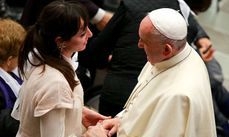
Extract from Elise Hart, Catholic News Agency, 20 June 2018
Vatican City, Jun 20, 2018 / 03:01 pm (CNA/EWTN News).- In an interview with Reuters, Pope Francis said more space has to be created for women to take on leading roles in the Roman Curia, but that priestly ordination is not an option. Responding to a question about women's ordination to the priesthood, the pope said “there is the temptation to 'functionalize' the reflection on women in the Church, what they should do, what they should become.” “We cannot functionalize women,” he said, explaining that while the Church is referred to as a woman, the Sacrament of Holy Orders is out of the question “because dogmatically it doesn't work.” “John Paul II was clear and closed the door, and I will not go back on this. It was something serious, not something capricious,” he said, adding, “it cannot be done.” However, Francis stressed that while the priesthood is out, women do need to be given more opportunities for leadership in the Roman Curia – a view he said has at times been met with resistance. “I had to fight to put a woman as the vice-director of the press office,” he said, referring to his decision in 2016 to name Spanish journalist Paloma Garica Ovejero as the Vatican's deputy spokesperson. He said he at one point offered a woman the job of heading the Vatican's Secretariat for Communications, but she turned it down because “she already had other commitments.” Women in the Curia “are few, we need to put more,” he said, adding that it can be either a religious sister or a laywoman, “it doesn't matter,” but there is a need to move forward with an eye for quality and competency in the job. “I don't have any problem naming a woman as the head of a dicastery, if the dicastery doesn't have jurisdiction,” he said, referring to the fact that some Vatican departments have specific functions in Church governance that require a bishop to do the job. Lay men are also ineligible to oversee offices that require the jurisdictional authority of a priest or bishop. For example, the Vatican's Congregation for Clergy has jurisdiction, so it has to be led by a bishop, but for others, such as the Vatican's Secretariat for the Economy, “I would not have a problem naming a competent woman,” Francis said. Women must continue to be promoted, but without falling into “a feminist attitude,” the pope said, adding that “in the end it would be machismo with a skirt. We don't want to fall into this.” ....(more) Photo: Catholic News Agency Ibanex CNA
Extract from Garry Everett, John Mendue Blog, 20 June 2018
The cross has long been a radical and confronting symbol among religious groups. In a similar way, at the crossroads of life, we are challenged by choices which will lead us to either good or ill. The Catholic Church in Australia has reached the crossroads and there is an urgency to the choices that must be made. The old ways have run their course and new ways must be found. In Pope Francis , we have a leader who is challenging the Church with a new vision. Francis is a believer in devolution; he does not want every decision affecting the Church to be made in Rome. Recently he challenged the German Bishops to meet and to arrive at “as near a unanimous decision as possible” on a contentious matter affecting Catholics and some Lutherans in Germany. More recently he received the resignations of all the bishops in Chile, following the catastrophic impact of the cover up of sexual abuse cases in that country. When Francis speaks of devolution of decision-making, he is also speaking of devolution of responsibility. Many bishops have found this challenge too difficult. They are happy for Rome to carry the blame for anything that goes wrong. In Australia, Archbishop Fisher in speaking about the Plenary Council (a meeting of the whole Church: priests; religious and laity) announced that the Council could not change the Church’s teachings or discipline. In the current context established by Pope Francis, that may be too sweeping and extreme a statement.
The Catholic Church can sometimes forget that it is in, and on mission to, the modern world, with all the world’s problems and successes. It is one thing to have 2000 years of almost unchanged beliefs and teachings, and another thing to engage constructively with contemporary social issues showing some understanding of the need for change. The recent decisions by many countries regarding gay marriage is often regarded as a failure of the Church to convince people to adhere to Church teachings. Yet Pope Francis has signalled a different approach to homosexuality, and this approach is up-setting many Bishops. What next?....(more)
Extract from ICRN, 20 June 2018
The Vatican’s World Meeting of Families [WMF], to be held in August in Dublin, Ireland, needs to send clear signals that ALL families, including LGBT families will be welcomed. Just as Pope Francis has been meeting regularly with survivors of sexual abuse to listen to their stories, we call on him to meet LGBT families, who have long suffered from another form of clerical abuse. Moreover, LGBT families should be invited to make presentations as part of the official program so that the other participants, and indeed the whole Church, can hear their stories. What arrangements are being made to guarantee that at least one of the five families who will give witness at WMF will be an LGBT family? Will the program include any parents who have LGBT children? Will a same-gender couple testify about the joys and difficulties of raising children? Will participants hear from a transgender person about their experience of family? Will even one such event happen?....(more)

Extract from opinion piece, The Conversation, 19 June 2018
In the aftermath of the legalising of same-sex marriage in Australia, the Anglican Church has ramped up its discrimination against gay people to new heights. Not content simply with the discrimination built into the legislation – per ministers of religion to refuse to marry same-sex couples – conservatives in the Anglican Church are making sure the church is a complete no-go zone for gay couples. To begin with, Anglican clergy are not actually free to marry same-sex couples, should they wish to do so. And many clergy would like to. The state licenses ministers to perform marriages only according to their church’s authorised marriage rites. Conservatives have been quick to point out that the Anglican Church’s wedding services are specifically for male-female marriages, and so cannot be used legally for same-sex weddings. Now the Anglican bishops have added a raft of new restrictions as well.....(more)
The window of opportunity to deal with the problem before it becomes a major scandal is closing
Limited extract from Fr William Grimm MM, subscription journal La Croix International, 18 June 2018
Pope Francis accepted the resignations of three Chilean bishops in connection with the cover-up of sexual abuse by clergy in their country. One bishop was the lightning rod for uproar among Chile’s Catholics because of accusations that as a priest he covered up abuse by a priest who was his mentor. The pope’s appointment of him as a bishop and his initial vehement defense of the man in the face of protests have been the low point of Francis’ papacy. The other bishops whose resignations were accepted have already reached the episcopal retirement age of 75, so the pope’s having them step down is not going to satisfy critics who point out that cover-ups have been a systemic problem involving more than a handful of bishops. By having the entire Chilean hierarchy come to Rome, Francis seems to....(source)

Extracts from the 16 June 2018 Press Release of the “International Catholic Reform Network” (ICRN), 18 June 2018
Pezinok/Slovakia. Fifty Catholics from 18 countries and 4 continents gathered near Bratislava, Slovakia from June 11 – 15, 2018. Formed as the International Catholic Reform Network (icrn.info) in 2013, the participants of this year’s conference learned from members of the former Czechoslovak Underground Church about positive resistance. The group was inspired by the testimonials of the people who endured severe oppression under the communist regime of that time. “We value the courageous acts of Bishop Davidek and others who recognized the pastoral need to bring the sacraments to communities of faith,” said Peter Krizan of the group OK21 – Society for Open Christianity for the 21st Century. “We need to endure and be vigilant, so that we do not miss 21st Century’s Pentecost.”, Krizan added. “Their courage, integrity, and willingness to take risks for freedom and the ongoing life of the Church is awe inspiring,” said Deborah Rose-Milavec, executive director of FutureChurch, a reform organization in the United States. ....“In a two-fold strategy, the reform movements will continue to support Pope Francis’ reform approach and at the same time, foster new ways of leading Christian parishes as equals on a grass root level,” said Christian Weisner, board member of We Are Church Germany. “We strongly support the substantial reforms Pope Francis is implementing against strong resistance within the church hierarchy. ”, he emphasized.....Participants of the Conference came from Argentina, Australia, Austria, Brazil, Czech Republic, Estonia, Germany, Great Britain, India, Ireland, Netherlands, Poland, Russia, Slovakia, South Korea, Switzerland, Ukraine and the United States. Italy and Kenia had to cancel their prearranged attendance at short notice. ...(more) Photo: ICRN
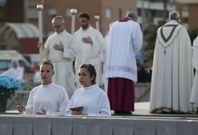
Attempts to link maleness and priesthood through the ages have failed the test
Extracts from John Wijngaards, Opinion Piece. Mational Catholic Reporter, 18 June 2018
What do these popes have in common? Nicholas V (1454) authorised Christian conquerors to enslave native peoples. Innocent VIII (1484) endorsed the torture and execution of witches. Benedict XIV (1745) condemned taking interest on capital loans as a mortal sin. Pius IX (1864) declared non-Christians could not obtain eternal salvation. John Paul II (1994) taught that priesthood is reserved only to men. All defended errors based on a mixture of misread scripture and ill-informed prejudice. The only difference is that whereas the other erroneous teachings have now been discarded by the official church, the prefect of the Congregation for the Doctrine of the Faith last month still repeated Pope John Paul II's mistaken view. Archbishop Luis Ladaria writes: "The impossibility of ordaining women belongs to the 'substance' of the sacrament of order, a fact the Church recognizes. She cannot change this substance. … It is not just a question of discipline, but of doctrine." This is a massive claim that needs to be exposed for the fallacy it is. Take note: the archbishop asserts that the exclusion of women is not just a practical custom going back to Jesus. A fundamental obstacle is at stake, a trait that makes every woman an intrinsic mismatch to the eucharistic priesthood of Christ. What is he talking about?....Some women presided at the Eucharist in early Christian communities. But the Hellenistic-Roman context in which the church grew up soon strangled such "anomalies." The reason? Women were considered mentally and physically inferior. Roman law deprived them of public office. As Augustine succinctly remarked: "Women rank below men by nature and law."....(more) Photo: NCR, CNS/Paul Haring

Presentation of the Pontifical Yearbook 2018 and of the "Annuarium Statisticum Ecclesiae" 2016, 13.06.2018
Whilst perhaps not a headline to command attention the substance of this translated Bulletin from the Holy See Media Office contains a great deal of interesting data on the composition of the Catholic Church and its global demographics.
Extract from Google translation (with caveats on translation accuracy), Holy See Press Office, Saturday 16 June 2018
Edited extract from Google translation (with caveats on accuracy), Holy See Press Office, Saturday 16 June 2018
The Pontifical Yearbook 2018 and the Annuarium Statisticum Ecclesiae 2016, which was edited by the Central Statistical Office of the Church, are currently being distributed in bookstores, with a delay due to the passage to more advanced methods of editing and production. and performing of the two yearbooks. The printing work of both volumes was done by the Vatican Press. From the reading of the data reported in the Pontifical Yearbook, we can deduce some news concerning the life of the Catholic Church in the world, starting from 2017. During this period, 6 new Episcopal seats and 4 Eparchies were erected; a diocese has been elevated to the Metropolitan Seat and 3 Apostolic Vicariates have been raised to the Diocese. The statistical data of the Annuarium Statisticum , referring to the year 2016, allow us to update some basic numerical aspects of the Catholic Church in the world context and highlight the most marked and most important trends. The number of baptized Catholics in the world rose from 1,285 million in 2015 to 1,299 million in 2016, with an overall increase of 1.1%. This increase is lower than the average annual increase recorded during the period 2010-2015 (1.5%); and again this growth is slightly lower than that of the world population between 2015 and 2016; so that the relative presence of baptized Catholics does not diminish by a few thousandths: from 17.73 Catholics per 100 inhabitants in 2015 to 17.67 in the following year. The distribution of Catholics, according to the different demographic weight of the different continents, is different in the various geographical areas....(more of the Google translation HERE)
Extract from John Menadue blog (and origonally SMH 13/6/2018), 15 June 2018
Everything changed on December 15, 2017 when the Royal Commission into Institutional Responses to Child Sexual Abuse presented its final report and recommendations to the Australian public. It’s a shame Australia’s Catholic bishops missed the memo. The royal commission exposed in sickening, staggering detail the church’s crimes against thousands of children in Australia alone, and its culpability as an organisation that protected criminals and facilitated those crimes. But the bishops, in response, are acting as if nothing has happened. Sure, they’ve promised change. They’ve released pious statements. They’ve even used the words “humility” and “humbled” in the right context. But with every move they make, with every step they don’t take, Australia’s bishops show they don’t understand that their relationship with Australians has changed. Has had to change. In the words of Hunter abuse survivor Bob O’Toole, “They don’t seem to get that they don’t call the shots anymore.” The church kept its crimes and its criminals secret for decades because it didn’t want the scandal that would damage its authority and power. It wasn’t naivety or innocence – as too many senior churchmen argued over the years – but a clinical, systemic, cold-blooded process designed to protect the “brand”, informed by centuries of “calling the shots” on how other people should live their lives. All swept away. The secrets aren’t secret anymore. The powerless reclaimed some power by speaking out. And that requires the church and its bishops to cede power, which is where they’re failing now. In the past week I’ve put questions to the Australian Catholic Bishops Conference about if and when it is going to release a report completed by its Truth, Justice and Healing Council three months ago in response to the royal commission’s report and recommendations. I’m not the only one who thinks the council might have gone much further than the bishops expected in supporting the royal commission’s recommendations for historic change in the church – on governance, canon law, reporting to secular authorities, celibacy, women in leadership positions and the iconic issue of breaching the “sanctity” of the confessional. The bishops haven’t released it, and based on the pile of words I’ve received in response to my questions, won’t be doing so any time soon. They are consulting with people, and that even includes lay people, they said. But there’s where the problem lies. The bishops have picked those consulted. Groups like Catholics for Renewal – including academic and former priest Peter Wilkinson, who produced a ground-breaking report in 2017 that revealed exactly how radically the church has to change to prevent abuse occurring in future – are out in the cold.....(more)
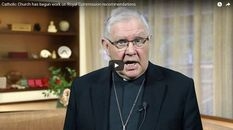
Extract from Media and Communications Office, Melbourne Catholic, 14 June 2018
ACBC President, Archbishop Mark Coleridge will head to Rome this week to attend a conference of English speaking Catholic leaders to discuss best practice for child safety. To cooincide with his trip, he has released a video explaining that many of the recommendations given to the Church by the Royal Commission into Institutional Responses to Child Sexual Abuse have already been implemented. Others, however, need deeper conversations and a strategy to be put in place. He also addresses the issue of the seal of confession, stating 'The Catholic Church does not view the sacramental seal as incompatible with maintaining child safety. The Church is committed to taking all measures to make child safe environments, however there is nothing to suggest that legal abolition of the seal will help that.'....(source) Photo: Melbourne Catholic.

There is no doubt that the protection of children and youth against sexual violence remains a central problem in the Catholic Church and in society
Limited Extract from Hans Zollner SJ, Vatican City, subscription journal La Croix International, 14 June 2018
The issue of sexual abuse of minors committed by clergy is constantly returning to the forefront of media attention. Recently, through various news outlets and publications worldwide, this focus has been particularly sustained for the Karadima case in Chile. It's hard to say why that has resonated with people around the world more than other cases have. The offer of resignation by all Chilean bishops is a sign of huge importance, which is in line with a development that we have seen over the last years. There is no one turning point — the ship of the church is slowly moving in another direction. It is a huge effort, and change is on the way. For Pope Francis, calling a whole bishops' conference to Rome has been new. John Paul II and Benedict XVI summoned cardinals and bishops to discuss clerical sexual abuse, but this is new for Francis. He takes the problem seriously. The message is "let us look at the system; let us look at the whole ship." The message communicated by his own behavior is "admit when you have failed and be honest." Despite everything that has happened in recent months, he gets it, he expresses sorrow, he asks for forgiveness. This is the point: he has a heart. People have the impression that other high-ranking prelates do not have a heart. There is no doubt that the protection of children and youth against sexual violence remains a central problem in the Catholic Church and in society.....(source) Image: La Croix International.
Extract from James Macintyre, The Tablet, 14 June 2018
Police and prosecutors yesterday raided Catholic Church offices in two Chilean cities looking for documents and investigative reports related to the sex abuse scandal that has rocked the country. The surprise raids took place at the headquarters of the Ecclesiastical Court in Santiago, and the bishop’s office in Rancagua, in the O’Higgins region where 14 priests are accused of having had sexual relations with minors, the Associated Press (AP) reported. “In Chile, we are all subject to common justice,” said prosecutor Emiliano Arias, who led the raid in Santiago. Cardinal Ricardo Ezzati, the Archbishop of Santiago, said Church officials “gave the prosecutor all the requested documentation”, adding that the officials are “available to cooperate with the civilian justice system in all that is required”. Last month, all of Chile’s 31 active bishops offered to resign over their collective failure to protect Chile’s children from priests who committed abuse, including rape. The police raids came as two leading Vatican investigators, Archbishop Charles Scicluna, and Spanish Monsignor Jordi Bertomeu, are in Chile to investigate the sexual abuse of minors committed by clergy. Scicluna and Bertomeu earlier this year put together a 2,300-page report that led the Pope to realise that he had misjudged the situation in Chile and to concede that he had made “grave mistakes” in previously defending Bishop Barros of Osorno, who is at the centre of cover up claims. On Monday, Francis accepted the resignation of Barros, along with that of Archbishop Cristián Caro Cordero of Puerto Montt and Bishop Gonzalo Duarte García de Cortázar of Valparaíso. The Pope named a temporary leader for each diocese. Barros, 61, has been the subject of intense controversy since Francis appointed him bishop of Osorno in 2015 despite objections from local Catholics, the Pope’s own sex abuse prevention advisers and certain other bishops in Chile. In a letter addressed to Chile's bishops and released by the Vatican in April, Francis said he had made “serious mistakes in the assessment and perception of the situation, especially due to a lack of truthful and balanced information”.....(more)
National apology for child sexual abuse survivors
Extract from CathNews, The Australian, 14 June 2018
The
Turnbull Government has promised to deliver a national apology to
survivors and victims of institutional child sexual abuse, and their
families, later this year, as part of its official response to the royal
commission. Source: The Australian. The
Royal Commission into Institutional Responses to Child Sexual Abuse
delivered its findings late last year, giving the commonwealth, state
and territory governments six months to respond. Of the 409 recommendations made, 122 fell wholly or partially under the Commonwealth’s jurisdiction. “We’ve
already acted on many of the recommendations of the commission, but
today, we accept or accept in-principle 104 of the remaining 122
recommendations directed wholly or in part to the Australian
government,” Prime Minister Malcolm Turnbull said. “The
additional 18 recommendations have been noted as they require further
consideration. We’ve not rejected any of the royal commission’s
recommendations.” Mr Turnbull announced a new federal office to
monitor child safety and said he would deliver his national apology on
October 22 to coincide with National Children’s Week. He has formed a
national apology reference group to ensure the apology meets the
expectations of survivors. “Now that
we’ve uncovered the shocking truth, we must do everything in our power
to honour the bravery of the thousands of people who came forward,” he
said. On the question of the seal of the
confessional, Mr Turnbull said the safety of children must come first,
but he acknowledged it was largely an issue for the states to determine
and Attorney-General Christian Porter would be talking to the states to
try and ensure a harmonised outcome. Australian
Catholic Bishops Conference President, Archbishop Mark Coleridge,
welcomed the government’s response to the royal commission , including
measures to standardise approaches to child safety and research to help
prevent child sexual abuse in the future. “The
Catholic Church has already begun its work to respond to the
recommendations of the royal commission. Some of those responses began
during the course of the royal commission,” he said....(more)

Statement from Australian Catholic Bishops Conference president Archbishop Mark Coleridge, 13 June 2018
The Australian Catholic Bishops Conference welcomes the Turnbull Government’s response today to the Royal Commission into Institutional Responses to Child Sexual Abuse, including measures to standardise approaches to child safety and research to help prevent child sexual abuse in the future. The Catholic Church has already begun its work to respond to the recommendations of the Royal Commission. Some of those responses began during the course of the Royal Commission. Across the country, child safeguarding offices have been established or strengthened in dioceses, archdioceses and other Catholic organi sations to streamline and centralise work on protecting children and young people in Church settings. At the national level, Catholic Professional Standards Ltd has been working with Church agencies, other non-government organisations and a number of gover nment agencies to produce consistent n ational s afeguarding s tandards for the Church. The Catholic Church was the first non-government institution to join the national redress scheme on the national level. The Church had called for such a scheme over recent years and is firmly committed to providing redress to survivors who were abused in Catholic settings. The Church also has established the Implementation Advisory Group, made up mostly of lay people, which is helping the bishops decide how to respond to the Royal Commission. The Australian Catholic Bishops Conference is considering advice from internal and external stakeholders, including the Implementation Advisory Group. The Federal Government’s response will also inform the bishops’ response in important ways. Regarding the issue of the seal of confession, the Catholic Church does not view the sacramental seal as incompatible with maintaining child safety. The Church wants measures that will genuinely make environments safer for children. There has been no compelling evidence to suggest that legal abolition of the seal of confession will help in that regard. Protecting children and upholding the integrity of Catholic sacraments are not mutually exclusive and the Church wants to continue to work with government to ensure both can be achieved and maintained.....(source)
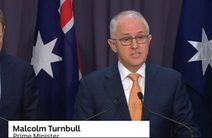
Edited Extract from ABC News, Wednesday 12 June 2018
Prime Minister Malcolm Turnbull will deliver a national apology to victims of institutional child sexual abuse on October 22 this year. Key points: The Federal Government will adopt 104 of 122 recommendations from the royal commission, and is still considering 18; That includes forcing priests to report information revealed to them during confession; WA will sign on to the national redress scheme, clearing the way for compensation to begin on July 1. Mr Turnbull this morning outlined the Federal Government's formal response to the five-year Royal Commission into Institutional Responses to Child Sex Abuse. The Prime Minister said 104 of the commission's 122 recommendations relating to the Commonwealth would be adopted, including the establishment of a national office for child safety. The Government will consider the other 18 recommendations but noted none had been rejected. A recommendation to make it an offence to fail to report that a child is at substantial risk is still being considered because states have to all agree on the wording. The royal commission recommended forcing priests to report information revealed to them by people making confession. Federal Attorney-General Christian Porter has made it clear he supports the contentious recommendation. But the Australian Catholic Bishops Office said there had been no compelling evidence to suggest that removing the protection for confession would improve child safety....(more) Photo: ABC News
Extract from and link to ACBC Summary Report, 12 June 2018
On Thursday, May 3 , the Catholic bishops of Australia gathered for the biannual p lenary m eeting at Mary MacKillop Place, North Sydney. The 14 c ommissions of the Australian Catholic Bishops Conference held meetings on the first day of the gathering, followed by the Plenary Meeting over the seven subsequent days....(more)

Limited extract from Massimo Faggioli, subscription journal La Croix International, 11 June 2018
A significant part of Pope Francis’ legacy will be his emphasis on the ecclesiology of synodality and his enhancement of the Synod of Bishops, which he systematically explained in an address in 2015 to mark this permanent institution’s fiftieth anniversary. Preparations are actively underway for the Synod’s next two gatherings — an ordinary assembly on young people and faith (October 2018) and a special assembly for the Pan-Amazon Region (October 2019). But it is not yet clear how far the Jesuit pope is willing to go with his project of making the Church more synodal. Now in the sixth year of his pontificate, the differences between the Synod assemblies under Francis are in marked contrast with those of his predecessors. There was more genuine and open debate at the assemblies on the family 2014 and 2015, and there was a truly synodal elaboration and reception of the post-synodal exhortation Amoris Laetitia. Yet there has been no radical change in the governance of the Church at the universal level besides the institution of the C9 advisory council of cardinals, but it is showing signs of fatigue. And at the national and local levels we have still not seen any renewal – or even beginning — of synodality. The Plenary Council that the Church in Australia is planning for 2020 is a one of the notable exceptions....(Source) Photo: La Croix International.


Edited Extract from Media and Communications Office, Melbourne Catholic, Thursday 7 June 2018
The Australian Catholic Bishops Conference (ACBC) ACBC today provided the minutes from the most recent Plenary Meeting of Australia’s Catholic bishops, held in Sydney 3–10 May. Among the key talking points, the ACBC committed significant time to the issues of child protection and safeguarding. The conference listened to presentations from the Truth, Justice and Healing Council Chair Justice Neville Owen and CEO Francis Sullivan, focussing on the national redress scheme for survivors of child sexual abuse. The bishops also discussed the place of the Catholic Church in Australian society. Several bishops pointed to the harm caused by the Church’s mishandling of allegations of child sexual abuse and emphasised the need for families, parishes and schools to be supported and nurtured by the Church. Additionally, the Bishops Commission for Pastoral Life outlined its concern of the widespread effects of mental illness. The Conference shared an interest in exploring what the Church can offer that governments and other entities cannot. Representatives of Catholic Health Australia and St Vincent’s Health Australia gave a presentation to the Conference detailing the implications of voluntary assisted dying legislation in Victoria. The bishops also passed a number of motions to restructure some of the 14 current commissions, including the merger of the commissions for Church Ministry and for Evangelisation to become the Bishops Commission for Catholic Life, Evangelisation and Ministry, taking on responsibility for youth.....(MORE) Read the ACBC Plenary Meeting full report on the ACBC website here

Extract from Christopher Prowse, The Canberra Times, 6 June 2018
The Barr government's plans to expand the Reportable Conduct Scheme to include religious organisations is to be commended but it should not ignore the concerns of the Catholic community. The Catholic Church shares the government’s concern to protect the safety of children and wishes to be a part of the solution. The draft laws are a consequence of the profound failure of the leadership of the church and the duty of care we owe to children. It is a failure that will haunt the church for decades, and which has haunted many survivors for even longer. For these failures, the church is sorry. I am sorry. Breaking the sacred seal of confession won’t prevent abuse and it won’t help our ongoing efforts to improve the safety of children in Catholic institutions, writes Archbishop Christopher Prowse. Breaking the sacred seal of confession won’t prevent abuse and it won’t help our ongoing efforts to improve the safety of children in Catholic institutions, writes Archbishop Christopher Prowse. At the same time, we are doing all that we can to make sure our schools and parishes are safe places and our protocols and procedures for responding immediately to such issues are in place. We have heard the Australian community, including the very concerned Catholic community, we have learned, and responded on a practical level. I am, committed to continuing this important work. I support the government’s reportable conduct scheme. When the government scheme to report all child abuse allegations to the ACT Ombudsman did not include parishes and communities of faith, I called for that anomaly to be rectified and strengthened. But I cannot support the government’s plan to break the seal on religious confession.....(more) Photo: The Canberra Times, Michael Rayner
Peter Johnstone, Friday 8 June 2018
The Royal Commission proposal does not threaten Catholics' right to religious freedom. That right is not absolute. The International Covenant on Civil and Political Rights recognises that religious freedom must be limited to protect public safety, order, health, or morals or the fundamental rights and freedoms of others. If priest confessors defy good civil law, they must accept the penalties. Martyrs have been made of such acts, but it would be dubious heroism for a good priest to go to gaol to protect a paedophile's continuing abuse of children. The Catholic Church should simply require priest confessors to grant absolution only to truly penitent paedophiles who report to the police. This solution does not require breach of the seal of confession and was suggested by Catholics for Renewal at the time of the Vic Parliamentary Inquiry (2012) and was canvassed by Church authorities at the Royal Commission hearings. Failure by bishops to take this simple step today serves to further erode their credibility.
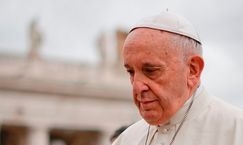
Francis has appealed for assistance in combating problems resulting from clericalism, which he blames for the 'culture of abuse' in the Chilean church
Limited extracts from Céline Hoyeau, Paris and Nicolas Senèze, Rome, subscription magazine La Croix International, 6 June 2018
Pope Francis addressed a letter last Thursday to Chilean Catholics, calling on them to join the reform process for a church which has been devastated by sexual abuse scandals. More broadly, Pope Francis is aiming to put an end to the clericalism he has identified as the main cause of the abuse culture. Will Chile’s example become a precedent? The Chilean church has a number of particularities. Fashioned during the 1980s and 1990s by Cardinal Angelo Sodano, who was nuncio in Chile before becoming secretary of state for Pope John Paul II, it emerged as a model for Vatican takeovers of Latin American churches during the late 20th century. Powerful movements developed there promoting an “elite” kind of church in opposition to what were perceived as “problematic” churches. The outcome was an extreme form of clericalism, which developed to the point that the Chilean bishops did not hesitate to conceal from the pope the abuses they were covering up. Nevertheless, “Chile is not an isolated case,” according to José Andrés Murillo, a victim of clerical abuse, who is now an organizer of the first meeting of ECA (Ending Clerical Abuse), the international network of associations of victims of abuse in the church, to be held in Geneva this week.....The Chilean situation has clearly illustrated the complexity of the obstacles that Francis is facing and which continue to damage the church reform process he has launched, of which decentralization remains the touchstone. However, the abuse issue has also revealed a certain incapacity by bishops to effectively implement this decentralization process. The implementation of Vatican II “opened the door to a very personal style of government by the bishop,” said Msgr. Valdrini. “By emphasizing the plenitude of the sacrament of orders as the source of the bishop’s power, the Council isolated him from his sacred character,” he said. “This is why Francis insists so much on synodality,” Msgr. Valdrini said, insisting on the need to reread Pope Francis’ address to the Synod marking the institution’s 50th anniversary in October 2015. “He particularly emphasized the importance of the advisers to the bishops in which ‘priests and lay people are called to collaborate with (him) for the good of the whole community’,” Msgr. Valdrini said. Finally, dealing with the abuse crisis could provide an opportunity for Francis to fully implement his reforms. Although Chile provided a laboratory for Vatican takeovers, the current field of ruins could become a laboratory for the kind of church desired by Francis, including greater involvement of lay people.....(SOURCE) Photo: La Croix Pope Francis La Croix Andrew Medichini-AP
The decision is full of good sense and aims to assist the German bishops to come to a common decision on Eucharistic sharing
Limited extracts from Nicolas Senèze, Rome, subscription magazine La Croix International, 6 June 2018
Pope Francis has sent the German Catholic bishops back to the drawing board to rework their document on access to the Eucharist for Lutheran spouses in mixed marriage couples.....(source)
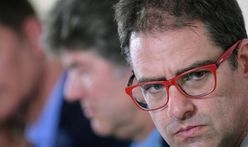
It is necessary for bishops to undergo regular training on the rights of children, the dynamics of abusers, says co-founder of Ending Clergy Abuse network
Limited extracts from Céline Hoyeau, subscription magazine La Croix International, 5 June 2018
In a few days, Chilean sex abuse victim, José Andrès Murillo, will hand over to Pope Francis a letter containing proposals for the battle against abuse in the church. Ending Clergy Abuse (ECA), the newly formed international network of groups fighting pedophilia in the church, is meeting for the first time in Geneva this week. In a few days, one of the network’s founders, José Andrès Murillo, who was himself a victim of a former priest in Chile, will hand a letter to Pope Francis outlining a series of proposals for fighting abuse in the Church. Céline Hoyeau for La Croix interviewed José Andrès Murillo. La Croix: What is the objective of the Geneva meeting? José Andrès Murillo: We will discuss ways of combating all forms of abuse, and particularly sexual abuse in a spiritual context. In addition, we will discuss the problems raised by sects in religious environments, beginning with the Catholic Church.....(source) Photo: La Croix International, José Andrès Murillo, Tiziana Fabi - AFP.
.jpg)
Appointment seen as a logical consequence of the implementation of Vatican II
Limited extract from Anne-Bénédicte Hoffner, France, La Croix International, 5 June 2018
In a first for the Bishops Conference of France, its Permanent Council has chosen a woman to replace outgoing deputy secretary general, Father Gérard Le Stang. Christine Naline, 60, the person chosen for the post, says she is pleased with her appointment but also sees it as a logical consequence of the...(source). Image: La Croix International, Bishops Conference of France (CEF photo)

8pm Wednesday 6 June 2018, The Pumphouse Hotel, 128 Nicholson Street, Fitzroy
Women are present throughout the Gospels. They were present at every key point of Jesus’ life, even at the tomb. Since the Royal Commission, there has been a greater recognition of the role that women must play in the Church, but they have always been on the front line, sometimes in conflict with priests and bishops. Can the model of service and leadership by these “troublesome” Catholic women offer a better vision of the Church? How can we write them back into our stories? Further details and Flyer on the Events Page.

Bishops in the headlights
Extract from Peter Johnstone, Pearls and Irritations, John Menadue Blog, 31 May 2018
Catholic bishops throughout the world should regard themselves as on notice following the dramatic offer of resignations by all the bishops of Chile. There are already calls (Paul Collins) for Australian bishops to emulate the Chilean bishops in light of the damning report of the Royal Commission into Institutional Responses to Child Sexual Abuse, not to mention the recent conviction of an Australian archbishop on concealment charges and the imminent trial of another on sex abuse allegations. In many ways, the Catholic hierarchy is becoming increasingly isolated from the faithful. Six months after the Royal Commission’s final report, we are still waiting for the Australian Catholic Bishops to seek the views of the faithful, let alone to respond to the Commission’s findings particularly their call for a national review of the governance of dioceses and parishes, including transparency, accountability, and participation of lay men and women. And the bishops’ Plenary Council in 2020/21 is looking more and more like a means of avoiding real immediate action on grave failings – see Chris Geraghty’s recent commentary – with a questionable local commitment from most bishops judging from diocesan websites. The bishops seem to be collectively “circling the wagons, locking the doors and huddling together”, the very response condemned by Archbishop Coleridge, the new President of the Australian Catholic Bishops Conference (ACBC) in his Pentecost message. Regrettably, many bishops appear to have little real regard for the views of the faithful…..(more)
“The culture of abuse and cover-up is incompatible with the logic of the Gospel,” the pope wrote.
Extract from Gerard O'Connell, America the Jesuit Review, 31 May 2018
In a letter to “the pilgrim people of God in Chile” released in Santiago on May 31, Pope Francis called on each of them to become actively involved in their church and society so as to eliminate once and for all “the culture of abuse, and the system of cover-up that allowed it to be perpetuated” and caused such suffering to so many people in their homeland. Francis made clear that he was referring to the triple abuses of power, sex, and conscience, and the cover-up that accompanied them.
“The culture of abuse and cover-up is incompatible with the logic of the Gospel” as are “all those means that go against the freedom and integrity of persons,” Francis stated in an autographed eight-page letter in which he again praised and publicly thanked the Chilean victims of abuse “for their courage and perseverance.” He also thanked those who “believed and assisted them” in their sufferings, some of whom he will meet this weekend. Pope Francis told Chilean Christians that “the ‘never again’ (‘nunca mas’) to the culture of abuse, as well as to the system of cover-up that permitted it to be perpetuated, demands [of us] to work among all [people] so as to generate a culture of care that permeates our ways of relating to each other, of praying, of thinking, of living authority, [as well as] our customs and language and our relation with power and money.”...(more)
Edited Extracts from Christopher White, National Corespondeemnt, Crux, 31 May 2018
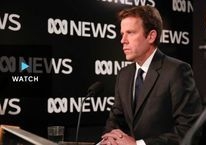
Extract from political reporter Jane Norman and staff, ABC News, 29 May 2018
Victims of institutional child sexual abuse are one step closer to receiving compensation, after the Catholic Church announced it would sign up to the national redress scheme. In a major step forward, the Church has confirmed it will enter the national scheme, despite its earlier misgivings, becoming the first non-government institution to opt in. The church's governing bodies, the Australian Catholic Bishops Conference (ACBC) and Catholic Religious Australia, wrote to the Government saying they were keen to participate "to limit future trauma for survivors of abuse in obtaining redress from the Church". "We support the royal commission's recommendation for a national redress scheme, administered by the Commonwealth, and we are keen to participate in it," ACBC president Archbishop Mark Coleridge said in the statement. "Survivors deserve justice and healing and many have bravely come forward to tell their stories." Archbishop Coleridge said given the diverse structure of the Church, it would establish a "simple and cost-effective" agency to respond to all of the compensation claims. "It's been a long time in the making, and that's one of the reasons we've been a little slower on this than we would've wished to be," he told the ABC's PM program. Archbishop of Sydney Anthony Fisher said the Church was "expecting to be paying out for survivors for many years to come". " ...and we stand ready to do that. We are going to back that [with] our insurance and our assets. We are determined to bring justice and full redress, healing if we can, to the victims of this terrible crime." The Royal Commission into Institutional Responses to Child Sexual Abuse heard evidence from 2,500 people who had been abused in Catholic-run institutions. This was 62 per cent of all survivors who reported abuse in a religious institution.....(more) Photo ABC News
The Archdiocese of Albi offers an opportunity to reflect on new ways of evangelization
Extract from Gauthier Vaillant, subscription journal La Croix International, 28 May, 2018
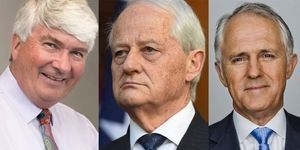
Australian bishops call for religious freedom laws to be updated after government receives report
Extract from Mark Bowling, The Catholic Leader, 28 May 2018
The Federal Government has received a report into religious freedom
in
Australia, but it could be weeks before the findings are made public.
Prime Minister Malcolm Turnbull ordered the review following concerns that last year’s legalisation allowing same-sex marriage could undermine freedom of religion. Former attorney general Philip Ruddock has led a panel of experts, including Catholic lawyer Jesuit Father Frank Brennan, examining the issue. The panel heard from Christian groups that argued religious schools should be able to teach children the value of traditional marriage without being reported to authorities over discrimination. As well, there should be no legal detriment to anyone, in a workplace or elsewhere, expressing the view that marriage is between a man and a woman. The Australian Catholic Bishops Conference called for laws to be updated to recognise religious freedom. “Freedom of religion is a fundamental human right,” the ACBC said in its submission. “Australia’s laws need to be updated to ensure we continue to enjoy freedom of thought, conscience and religion and the associated freedom of association.” The bishops said Catholic schools should be allowed to refuse employing staff whose personal behaviour or actions were “contrary to the values of the school”. “The freedom of Catholic schools to employ staff who embrace Christianity is essential for providing effective religious education and faith formation to their students,” they said. However, Church critics argued religious schools should be forced to hire LGBTI teachers. A submission by the Equality Campaign called for the repeal of church rights, including the right to hire and fire on the basis of gender and sexuality in line with religious teaching. “The law already goes too far in allowing religious organisations to discriminate through broad exemptions in federal and state discrimination laws,” law lecturer and Queensland director of Australian Marriage Equality Peter Black said in a submission made on behalf of The Equality Campaign lobbying for the repeal of church rights. The bishops’ submission addressed many practical issues of concern to religious believers – including whether churches can legally refuse to hire their halls for wedding receptions that go against their beliefs, and laws that force doctors who disagree with abortion to refer patients to another medical practitioner. It pointed out that ….(more) Photo: The Catholic Leader
The stakes are high and we should hope and pray that the pope gets this right
Extract from Robert Mickens, Vatican City, subscription journal La Croix International, 25 May 2018
The deeply disturbing scandal of clergy sex abuse in Chile and its cover-up by Church leaders in the country continues to go from bad to worse. After a Vatican-led investigation in February, which prompted Pope Francis to call an emergency summit in Rome of the entire Chilean hierarchy, there has been a seemingly non-stop flow of newly revealed cases of sexual crimes against young people. First, there was a news report of an organized pedophilia (or at least ephebophilia) ring in a diocese north of the capital Santiago where priests have been involved in exchanging pornographic images of minors and information on how to sexually engage with these adolescents. Now, there are those in the South American country who claim that this abuse cartel is not limited to one diocese, but involves several other dioceses. Then this past Thursday the Archdiocese of Santiago publicly admitted that its chancellor, Fr. Óscar Muñoz Toledo, turned himself in to church authorities last January for sexually abusing youths. What makes this case even more dramatic is the fact that the 56-year-old priest was in charge of handling clergy sex abuse complaints in Santiago – including those against the serial predator Fernando Karadima, who has been the central figure in Chile’s abuse crisis.....(source).
Edited Extract from CathNews, The Australian, 24 May 2018
Adelaide Archbishop Philip Wilson will stand aside tomorrow after he was convicted of concealing child sexual abuse in a New South Wales court on Tuesday. Archbishop Wilson yesterday released a statement saying he had considered his position after magistrate Robert Stone found Archbishop Wilson failed to report to police the repeated abuse of two altar boys by paedophile priest James Fletcher in the NSW Hunter region in the 1970s. “It is appropriate that, in the light of some of his Honour’s findings, I stand aside from my duties as Archbishop,” he said. “I am now putting in place the necessary administrative arrangements to ensure that the affairs of the Archdiocese are managed responsibly. “I therefore intend to step aside as of Friday this week once those arrangements are in place. “If at any point in time it becomes necessary or appropriate for me to take more formal steps, including by resigning as Archbishop, then I will do so. “In the meantime, while the remainder of the legal process runs its course, I want to assure the Catholic faithful in the Archdiocese of my continued prayers and best wishes and assure everyone that the affairs of the Archdiocese will be appropriately managed in my absence.” Mr Stone accepted witness Peter Creigh and another altar boy told Archbishop Wilson in 1976 that Fletcher had repeatedly abused them but the clergyman did nothing. Fletcher was found guilty in December 2004 of nine counts of child sexual abuse. He died in jail of a stroke in January 2006. In a statement, Australian Catholic Bishops Conference president Archbishop Mark Coleridge said: “We, his brother bishops, believe Archbishop Wilson’s decision, though difficult, was appropriate under the circumstances. “Our prayers are with all those who have felt the impact of this long legal process, including the survivors who shared their stories, as well as with the Archdiocese of Adelaide and with Archbishop Wilson himself.” Sentencing is due to start on June 19....(more)
Australia's bishops strongly criticised for missing victims in Wilson conviction response
Extracts from Joanne McCarthy, Newcastle Herald, 24 May 2018
ADELAIDE Archbishop
Philip Wilson is a convicted criminal in denial who should resign
immediately, say critics who have slammed his comments after Tuesday’s
landmark guilty finding and his decision to stand down “in the light of
some of his Honour’s findings”. The
former Maitland-Newcastle priest and the Australian Catholic Bishops
Conference came under sustained criticism after initial statements that
failed to acknowledge the gravity of Wilson being found guilty of
failing to act against child sex offender priest Jim Fletcher. They also
failed to mention the Hunter victims of Fletcher’s crimes. NSW Parliament
will be asked to support a motion criticising the bishops for a
statement on Tuesday that highlighted Wilson “maintained his innocence
throughout this long legal process”. But it contained no apology or
regret that Wilson and the Catholic Church “failed the boys who relied
on them for help”.......Former Catholic priest, academic and leading
Catholic reformer Peter Wilkinson, who co-authored a groundbreaking
study on the global child sexual abuse tragedy, agreed with senior
Catholic Father Frank Brennan that Wilson should stand down until any
appeal process is completed and resign if magistrate Stone’s decision is
upheld. Wilson had “no alternative but to take this course of
action”, Mr Wilkinson said. “Not to
stand aside, pending an appeal, would send some totally unacceptable
messages to the broad Australian community - that a conviction in a
court of law is not all that serious; that his ‘personal disappointment’
at the Magistrate’s finding could somehow lessen his culpability; and
that it is okay to continue in his official church role, as if nothing
significant has happened,” Mr Wilkinson said.....(more)
Limited extract from Christopher Lamb, subscription journal, The Tablet, 23 May 2018
Naming cardinals is the closest thing a Pope has to succession planning. Last Sunday, on the Feast of Pentecost, the birthday of the Church, Francis announced 14 new cardinals. They will receive their red hats at a ceremony in the Vatican on 29 June. He has now appointed 59 of the 125 cardinals – or 47 per cent of them – who are less than 80 years old, and so entitled to vote for his successor in a future conclave. Pentecost was an appropriate day for Francis' announcement, throughout his five-year papacy, when selecting "Princes of the Church" - not a.....(source)

Extract from John Allen Jr, Crux, 22 May 2018
Speaking to the powerful Italian bishops’ conference Monday, Pope Francis tagged three “preoccupations” in the only country in the world where he rules as Primate: a “hemorrhage” of vocations, “evangelical poverty and transparency,” and the need for a “consolidation” of Italy’s sprawling number of dioceses. Francis told the bishops he wasn’t sharing these concerns to “beat you up,” but rather as points for further “dialogue and reflection.” He also said he wanted to hear their questions, even their criticisms, because “it’s not bad to criticize the pope, it’s useful.” On vocations, the pontiff didn’t mince words. “How many churches and convents have been closed in recent years for a lack of vocations, only God knows,” he said. Francis blamed the crisis in vocations on many factors, including “a culture of the provisional,” a “culture of relativism,” the “dictatorship of money”, a “demographic inversion” in which families are having fewer children, the impact of Church scandals, and the “tepid witness” given by some priests and bishops. In any event, the pontiff said frankly, “we’re not succeeding” at generating a sufficient number of new vocations. In response, Francis suggested one “practical” step, which is a “more generous sharing” among Italian dioceses. “What we need is a fidei donum [system] from one diocese to the other,” he said.....(more) Photo: Crux, AP photo/Gregorio Borgia
Extracts from John Warhurst, Eureka Street, 21 May 2018
Accountability, that is individuals being held accountable for those matters for which they are either formally or practically responsible, is a vital link between leaders and their communities, whether they are members, supporters, shareholders or voters. Press briefing with Chilean bishops in Rome, May 14, 2018. Credit: Daniel Ibanez/CNAIt can be achieved in various ways. For instance, both individual and collective ministerial responsibility are built into our Westminster system of government, which links the government and the public service to the parliament and ultimately to the people through a chain of accountability. But in other areas of life the links are less clear. In practice accountability can be a crude and sometimes harsh instrument when used in daily life. I often have sympathy for those who pay the price of collective failure even though they may not be personally responsible. We see it in practice each time a football coach is sacked for a team's poor results even though there might actually be nothing wrong with the coaching; it might be the players who are at fault. But sacking the coach is a necessary intervention for confidence to be restored among members and supporters and to show that at least someone has taken responsibility for the group's failure. Governments are so defensive that they will do almost anything to prevent the Opposition claiming a scalp. To do so would be an admission of failure in government policy or administration. A minister may be quietly dropped much later, but not with any admission of failure because that would implicate the leader or the government as a whole. Within the church the same applies. The recent offer of resignation made as a group to Pope Francis by the entire Chilean hierarchy is a breath of fresh air. The sexual abuse crisis in the Chilean church, which has also engulfed the Pope himself, needed such a dramatic action as a sign of accountability to restore some credibility with the Chilean Catholic community and the wider public. As in politics, whether the resignations are accepted may even be less important than the gesture of responsibility which has been made. Accountability in action is best when it is proactive. It loses its impact when it is resisted and comes as a last resort. Institutions of all sorts must be seen to be on the front foot in this regard. In Australia what the church has lacked is an obvious sign of accountability by leaders, whether of religious orders or dioceses, for the crimes covered up by institutional responses to child sexual abuse. General apologies don't go far enough. Compensation is necessary, but also not enough. The reputation of the church would now be higher if there were more obvious signals of accountability by those in charge. This would not imply personal but official responsibility.....(more)

Priestly Formation: Extract of Letter from US Association of Priests to US Bishops Conference Committee on Clergy, Consecrated Life and Vocations, 25 January 2018, Linked here 21 may 2018
Dear Cardinal Tobin and Committee Members: Since the December 8, 2016 Congregation for the Clergy’s release of The Gift of the Priestly Vocation (Ratio Fundamentalis Institutionis Sacerdotalis—3rd Edition), with its mandate that each conference of bishops update its Program of Priestly Formation, we of the Association of U.S. Catholic Priests (AUSCP) have felt called and duty-bound to contribute to this important process. Our 2017 Assembly in Atlanta made addressing it one of our three top priorities for 2017-2018. A Working Group was established and has worked diligently since August 2017 to prepare observations, concerns, and proposals regarding five crucial components of priestly formation. Our study and reflection persuade us that a new Program of Priestly Formation needs more than minimal editing of the current Program of Priestly Formation (5th Edition). It needs in-depth revision. Our comments are made in response to the significant challenges facing the Church in the United States. These include the departure of millions of Catholics from active participation and membership in the Church, the decline in the number of active priests and of candidates for the priesthood, fewer converts, fewer Church weddings, fewer baptisms, fewer parishes, growing identification of Americans as ‘spiritual’ rather than ‘religious’, and many more issues. The seminary model currently in place needs major modifications in the light of these issues. In the attached document we address five major areas, express our concerns, and offer specific recommendations under each. Our thoughts are grounded in the teachings of Vatican II, the talks and writings of Pope Francis regarding priesthood and formation, and in what we have learned based on our own experience as candidates for the priesthood, as seminary faculty, and on our pastoral experience as parish priests......(more)
Extract from CathNews, ABC Media Blog, 18 May 2018
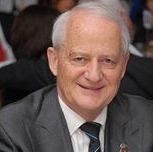
Extract from CathNews, The Courier Mail, 18 May 2018
Federal anti-discrimination laws would be strengthened to better protect religious beliefs under recommendations handed to the Turnbull Government. But the highly anticipated religious freedom review, headed by former Howard government minister Philip Ruddock, recommended no changes to the Marriage Act, which will be a blow for some religious leaders and conservative MPs still bristling after same-sex marriage became law. The review, ordered by Malcolm Turnbull after the historic parliamentary vote, is due to be handed to the government by today, but not expected to be released by the Prime Minister for a couple of weeks. It is understood the report recommends clearing-up oversights and anomalies by strengthening federal anti-discrimination laws that presently do not protect the right to religious freedom. It means religion would have the same protection federally as sexual orientation, race, age and disability. Under the change, the first step for aggrieved parties would be conciliation via the Australian Human Rights Commission, and if that failed, a federal court. It is expected some conservative MPs and religious leaders may criticise the report for not going far enough, and that many of those who support same-sex marriage will be comfortable with the findings.......(more) Photo:Cathnews, Twitter philipruddockmp
Extract from Crispian Balmer, The Canbera Times, 18 May 2018
Vatican City: In an unprecedented move, 34 Chilean bishops said on Friday they had offered to resign en masse after attending a crisis meeting this week with Pope Francis about the cover-up of sexual abuse in their country. It was not immediately clear if the Pope would accept all or any of the resignations from the prelates, who hold all the top jobs in Chile's Roman Catholic Church. "We have put our positions in the hands of the Holy Father and will leave it to him to decide freely for each of us," the bishops said in a joint statement read out by a spokesman for the churchmen, Bishop Fernando Ramos. He said the bishops would stay in their roles until the Pope had made his decision. The scandal has devastated the credibility of the Church in the once staunchly Catholic country. It has also hurt the Pope's own image because this year he strongly defended a bishop accused in the alleged cover-up before reversing his position. The Vatican declined to comment on the timing of any decision or on the resignations themselves. A Church official said it was the first time the bishops of an entire country had offered to leave their posts in such a manner. In their statement, the bishops thanked the Pope for his "brotherly correction". "Above all, we want to ask forgiveness for the pain caused to the victims, to the Pope, to the people of God and our country for the serious errors and omissions committed by us," the contrite statement said.....(more)
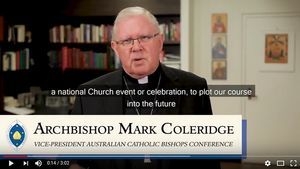
The last time the Catholic Church in Australia held a Plenary Council was in 1937. It has been more than 80 years since we gathered all of the Church together and much has changed. In 2020, we will have a Plenary Council about the future of the Catholic Church in Australia. What are we called to do? Who are we called to be? How do we need to change? Pope Francis has spoken of the need to engage in the world and respond in faith. He said: “The defining aspect of this change of epoch is that things are no longer in their place. Our previous ways of explaining the world and relationships, good and bad, no longer appears to work. The way in which we locate ourselves in history has changed. Things we thought would never happen, or that we never thought we would see, we are experiencing now, and we dare not even imagine the future. That which appeared normal to us – family, the Church, society and the world – will probably no longer seem that way. We cannot simply wait for what we are experiencing to pass, under the illusion that things will return to being how they were before.” The journey toward Plenary Council will help us to prepare to listen to God by listening to one another. We invite all people to engage, to be a part of the listening and dialogue encounter in the next two years....(source)
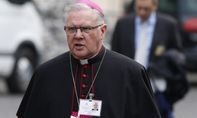
Extracts from Christopher White, National Correspondent, Crux, 14 May 2018
In recent months, the Australian Catholic Church has been in the spotlight, primarily due to news that the former Archbishop of Sydney and the pope’s current finance minister, Cardinal George Pell, will stand trial for “historical sexual offenses” amid continuing fallout from the Church’s clerical abuse crisis. As the Church attempts to change the narrative about its role in public life, Archbishop Mark Coleridge of Brisbane has been elected as the new head of the Australian Catholic Bishops’ Conference. Serving as his vice-president will be Archbishop Anthony Fisher of Sydney......"The journey began long before the Royal Commission, as the Church here began to grapple seriously with sexual abuse in the 1990s, and it will continue long after the Plenary Council as we implement its decisions. But the move from Commission to Council frames my understanding of what I’m called to do. That means first responding to the recommendations of the Royal Commission in a way that ensures justice for survivors and a safer Church for all. It will also mean addressing seriously the questions of culture and governance that the Royal Commission has posed, and that will mean continuing the dialogue we’ve already begun with the Holy See. Allied to that, we’ll have to prepare well for the Plenary Council, which may have been the bishops’ decision but is the work of the Holy Spirit.
That will mean listening to as many voices as possible - above all to the Spirit but also to the many voices in the Church and elsewhere. Our listening is framed by questions drawn from Evangelii Gaudium: What might it mean for us now to be a humble Church, a poor Church, a prayerful Church, an inclusive Church, a missionary Church, a joyful Church? These lead to the key question we’ve adopted in the consultation process, which is about to begin nation-wide: What do you think God is asking of us in Australia at this time? The major challenge we face is to answer that question powerfully enough to prepare a new future for the Church in this country"....(more) Photo: Abp Mark Coleridge, Crux, CNS
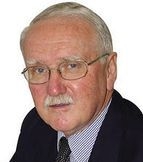
Extract from Fr Noel Connolly, The Far East, 9 May, linked here 14 May 2018
Speaking to The Tablet [14th October 2017] Archbishop Mark Coleridge claimed that the Church in Australia “is facing the biggest crisis in its history”. This is partly occasioned by the Australian Government’s Royal Commission into Institutional Responses into Child Sexual Abuse. One part of the Australian Bishops’ response has been to call a Plenary Council of all the Dioceses in Australia in 2020. But as Archbishop Coleridge said the Plenary Council is meant not only to review the findings of the Royal Commission but also “to undertake a broad review of the Church’s mission, including how to give more responsibility to lay people. One major criticism of the Australian Church has been of the institutionalised clericalism within its ranks. Another topic to be discussed at the plenary council is how to involve women in the running of the Church”. The Royal Commission was a deeply humbling experience for the church because a large percentage of the allegations investigated by the Commission involved Catholic Institutions. Institutions supposedly run by disciples of Jesus who said, “Suffer the little children to come unto me.” (Matt 19:14). In their Final Report the Commissioners made 21 recommendations explicitly about the Catholic Church. Predictably, the media has focussed on the recommendations about voluntary celibacy and the seal of confession, but as Francis Sullivan, Chief Executive Officer of the Church’s Truth, Justice and Healing Council, said in the National Catholic Reporter, “recommendations that deal with broader concerns around church governance and the mutual participation of women. If these recommendations are fully implemented, the ramifications will be far more significant than the suggestions around celibacy and the confessional.”...(more)
Extract from , ACBC Communications Office, Thursday 10 May 2018
Earlier this month, Archbishop Mark Coleridge was elected president of the Australian Catholic Bishops Conference. Currently the Archbishop of Brisbane, he previously served as an Auxiliary Bishop in Melbourne and as Archbishop of Canberra-Goulburn. In this conversation with the ACBC Communications Office, he speaks about his appointment at a critical time for the Catholic Church in Australia. What strengths do you think your brother bishops saw in you that gave them the confidence to choose you to lead them at this critical time? I guess a certain range of experience was a factor. As a bishop, I’ve been a rolling stone for quite a long time; I’ve seen the Church in Australia from south to north, from city to country. Other factors may have been an ability to put words together in the public forum and a certain vision of the way forward for the Church here, focusing on the Plenary Council. But, in the end, these things are a bit mysterious. As you are entrusted with the role of leading the Australian Catholic Bishops Conference, what great challenges do you see? The great challenge is to do what I can to help the whole Church move from the Royal Commission to the Plenary Council and all that lies beyond it. This will mean helping the Church find a distinctively Gospel voice in the great social debates – not fighting ideology with ideology, but engaging issues with the power of the Gospel. That will mean working to make sure Jesus is at the heart of everything. In the end, He’s all we’ve got. And He’s the only one who’ll enable us to meet all the challenges....(more)
Extract from Catholic Professional Standards Ltd, Melbourne Catholic, Thursday 10 May 2018
The Hon Geoff Giudice, Chair of the Catholic Church’s new safeguarding body, Catholic Professional Standards Ltd (CPSL), has told a meeting of Australian Bishops that one of the key challenges for the Church and for CPSL over the next few years will be to maintain the momentum created by the Royal Commission. Speaking at the Australian Catholic Bishops Conference Plenary Council in Sydney yesterday, 10 May 2018, Mr Giudice said that no matter how much better informed the community and the Church is as a result of the Royal Commission, the danger has not passed. ‘Evil will always exist. A sustained effort is needed to create and maintain a culture of safety and care. That realization is central to CPSL's operations. ‘Two things in particular flow from this realisation....To comment on the CPSL draft National Catholic Safeguarding Standards go to CPSL website....(more)
Extract from Inés San Martín, Vatican Correspondent, Crux, 10 May 2018
ROME - Of late, voices from Pope Francis on down have called for women to have a bigger voice within the Catholic Church. Yet judging by the Vatican itself, the real issue today may not be only women but also laymen, both of whom lack the one traditional prerequisite for wielding real power - a Roman collar. Though three-quarters of the Vatican’s work force are laypeople, very few, male or female, have any real power. A growing, and understandable, focus on women. The perceived “issue of women” in the Vatican has become so prominent that, according to Canadian Cardinal Marc Ouellet, prefect of the Congregation for Bishops and President of the Pontifical Commission for Latin America, it “cannot be postponed. It’s among the urgencies of the Church.” Last March, the Commission for Latin America held a plenary assembly on the issue of women, and, in an exceptional move, invited some 15 women to participate. Conclusions included a call for a Synod of Bishops on women, and according to an interview Ouellet gave to L’Osservatore Romano’s monthly magazine “Women, Church, World,” such a gathering would include women, even if it means “changing the way synods are made.” ....(more)
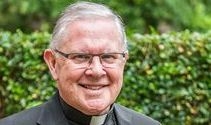
Extract from Australian Catholics Bishops Conference Media Release May 4, 2018. Published here 9 May
The Australian Catholic Bishops Conference has today elected Archbishop Mark Coleridge of Brisbane as president of the Conference. Archbishop Coleridge was ordained Auxiliary Bishop of Melbourne in 2002 and later became Archbishop of Canberra - Goulburn. Since 2012, he has served as Archbishop of Brisbane. “ With few illusions about myself or the task that awaits, I humbly accept the call to serve as president of the Conference at a time that is clearly challenging,” Archbishop Coleridge said. “ Among other issues , we bishops will together have to address the recommendations of the Royal Commission and prepare for the upcoming Plenary Council 2020 . I trust I will be able to provide the unifying leadership this will require. “ Pope Francis is showing the way for bishops conferences around the world , and I look to his leadership to guide and inspire mine in Australia. ” Archbishop Coleridge, who will take up the new position from May 10, paid tribute to Archbishop Denis Hart, who will next week complete six years serving as president of the Conference. “ With his courtesy and efficiency, Archbishop Hart has made a unique contribution as president of the Conference since 2012, ” Archbishop Coleridge said. Archbishop of Sydney Anthony Fisher OP was today elected vice - president of the Bishops Conference. Both Archbishop Coleridge and Archbishop Fisher will serve two - year terms....(more)
Francis has continued to grant more power to bishops' conferences and even to seek proposals from them
Extract from Anne-Bénédicte Hoffner from Subscription journal La Croix International, with an additional comment from the editor, Catholics For Renewal website, 8 May 2018
Vatican City. A six-person delegation of German bishops traveled to Rome May 3 to meet top level officials of the Roman Curia, including members of the Congregation for the Doctrine of the Faith, the Council for the Promotion of Christian Unity and the Pontifical Council for Legislative Texts. The aim of the meetings was to broach “the issue of eventual access to the Eucharist for non-Catholic spouses in mixed marriages.”....Source [Ed.The paper goes on to comment tyhat Pope Francis continues to increase power of bishops congerences and seek proposals freom them, for example on the ordination of married men.]
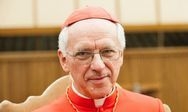
Limited extract from Claire Lesegretain, subscription journal La Croix International with an additional comment from the editor, Catholics For Renewal website, 7 May 2018
Cardinal Jozef De Kesel of Malines-Brussels last week met with a small delegation from a local gay working group which had requested an audience.....(Source) (Photo: La Croix International, M.Migliorato/CPP/CIRIC/Catholic Press Photo). [Ed.The paper goes on to comment that whilst offering symbolic recognition in some situations this would not be considered to be religious marriage or ecclesiastical blessing]
Edited Extracts from Media and Communications Office, Melbourne Catholic. CAM, 3 May 2018
The Australian Catholic Bishops Conference and Catholic Religious Australia have established a new advisory group that will play a crucial role in influencing and monitoring the Catholic Church’s ongoing response to the child sexual abuse scandal. Archbishop Denis Hart, president of the Australian Catholic Bishops Conference, explained that the new Implementation Advisory Group will monitor the response to the findings and recommendations of the Royal Commission into Institutional Response to Child Sexual Abuse and the recommendations of the Truth, Justice and Healing Council, which led the Church’s engagement with the Royal Commission. Sr Ruth Durick OSU, president of Catholic Religious Australia, said ‘there is a huge body of work completed by survivors, the Royal Commissioners and the Truth, Justice and Healing Council. ‘The task of the Implementation Advisory Group is to be propositional as to the necessary reforms that Catholic institutions and communities will have to implement to be places of safety and transparency and places where we authentically live out our commitment to the values and vision of the Gospels.’ Sr Ruth and Archbishop Hart said three key groups will take forward the work arising from the Royal Commission and the work led ‘prophetically and generously’ by Francis Sullivan and the Truth Justice and Healing Council.....The program of work the Implementation Advisory Group has identified includes: Relationship with and spiritual support of survivors; Governance and Church culture; Child-focused standards; National Redress Scheme; Seal of confessional and mandatory reporting; Handling of abuse complaints....(more)

Extract from CathNews, The Guardian, 3 May 2018
Religious leaders, including senior Catholics, have told a parliamentary inquiry into religious freedom that the legalisation of same-sex marriage had laid bare the fragility of protections. Numerous witnesses from faith-based organisations yesterday addressed the Joint Standing Committee on Foreign Affairs, Defence and Trade inquiry, which was instigated by Foreign Minister Julie Bishop in November 2016. According the inquiry’s website, Ms Bishop asked the committee to inquire into and report on “The status of the human right to freedom of religion or belief”. Broken Bay Bishop Peter Comensoli told the inquiry yesterday that religious people need to be able to lawfully express their views in “all dimensions of their life”. He said there could be no freedom of religion without the freedom to exercise their beliefs “individually, or in community; privately or publicly”. Michael Casey, who is the director of the PM Glynn Institute, a public policy institute within Australian Catholic University, warned that forcing people to accept others’ views of marriage would lead to “more conflict and acrimony in public debate”.....(more). Photo CathNews, Bigstock Cross, Religioius Freedom, CathNews, Bigstock
Extract from CathNews, The Age, 3 May 2018
Cardinal George Pell is likely to face two trials and two juries, with a date for his first trial yet to be set. Source: The Age.
Less than 24 hours after being committed to stand trial on half of the historic sexual assault charges he faced, Cardinal Pell returned to court yesterday, but this time to appear before a County Court judge instead of a magistrate. Cardinal Pell has pleaded not guilty to multiple charges involving multiple complainants. Details of the charges are yet to be revealed. During a 12-minute directions hearing before judge Sue Pullen, prosecutor Mark Gibson SC, and defence counsel Robert Richter QC, agreed that the allegations against the cardinal should be split and heard in two trials. Allegations that Cardinal Pell sexually assaulted multiple accusers in a Ballarat swimming pool in the 1970s are set to be heard in one trial, the court heard, and allegations he sexually assaulted an accuser in St Patrick’s Cathedral in the 1990s are set to be heard in the other. “They are of a completely different nature,’’ Mr Richter said of the respective allegations, “and separated by 20 years." Judge Pullen said a trial date would likely be set at the next directions hearing on May 16, when it is expected prosecutors and the cardinal’s defence team will formally apply for separate trials....(more)
Extract from The Tablet, 3 May 2018
Pope Francis has asked the German bishops to aim for a “unanimous” agreement over their proposals to loosen restrictions on giving communion to Protestants married to Catholics. According to a Vatican statement issued following a summit between senior figures in the episcopal conference and officials in the Roman Curia, the Pope “appreciates the ecumenical commitment” of the bishops but wants them to iron out internal disagreements and come to a “possibly unanimous” decision. Three-quarters of the German hierarchy voted in favour of a pastoral handout, "To Walk with Christ, In the Footsteps of Unity: Mixed Marriages and Common Participation in the Eucharist”, which would give greater access to communion for Protestant spouses of Catholics. But seven bishops, including Cardinal Rainer Woelki, disagreed and asked for the Pope to intervene. As a result a delegation of German bishops including Cardinal Reinhard Marx, president of the German Bishops’ Conference, and Cardinal Woelki met on 3 May with Archbishop Luis Ladaria, the prefect of the Congregation for the Doctrine of the Faith, and Cardinal Kurt Koch, president of the Pontifical Council for Promoting Christian Unity. Officials from both sides joined the meeting. The discussions, according to the statement released afterwards, focussed on “the relationship of between faith and pastoral care, its relevance for the universal Church and its juridical dimension,” while Archbishop Ladaria is to brief Francis on the deliberations. The German bishops’ move seeks to build on Church teaching, which already allows for the sacraments to be given to Christians from other denominations in certain circumstances. It is a source of joy to note that Catholic ministers are able, in certain particular cases, to administer the Sacraments of the Eucharist, Penance and Anointing of the Sick to Christians who are not in full communion with the Catholic Church but who greatly desire to receive these sacraments, freely request them and manifest the faith which the Catholic Church professes with regard to these sacraments,” Pope St John Paul II wrote in his 1995 encyclical “Ut Unum Sint”. This Pope, who has made numerous ecumenical gestures such as travelling to Sweden to mark the 500th anniversary of the reformation, is on record telling the Lutheran spouse of a Catholic to undertake her own discernment over whether or not to receive communion when they attended Mass together....(more)

The time has come to no longer put off a well-justified decision — even if some people still insist on contradicting it, says Bishop Gerhard Feige
Limited Extract from Christa Pongratz-Lippitt, subscription journal La Croix International, 2 may 2018
The head of ecumenical affairs for the German episcopal conference has urged his fellow bishops not to equivocate in their commitment to allow Protestant spouses in mixed marriages to receive the Eucharist at Catholic Masses. Enough is enough! The time has come to no longer put off a well-justified decision – even if some people still insist on contradicting it,” said Bishop Gerhard Feige of Magdeburg. “Missing a chance like this would be both shameful and macabre!” he told the German weekly Die Zeit just days before he and several other German bishops were to head to Rome for a May 3 meeting with Vatican officials over the “Eucharistic hospitality” issue. At their episcopal conference meeting last February more than two-thirds of Germany’s bishops approved a draft handout that would, in individual cases, allow Protestant spouses in mixed marriages to receive the Catholic Eucharist.....(source). Photo: La Croix Internationl. Eucharistic hospitality La Croix International

Extract from Gerard O'Connell, America, The Jesuit Review, 2 May 2018
“I was part of the problem! I caused this. I am very sorry, and I ask your forgiveness,” Pope Francis told the Chilean victims of sexual abuse and cover up when he met them in two-hour personal encounters, and then as a group, in the Vatican over the past days. “It is not up to us to carry out the necessary transformation in the church to stop the epidemic of sexual abuse and cover up. We hope that Pope Francis transforms his loving words of forgiveness into exemplary actions. Otherwise all this will be in vain.” That is what the three best known Chilean victims of abuse—Juan Carlos Cruz, James Hamilton and Andrés Murillo—told a crowded press conference in Rome after having spent a week as the pope’s guests at Santa Marta, the Vatican guesthouse where he lives, and sharing with him their history and their proposals. “For almost ten years we have been treated as enemies because we fight against sexual abuse and cover up in the Church. These days we met the friendly face of the Church, completely different from the one we have seen before,” they said in a statement given to the press. All three were victims of Chile’s most notorious predator priest, Father Fernando Karadima, whom the Vatican condemned at the age of 80 to a life of prayer and penance. All three blame Bishop Juan Barros of Osorno for being present when they were abused and covering this up, though he denies it. In fact, they blame those who covered up even more than their abuser. Mr. Cruz said that while it “hurt” them that Pope Francis defended Bishop Barros and accused them of calumny during his visit to Chile, they now recognize that he was badly informed and on his return to Rome he understood the disaster in the country and so sent Archbishop Charles Scicluna and Father Jordi Bertomeu to listen to the victims and other witnesses. They said that when his envoys reported back to him his eyes were opened and he understood the reality of their situation, and so invited them to ask forgiveness, to listen to them and to hear their proposals to avoid a repetition of such abuse. He also summoned the bishops who will come to meet him May 14-17. They expect him to take action after that meeting.....(more) Photo: America, The Jesuit Review, (CNS photo/Paul Haring).
Extract from Andrew Hamilton, Eureka Street, 1 May 2018
Even after three weeks, the Royal Commission into Misconduct in the Banking, Superannuation and Financial Services Industry has come to resemble the earlier Royal Commission into Institutional Responses to Child Sexual Abuse. We have seen the same initial resistance to a public enquiry, the same insistence that revelations of sexual or financial abuse reflected a few bad apples and not a bad culture, the same endorsement when the royal commission was called, and the same shaming as the public questioning of hapless senior officials followed damning evidence of abuse and of the failure to address it. We have also seen evidence of the same incompetent management, whose very incompetence perpetuated abuse, diffused responsibility for it, and deepened the harm done by it. There was the same failure to maintain adequate systems of reporting; the same quiet moving on or transferring officers guilty of financial or sexual abuse; the same unwillingness to find out about the extent of abuse and the same slowness to offer redress. We have seen evidence, too, of the same reluctance of senior management to know about the abuse; the same priority given to preserving the reputation of financial or church institutions; the same muted complaints of unfairness and of ignoring the contribution to society of the respective institutions; the same assistance in cover-up by regulating officers, whether in government departments, police or ASIC, effectively leaving the institutions a free hand to ignore the abuse. We have seen the same reluctance to admit to a culture in which abuse, sexual or financial, flourishes; the same public scepticism whether the institutions will ever reform themselves; and perhaps the same lull in conversation and the same inquisitorial gaze when one admits to being either a Catholic priest or a senior bank executive. No doubt these claimed similarities could be expanded on or questioned in detail. But to observers who share a personal and public-spirited interest in the decent functioning and trustworthiness both of financial institutions and of churches, they surely raise larger questions beyond structures of governance, remuneration, legal penalties and compensation. They invite reflection on why two apparently different forms of institution should behave in such similar ways.....(more)
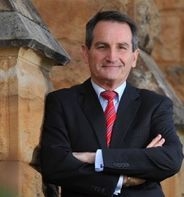
Extracts from final statement by Francis Sullivan, Former CEO Truth, Justice and Healing Council, 30 April 2018
This will be my last blog as CEO of the Truth, Justice and Healing Council. The Council closes down on Monday 30 April. Our job is done......What is clearer to me these days is that the leadership of the Church has never been more aware of the crisis the Church faces and never more aware of what needs to be done to rebuild faith and trust that is at an all-time low. So many leaders tell me that they want to reconcile with survivors and restore their trust in the Church. The test of that resolve will be in how the impetus of the Royal Commission brings change within our Church. The Royal Commission gave a potent voice to survivors. In doing so it placed a mirror in front of our Church. This needs to be grasped as ‘a creative disruptor’ to renew, reinvigorate and regenerate the essence of being Church. Before all else survivors and their families need to get a better deal out of the Church. They need real recognition and decent treatment. Rather than struggling for a fair go they should feel overwhelmed by a generous and lasting response. None of us gets things right all the time. Yet most of us can sense when sincerity and generosity of heart are at play. It is this well of human compassion that becomes the redemptive, restorative and ultimately the healing place for those who seek it. When we look back will we see changes to governance within church structures and processes, a truly national redress scheme, markedly different approaches by Church authorities to civil litigation claims, an increased role for women and the laity more generally in the Church, the support for Catholic Professional Standards Ltd. and its public accountability of leaders, a reformed seminary system and the proper professional supervision of clergy and lay personnel? My sense is that we will. This scandal has rocked the foundations of my Church so profoundly that the instinctive spirit to seek goodness, truth and beauty that binds us as a faith community will ultimately prevail.....(more)

The Church’s new safeguarding body will today release draft standards that will support the Church's work in providing safe places for children and vulnerable adults. Source: CPSL. Extract from CathNews, 27 April 2018
The draft National Catholic Safeguarding Standards can be found on the new Catholic Professional Standards Ltd (CPSL) website which will also be launched this afternoon at www.cpsltd.org.au. CPSL chief Sheree Limbrick said the release of the draft safeguards is an important development in strengthening child and vulnerable adult protections in the Church in Australia. “It is also a significant step in implementing one of the royal commission’s key recommendations,” Ms Limbrick said. “This is the first time, anywhere in Australia and among just a handful of countries around the world, where the Catholic Church will be accountable for their adherence to consistent and measurable national standards for the protection of children and vulnerable adults. “This is a major development for CPSL and an important plank in our work to do all we can to ensure children are safe in Catholic parishes, churches, ministries, outreach, schools, hospitals and other places. “These standards incorporate statutory requirements that Church organisations which deal with children already need to adhere to.” The standards build on the guidance of the royal commission into child sexual abuse and the draft National Statement of Principles for Child Safe Organisations from the Australian Human Rights Commission. The standards range across areas such as leadership, governance and culture; human resource and complaints management; education and training; communication with children; and working with families, carers and communities. Ms Limbrick said consultations with dioceses, religious orders and other Catholic organisations over the past six months showed that levels of protections for children and vulnerable adults varied widely. “That is unsustainable and dangerous,” Ms Limbrick said...(more) Photo: CathNews, CPSL

Extract from CathNews, Vatican News, 26 April 2018
Pope Francis will meet three Chilean clergy sexual abuse survivors at the Vatican this weekend. The Holy See press spokesman Greg Bourke yesterday gave details of the of the planned meeting. He said that the three men will be welcomed by the Pope to his residence in the Vatican, the Casa Santa Marta. Mr Burke named the three survivors as Juan Carlos Cruz, James Hamilton e Jose Andrés Murillo, adding that the Pope was grateful they accepted the invitation. He said that during the meeting, Pope Francis “wishes to ask them for forgiveness, to share their pain and his shame for what they have suffered and, above all, to listen to all their suggestions so that such reprehensible acts do not happen again”. Mr Burke said that Francis will meet each survivor individually, allowing them as much time as they wish to talk. He said the Pope asks for prayers for the Church in Chile at this painful moment, hoping that these meetings can take place in an atmosphere of “serene trust”, marking a vital step on the road to recovery and guaranteeing that “abuses of conscience, of power and especially sexual abuse in the Church” never happen again. In an interview with The New York Times, Mr Cruz said he was looking forward to his meeting with the Pope. “I don’t think that this is a PR exercise. I’m looking forward to speaking to him with an open heart, and hearing what he has to say. I am being told he wants me to be completely honest with him,” Mr Cruz said....(more) Photo: Juan Carlos Cruz (CNS/Eduardo Munoz, Reuters) Juan Carlos Cruz CNS-J-EduardoMunoz Reuters
Extract from Christa Pongratz-Lippitt, The Tablet, 25 April 2018
The contents of the handout have not yet been published, but it appears it will now be discussed in Rome.
After discussion at a meeting of the German bishops’ conference’s permanent council on 24 April, a “final” version of the much-discussed handout allowing mixed-marriage couples to receive the Catholic Eucharist in individual cases has been approved, the council said. The contents of the handout have not yet been published, but it appears it will now be discussed in Rome. A decision to allow mixed-denomination couples to both receive communion, and an associated handout for parishes, was approved at the bishops’ conference’s spring plenary on 22 February by a two-thirds majority, and has since proved highly controversial. One month later, on 22 March, seven bishops, including Cardinal Rainer Maria Woelki of Cologne, Germany’s largest diocese, sent a letter to the Congregation for the Doctrine of the Faith in Rome asking for clarification as to whether the issue was within the competence of a local bishops’ conference or rather a matter for the Universal Church. The permanent council of the bishops’ conference, which consists of Germany’s current 26 diocesan bishops, said yesterday that bishops’ conference President Cardinal Reinhard Marx has now sent the “final” version of the handout to all the members of the German bishops’ conference and to the “responsible dicasteries of the Roman Curia”. On 19 April the German bishops announced that Pope Francis had called Cardinal Marx, Cardinal Woelki, and Bishop Felix Genn of Münster - who is well-known for his mediation skills - to Rome. Yesterday’s announcement appears to indicate that the “final” handout will be the topic of discussion there....(more)
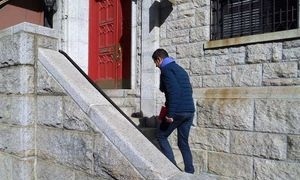
Extract from Philip Pullella, Reuters, 24 April 2018
Vatican City (Reuters) - A Chilean man who was sexually abused by a priest as a boy will urge Pope Francis to sack “toxic” bishops who covered up the assaults, he said on Tuesday ahead of a face-to-face meeting with the leader of the Catholic Church....Juan Carlos Cruz, who has become a symbol of the Church’s abuse crisis, will spend several days in the Vatican as a guest of the pope in the residence where he lives. Strong papal action in Chile would send a long-overdue message to the entire Church, he told Reuters in an interview. “I would say ‘hold these bishops accountable, fire a few of them, if not many of them, but fire them and not give them a cushy job here at the Vatican,’” Cruz said....... Cruz and two other victims, Jimmy Hamilton and Jose Andres Murillo, are each due to spend several hours with the pope on a visit that follows an extraordinary April 11 letter in which Francis acknowledged he had made “grave mistakes” in handling the sexual abuse crisis in Chile. In that letter, Francis said there had been a “lack of truthful and balanced information” about the situation in Chile. He invited the victims whose words he had once dismissed as “slander” to the Vatican to seek their forgiveness and ordered all of Chile’s bishops to a summit with him next month....(more) Photo: Reuters / Alessandro Bianchi
Extract from Gerard O’Connell April 21, 2018
In a historic decision, Pope Francis has appointed three women—two Italians and one Belgian—as consultants to the Congregation for the Doctrine of the Faith as part of his ongoing effort to give a greater role to women in the work of the Roman Curia offices, the central administration of the Catholic church. The Vatican announced today, April 21, that Francis has named three women and two priests as consultants to the C.D.F. The three women are Dr. Linda Ghisoni, undersecretary for “the section for the lay faithful” in the Dicastery for Laity, Family and Life; Prof. Michelina Tenace, who teaches theology at the Pontifical Gregorian University in Rome; and Prof. Laetitia Calmeyn, who teaches theology at the Collège des Bernardins, Paris. The two priests are the Rev. Sergio Paolo Bonanni, who teaches theology at the Pontifical Gregorian University, and Manuel Jesús Arroba Conde, C.M.F., a Claretian and president of the Institute of Both Jurisdictions (civil and canon law) at the Lateran University in Rome.....All Vatican congregations and pontifical councils have consultants who are appointed by the pope. The role of a consultant in the Roman Curia is to give advice or opinions on questions that need to be resolved or to be studied. It is an advisory role, meant to give breadth and focus to a given question. Consultants have long played an important role in the C.D.F.; for example, they have often been called on to give their opinion on a book or an article written by theologians that may have raised questions of doctrine....(more)
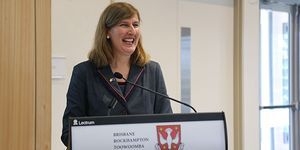
Extract from Mark Bowling, 20 April 2018
Australia's first resident woman ambassador to the Holy See Melissa Hitchman has described Pope Francis’ papacy as a “unique moment in history”. “He is willing to dialogue on issues that the Church has previously not been prepared to do,” Ms Hitchman said at the start of a mid-term tour during which she will be speaking with Australian Catholic leaders and agencies and reporting on progress during the first half of her three-year posting. The head of Australia’s resident mission to the Holy See, Ms Hitchman said Pope Francis had a clear message to send, and was not afraid to be “the voice of the voiceless” on issues such as migrants and refugees, climate change, and even some of the more controversial issues facing the international community. “He’s showing a courage, and values-based leadership,” Ms Hitchman, a Catholic herself, said. Ms Hitchman described an historic set of circumstances linking Australia and the Holy See. “I’m delighted to be there at this moment in history,” she said. “It is a great congruence with our foreign policy and the Holy See’s policy, which is only limited by imagination and resources. “Australia and our partners in the international community have much in common in terms of service to humanity and the global commons, and so we are able to partner with him (Pope Francis) in a way that maybe we aren’t with other global leaders in the world today.....Since arriving in Rome in 2016, Ms Hitchman said she had witnessed “some positive developments” for women working in and around the Vatican. She said a new group known as “donna in Vaticana” or DIVA now offered women official recognition “that they exist and that their work is valuable and appreciated”. “It represents the women working in the Vatican, and this group gives them a voice in a way they have not had before,” Ms Hitchman said. “There are now opportunities for women. “They have some very educated, intelligent, highly networked women working in the Vatican, advising the Curia … some of them are Harvard Law graduates; they feel a calling to the Church and are using their skills and talents in that way. “Some of those women in the Vatican are working on issues as diverse as arms control, humanitarian aid and assistance through Caritas, all sorts of areas.“There are so many issues we could be working on and at times we become exhausted trying to cover them all.”....(more) Photo: Mark Bowling
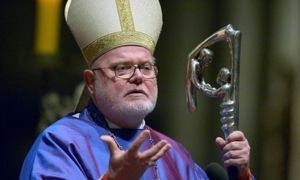
Extract from Cindy Woden, Crux, CNS, 19 April 2018
In general, Catholic teaching insists that sharing the sacrament of Communion will be a sign that Christian churches have reconciled fully with one another, although in some pastoral situations, guests may request the Eucharist. During Francis’s visit to Sweden in 2016, Koch, the Vatican’s chief ecumenist, was asked about the situations in which such sharing would be permitted. In reply, he said a distinction must be made between “eucharistic hospitality for individual people and eucharistic communion.” The term hospitality is used to refer to welcoming guests to the Eucharist on special occasions or under special circumstances, as long as they recognize the sacrament as the real presence of Christ. Eucharistic communion, on the other hand, refers to a more regular situation of the reception of Communion by people recognized as belonging to the same church family, he had said....(more) Photo: Cardinal Reinhard Marx, Crux, Sascha Steinbach EPA via CNS
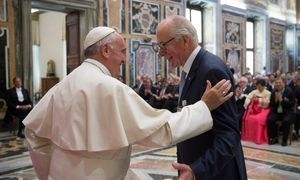
Extract from Inés San Martín, Vatican Correspondent, Crux, 18 April 2018
“Pope Francis has consistently called for an urgent process of correction in the way the world economy works, especially to look at the causes of exclusion of the poorest and the development of economic models of inclusion,” Martin said. During the press conference on Wednesday, he also spoke about the challenge of generating growth with equity is not one that only involves “the moralist,” but it’s also a task for economists and policy makers. The level of corruption that permeates economic activity worldwide, he added, is yet another “striking characteristic” of the world’s current model, and in every case, “it’s the poor who pay the cost of corruption.” Dialogue between the Church’s social teaching and economy cannot be a “top-down” approach, Martin said. “We have to invest in people,” and doing so means looking for creativity and innovative approaches to solve problems, not only in the “great protagonists of information technology,” but also in the poor, who Martin defined as “one group that shows extraordinary innovation,” who show their abilities simply through survival. “A fundamental principle of economic activity must be to allow the poor to have voice,” he said....(more) Photo: Crux, Pope Francis, Poverty Centesimus-Annus, CNS L'Osservatore Romano
Exttract from Melbourne Catholic, CruxNow, 18 April 2018
A lawyer for the most senior Vatican official to be charged in the Catholic Church sex abuse crisis told an Australian court on Tuesday that Cardinal George Pell could have been targeted with false accusations to punish him for the crimes of other clerics. Defence and prosecution lawyers were making their final submissions in the Melbourne Magistrates Court in a hearing to determine whether the case against Australia’s highest-ranking Catholic was strong enough to warrant a trial by jury. Magistrate Belinda Wallington will make her ruling on 1 May on whether Pell will stand trial...(more)

Extracts from CathNews, 13 April 2018
Hobart Archbishop Julian Porteous has ordered a full audit of all Catholic institutions in Tasmania to identify and remove plaques depicting convicted sexual abuse offenders. It follows the removal last year of a plaque from the exterior of Hobart’s St Mary’s Cathedral which depicted a former Catholic priest convicted of sex offences. Victims of clergy sexual abuse had demanded the controversial plaque be taken down.....“Most of those plaques have already gone, our request is much deeper than that,” Mr Punch said. “They need to set up an inventory of every place, every school, every catholic institution that’s been a site of sexual abuse, and that’s substantial. “We’re asking for a program of redress to be included at any site that has been used to sexually abuse children and young people.”...(more). Photo: The plaque that was removed from Hobart cathedral last year (ABC/Peter Curtis)

Public exchanges between representatives of 'liberal' and 'conservative' Catholicism are a necessary start — but that is only a start
Limited extract from Massimo Faggioli, La Croix International, 16 June 2018
The first step in solving a problem is recognizing there is one. The Catholic Church has become aware of the deep divisions among the faithful in some countries, such as those in the United States, who play a particular role in global Catholicism. It is no coincidence that these divisions have became all the more visible in the transition from Benedict XVI to Pope Francis – which has been not just a change of pontificates, but a change of eras. Divisions within Catholicism are not a new phenomenon, but they have become more visible in the age of new media, which has helped redefine the alignments between theological orientations (liberal, conservative and traditionalist) vis-à-vis the Bishop of Rome. It seems safe to say that the ecclesial segregation of Catholics under the same roof is not going to go away anytime soon. The visible and invisible features of this divide are driven not only by theological factors, but also – and primarily – by political ones. In the United States, which has been at the center of this phenomenon the....(Source). Photo: La Croix International.
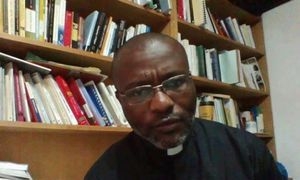
Father Ludovic Lado SJ, an anthropologist, offers a reflection on clericalism in the church
Limited extract from Ludovic Lado SJ, Subscription journal La Croix International, 16 April 2018
The Holy See is an independent sovereign entity located in the Vatican City State. And as such it welcomes ambassadors and accredits them to other world states. Vatican or Holy See diplomats have the title of “apostolic nuncio.” As diplomats, they provide a link between the state or the states that they represent, the local church and the Vatican, particularly with respect to the interests of the Catholic Church. They play a decisive role in the nomination of bishops. Although the nuncio’s role has an apostolic objective, as indicated by its very title, it also has a powerful political dimension. I have often asked myself the question of why there are no lay apostolic nuncios. Nuncios generally have the rank of bishop, which signifies that they are necessarily chosen from the ranks of the clergy. In turn, this also means that they are necessarily male. It is thus one of the most clericalized roles in the church. And I really have to ask why? Are there any biblical or theological reasons involved? I have not been able to identify any such reason. Initially, Jesus simply had disciples whom he sent out on mission with the following warning.........That the church ended up conceiving of itself as a political entity to the point of having ambassadors like other political entities is an outcome of that post-Constantinian ecclesiology. The role of the nuncio as a member of the clergy, who looks after the interests of the church with respect to a state, forms part of this historical evolution. It mostly follows a logic of pragmatism. However, it remains a clerical function because it is rooted in an ecclesial tradition where the exercise of authority is eminently clerical and where power is traditionally held by the clergy. The perverse form of this clerical power is what we know as clericalism.....(more)
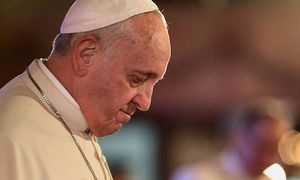
'I ask forgiveness of all those I have offended and I hope to be able to do it personally in the coming weeks'
Limited extract from La Croix International staff, Vatican City, 12 April 2018
Pope Francis has apologized for underestimating the seriousness of the sexual abuse crisis in Chile, acknowledging that he has made “serious mistakes” in handling the issue. In a letter to the bishops of Chile, the pope said he made "serious mistakes in the assessment and perception of the situation, especially due to a lack of truthful and balanced information." I ask forgiveness of all those I have offended and I hope to be able to do it personally in the coming weeks," Francis said in the letter that was released by the Vatican April 11. Several survivors apparently have been invited to the Vatican to meet the pope. The pope’s letter follows Vatican investigator Archbishop Charles....(source) Photo: Pope Francis La Croix International, Benhuir Arcayan

Adelaide Archbishop Philip Wilson took the stand in Newcastle Local Court to give evidence for the first time
Extract from CathNews, 12 April 2018
Under questioning from his barrister, Stephen Odgers SC, Archbishop Wilson unequivocally denied having any memory of a conversation in 1976 with Peter Creigh about former priest James Fletcher subjecting Mr Creigh to acts of punishment and sexual abuse five years earlier. When asked if he was able to say whether such a conversation took place, Archbishop Wilson said he thought it was doubtful. “I think it is unlikely because the nature of the evidence was so graphic,” he told magistrate Robert Stone. “I don't think I would have forgotten that.” Asked what he would have done if Mr Creigh had told him about the abuse, Archbishop Wilson said his first priority would have been to provide pastoral care to the then 15-year-old boy and his family. The Archbishop said he would also have reported the allegations to his superiors....(more)

Pope Francis cites women writers frequently and at length
Limited extract from Rita Ferrone, Subscription Journala Croix International, 11 April 2018
The first thing that jumped out at me in Pope Francis’s apostolic exhortation on holiness, Gaudete et exsultate, is how much he has put women in the foreground. Women are usually in the background of papal statements, if they appear at all. Not here. They are upfront and visible. Right at the outset (§ 3), Francis brings up the witness of Sarah (along with Abraham), and calls attention to the role of our own mothers and grandmothers as holy witnesses who have shaped our faith. He continues to name outstanding women believers within the.....(source) Photo: La Croix International, Women in early Church

Extract from Andrew Hamilton, Eureka Street, 10 April 2018
In a recent Eureka Street article I remarked that in the Catholic Church clericalism is a pejorative term. I tried also to identify some of the attitudes and behaviour associated with people regarded as clericalist. The article sparked a lively conversation. Priest on cobbled streetSome contributors criticised me for focusing on individuals and not on the more insidious culture of clericalism. The criticism was justified, and in this article I shall reflect on the culture and its byproducts. As a culture clericalism displays a world view in which the Catholic Church is a self-sufficient world. Its security, reputation and internal relationships are the centre of attention. Within the Church relationships are hierarchical, and the difference between grades is in practice seen as more important than what Catholics have in common. The relationships are also often authoritarian: bishops and priests are fearful of Rome, formal in their relationships with one another, and priests are prescriptive in their relationship to the laity. Clergy feel no need to consult the laity in matters of liturgy, finances and policy. The boundaries between the Church and the world outside are strongly marked, as are the boundaries between faithful and unfaithful Catholics. In all these respects clericalism is a culture of control that privileges secrecy. Like any culture, clericalism finds expression in a network of relationships. They are relationships of people with the material world: through distinctive everyday and liturgical dress, for example, distinctive church arrangements, and distinctive liturgical artefacts....(more). Photo: Eureka Street,
Edited extract from Association of US Catholic Priests, published 25 January 2018, Extracted here 10 April 2018
Preparing the Sixth Edition of the Program of Priestly Formation: Five Overriding Concerns
I. Faithfulness to Vatican II A. As the foundation of priestly formation, the pastoral values of Vatican II need to permeate and be consistently and persistently affirmed in the sixth edition of the Program of Priestly Formation. These values should serve as the basis and of all phases of priestly formation. We see that Vatican II’s values include: grounding in the Scriptures, conversion of heart in a personal relationship with Jesus Christ, the Church as the People of God, the universal call to holiness, the central role of the laity, vernacular worship, the Church’s mission to the world, dialog and consensus building, subsidiarity, and ecumenical-interfaith-interreligious commitment. The Vatican’s 2016 Ratio Fundamentalis adds the following specifics: pastoral charity, priestly heart, inner freedom and maturity, complete self-bestowal, missionary discipleship and service. B. Our concern: priestly formation in recent decades has not adequately implemented Vatican II’s pastoral vision and values in candidates. According to Cardinal Wuerl, Vatican II in our time is “now making its way… slowly but surely,” fueled by “all that Pentecostal energy that the Council unleashed”1 Yet the implementation of the program of priestly formation has resulted in many priests in the last several generations of priests who see Vatican II as little more than an historical footnote rather than the guiding vision for our Church in the modern world. Some recently ordained clergy even see Vatican II as a distortive moment in the Church’s pilgrimage through time. As a result they see themselves as tasked now to undo and correct the “damage done” by priests who have labored before them to receive and live Vatican II’s ‘New Pentecost.’ This perspective has been planted and is being supported by those resisting Pope Francis’ initiatives to continue the pastoral implementation of Vatican II. Presbyterates and parish communities in our country are being divided, at least in part, by how priests have been formed by priestly formation programs as implemented in recent years. C. Recommendations:....(more)
Initiatives differ from one diocese to another, depending on local realities and local sensitivities, says Father Gilles Routhier
Father Gilles Routhier, priest of the Archdiocese of Quebec, ecclesiologist, Professor and Dean of the Faculty of Theology and Religious Science, analyses the fears of an increased divergence in pastoral practices in different dioceses, two years after the publication of Amoris Laetitia.
Limited extract from Anne-Bénédicte Hoffner, subscription journal La Croix International, 6 April 2018.
Anne-Bénédicte Hoffner: In the Apostolic exhortation Amoris Laetitia, the pope invites “each bishop” to “offer his own local church the most suitable pastoral initiatives” to guide families.....(source)
Extract from Veronique Demers, Crux, Catholic News Service, 5 April 2018
QUEBEC CITY, Canada - The Catholic bishops of Quebec have discussed the possibility of ordaining married men to the priesthood. During a conference dedicated to the future of the Catholic Church in Quebec, Auxiliary Bishop Marc Pelchat of Quebec said consolidating parishes was not a solution to the lack of priests. “During a closed hearing at a recent plenary session of bishops, there was talk of the ordination of married men of a certain age, whose ecclesial commitment is tested. This is an important reflection that we have right now,” he said in mid-March. Nearly 80 people attended the conference, organized by the lay group Le Parvis de Quebec, at the Canadian Montmartre, or Sanctuary of the Sacred Heart. “The situation of churches continues to change. In the last decade, there has been a significant decline in the demand for sacraments, including even the funeral rite. The Church has become like a vestige of the past, destined to be marginalized. The faithful still present believe that there’s still Good News to share, but it will have to be done differently. We will have to be persevering,” said Pelchat. Many people asked Pelchat, the longtime dean of the faculty of theology and religious studies at Laval University, about the participation of the laity in the life of the Church. Pelchat said the Quebec Church has long put faithful in a position of spectators and consumers, especially regarding the sacraments. “We need to change this way of doing things. We believe that we can rebuild the Church, even if it is more humble, to announce the mission of Christ,” he said, stressing that many answers will come from the field.......(more)

The Catholic Church in Australia faces a pivotal moment in its history, with an official search now underway to replace long-serving Melbourne Archbishop Denis Hart. Senior Catholic sources have told The Age that a highly secretive selection process is near completion, with Pope Francis to have the final say on Archbishop Hart’s successor. The process is meant to be subject to “pontifical secret” – an order made by the Vatican under canon law which imposes silence – so is not meant to be discussed. Archbishop Hart turns 77 next month and would have had to formally offer his retirement almost two years ago, on his 75th birthday. It is up to the Pope when he accepts such a resignation. Senior sources believe a decision is imminent. But The Age has confirmed that Pope Francis’s representative in Australia, the Apostolic Nuncio, has been sounding out senior Catholics about who should be the next archbishop. The Nuncio, Archbishop Adolfo Tito Yllana, did not respond to a request for comment from The Age. Archbishop Hart, through a spokesman, declined to comment....(more). Photo: The Age, Luis Enrique Ascui.

Limited extract from Massimo Faggioli, subscription journal La Croix International, 3 April 2018
The Catholic Church and the world’s constitutional democracies are today facing the same critical challenge – how, as institutions, they can credibility represent their people. We saw this in the church several days ago after some 300 young people who met in Rome to offer their views on the next session of the Synod of Bishops issued their final document.
Their text was just the latest occasion for the usual critics of Pope Francis, especially in the United States, to once again take aim at the pope. The critics accused the teens and young adults that drafted and approved the final document of merely parroting the pope and being manipulated by him. The young authors of that document have officially denied the allegations. Interestingly, in denying the charges, the youths also pointed out the gap between the healthy ecclesial ethos modeled by their gathering in Rome and the polarization that has become so evident among Catholics in the United States.....(source) Photo: La Croix International, Synodal Church Faggioli

Plenary Council 2020 - 3 Year Timeline
Monday 26 March 2018
Now available from the Plenary Council website HERE
Saturday 24 March 2018
A timely series of papers on early Australian Provincial Councils / Plenaries by Peter Wilkinson has been published in The Swag and with kind permission of The Swag are republished as 'No, 78' on the Documents Page of this website.
Extract from Communique, Canberra, Friday 23 March
Nine Catholic groups advocating for systemic reform of the Church have met in Canberra today to assert the responsibility of all Catholic people to be heard and to lead in the Church. The Catholic Church in Australia faces continuing decay unless bishops understand the necessity of the grassroots Catholics to have a central role in the direction and decision-making of the Church. There needs to be a restoration of trust in and by the bishops in the value of advice and wisdom from ordinary Catholics which for too long has been rejected or at best ignored....(more)

Extract from CathNews, 23 March 2018
More than 200 people from remote and rural parts of Port Pirie Diocese in South Australia have met for the first major gathering since the announcement of the 2020 Plenary Council. Source: ACBC Media Blog. “Looking forward in hope towards 2020” was the theme for the two-day assembly, which was attended by parishioners and clergy from all parishes across the vast geography of the diocese, as well as the diocesan and state leaders of Centacare, Catholic Education, St Vincent de Paul, Catholic Women’s League and other diocesan ministries. The youth of the diocese were also strongly represented at the assembly, reminding the gathering that this year's Year of Youth is not just for the young, it is for everyone. Port Pirie Bishop Greg O’Kelly SJ was also present at the assembly. “At a time when the rural Church in Australia faces seemingly insurmountable challenges, it is essential that we remember we are a people of hope and we are proud to be leading the engagement with the Plenary Council,” Bishop O'Kelly said.....(more) Photo: CathNews.

Extract from Australian Catholic Bishops Conference, Monday 19 March 2018
Pope Francis has given his approval for the Catholic Church to hold the first Plenary Council – the most significant national gathering that can be held – in Australia in more than 80 years. “The Australian Bishops are deeply grateful to Pope Francis for affirming the decision and we ask all people to join in prayer as we embark on this journey together as God’s people in Australia,” said Archbishop Mark Coleridge of Brisbane, chair of the Bishops Commission for the Plenary Council. “The Council will be a unique opportunity for people to come together and listen to God in all the ways God speaks to us, and in particular by listening to one another as together we discern what God is asking of us at this time – a time when the Church in Australia is facing significant challenges. “We sincerely hope the preparation and celebration of the Plenary Council is a time when all parts of the Church listen to and dialogue with one another as we explore together how we might answer the question: ‘What do you think God is asking of us in Australia?’” In approving the Plenary Council, Pope Francis also endorsed the bishops’ nomination of Perth Archbishop Timothy Costelloe SDB as the president of the Plenary Council. Archbishop Costelloe said he holds great hope that the Council will bring about a period of authentic renewal. “This is a significant moment for the Catholic Church in Australia and I look forward to walking with the people of God as we look towards the future,” Archbishop Costelloe said.....(more)

Extract from Fr Noel Connolly, Diocese of Ballarat website, March 2018
The Australian Bishops at their November meeting decided that the Plenary Council will be held in two sessions, one in October 2020 around the tenth anniversary of Mary Mackillop’s canonisation and the second in May 2021. One of these sessions will be held in Central Australia and the other in one of the major cities on the East Coast. In the next few months, the Facilitation Team and the Executive Council will prepare a website, social media access, a Plenary Council logo and prayer, a survey [online and on paper] and other instruments to ensure that all Catholics can be consulted in as full, free and productive way as possible. Meanwhile, the Bishops are to appoint working groups to ensure that the people in their dioceses, parishes, schools, health care and social welfare facilities can be involved. The official launch will be on Pentecost Sunday 2018. That will begin a year of consultation through diocesan and parish meetings, family conversations, facilitated community discussions, meetings with scho ols, health care, social welfare agencies, with aboriginal groups, the poor, listening sessions with the bishops and so forth. There will also be consultation and reporting back through the website, discussion through social media, and other ways. The hope is that many Catholics, active and disaffected, will take the opportunity to help plan the future of our Australian Church. After Easter 2019 we will try to review and consolidate what has been said in the hope of beginning a second phase of consultation and prayerful discernment after Pentecost 2019. Early in 2020 the main issues and directions should be clearer and we can prepare documents, merciful and inspiring ones along the lines of the Vatican II documents. These can then be shared and attract feedback and discernment before the October 2020 first Session. They may also be accompanied by legislation to ensure they are implemented....(more)
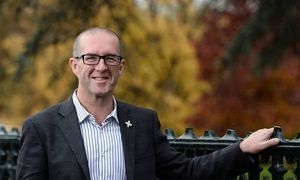
Extract from Fr Justin Driscoll, Vicar General Ballarat Diocese, March 2018
The Catholic Church in Australia has commenced preparations for a Plenary Council to be held in 2020. A Plenary Council provides an occasion for the whole Church to discern what the Holy Spirit is saying to our Church at this time. For this to happen, wide consultation of the entire Australian Church will be necessary so that all voices have an opportunity to be heard. Processes that enable all to genuinely listen to each other will also be required. A new relationship of trust and confidence has to be created within the Church in Australia and the wider community. The last time a Plenary Council was held in Australia was eighty years ago in 1937. At that time those engaged in the Plenary Council were advised to “take care that provision is made for the pastoral needs of the people of God… and to decide what seems opportune for the increase of the faith, the organization of common pastoral actions and the regulation of morals and of common ecclesiastical discipline which is to be observed, promoted and protected.” A Plenary Council has legislative capacity that will be applicable to the Church in Australia. The idea of having another Plenary Council in Australia has been around for some years. The idea has been given fresh impetus by Pope Francis’ encouragement of a ‘synodal’ style of Church and also by the reflection on the lessons of the Royal Commission into Institutional Responses to Child Sexual Abuse. The synodal process has three stages – preparation, celebration and implementation......(more)
Extract from Daniel Ang, Diocese of Broken Bay
What does it mean as a Catholic community to live the life and mission of Jesus in contemporary Australian society? It is this question that has moved the Australian Catholic Bishops Conference to announce a Plenary Council of the Church in Australia to be held in the year 2020. The Bishops Conference has sought the approval from Pope Francis for this Council, official endorsement which is expected in due course. Put simply, a Plenary Council is the highest form of communion between the various local or particular churches of a nation. It is, then, not simply a meeting of bishops but a process that calls for the participation of the entire Catholic community. It invites the whole Church into dialogue, to discern how its communities can live the Gospel with renewed vitality amidst new questions and challenges. The Plenary Council itself will feature representation from among the laity, religious and ordained ministers, together with the bishops of Australia, as the culmination of a sustained pilgrimage in faith. As such a Plenary Council is an expression of the ‘synodality’ of the Church, the nature of the Church as a communion of persons ‘walking together’ in faith as disciples of the Lord. The Plenary Council recognises that all the baptised have received a common vocation to be a ‘sacrament or instrumental sign of intimate union with God and of the unity of all humanity’ (Lumen Gentium 1) and upholds with faith that it is by our mutual listening to the Holy Spirit – who guides the Church ‘into all truth’ (John 16:13) – that we can realise our mission most deeply as a community of faith. As set out in Canon Law, a Plenary Council has legislative power with the final decisions reserved to the bishops by nature of their episcopal ordination as successors of the Apostles. The bishops are obliged to make decisions on the basis of their careful discernment of the work of the Holy Spirit in the minds and hearts of all the People of God, recognising that the sense of the faith of the faithful – what is known as the sensus fidelium – is a source of the Church’s life and learning as it seeks to fulfil its Gospel mission. This means that the Plenary Council is more than a single event to be held in the year 2020 but an extended process that invites the entire Catholic community, even now, to ‘walk the path of dialogue’ and interpret what God is doing today and how God is calling the Church to live the Gospel into the future. It calls the Church to undertake a pilgrimage of listening and learning, to be a synodal and receptive church that engages in honest speaking and mutual listening to the Holy Spirit, to share insights and also hear insights shared. Throughout this process of listening, dialogue and prayer, experiences of diverse lives will be welcomed and invited to share their sense of faith, questions and hopes for the Catholic Church – from those who are attempting to live a committed and sacramental life in the Church, those baptised Catholics with lesser involvement in ecclesial life, to those who are vulnerable in Australian society, who may be more distant from the Church, or who have been hurt and may or may not still regard themselves as Catholic in some way.....(more)

Hong Kong priest’s mission to save drug mules from a system that favours kingpins.
Crusading prison chaplain is seeking shorter jail terms for couriers and greater police efforts to hunt down senior gang members.
Extract from Simon Parry, South China Morning Post, 18 March 2018
In the hustle and mayhem of a downtown Bangkok street teeming with prostitutes, sex tourists, garish bars and counterfeit-goods stalls, a grey-haired priest stops beneath a pedestrian footbridge to talk to two cocaine dealers from Ghana. “It’s 4,000 baht [US$130] a gram,” one of the dealers mumbles, rummaging in his jacket pockets and shuffling nervously from foot to foot. His eyes then land on the crucifix around the man’s neck and he says, with a broad grin, “I’m a Catholic too, Father.” The priest smiles, leans in and asks the dealer questions in a low voice. He hands the African a booklet explaining his work, tells him, “Look after yourself,” and walks deeper into the city’s dark heart. The prison chaplain who has stopped 150 drug mules reaching Hong Kong. John Wotherspoon is a man on a mission. He has flown to Thailand from Hong Kong to track down a Nigerian drug kingpin known as IK in a corner of Bangkok so lawless, even local police consider it a no-go zone. Armed with little more than his crucifix and an implacable faith in human nature, the 71-year-old is racing against time to get evidence that might lessen the jail sentence for a mainland Chinese woman called Li Dandan. “She’s in court this week and I need to find him and get him to confirm to me that she was set up,” he explains, clutching photocopied pictures of IK, who the suspect says seduced her and then conned her into flying from Kuala Lumpur to Hong Kong with a cocaine-filled suitcase... (more) Photo: Fr John Wotherspoon, South China Morning Post
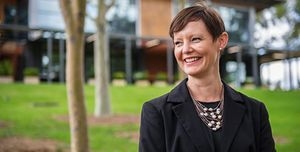
Extract from CathNews, The Catholic Weekly, 16 March 2018
A new religious education curriculum that focuses on faith and reason will soon be rolled out in years 11 and 12 in Catholic schools across NSW. The new “Studies in Catholic Thought” curriculum was requested in 2015 by the NSW bishops, who expressed a desire for a common RE curriculum for the state's 10 dioceses. The new course will replace the current year 11 and 12 elective subject, Catholic Studies, and will adopt a classic liberal arts approach, bringing together history, philosophy, music, culture and art. According to the project officer for the new curriculum, Janina Starkey, it is a “radical departure” from current religion curricula in schools across NSW. “At the heart of it is the integration of faith and reason,” Ms Starkey said. “That’s something our Church has had for the 2000 years of its history. But it’s not something that has really been very apparent in any of our existing courses. That’s the underlying premise of the new curriculum – how do faith and reason sit together?” ...(more) Photo: Janina Starkey-TheCatholicWeekly GiovanniPortelli
Extract from Joanne McCarthy, Newcastle Herald, 14 Match 2018
Australian Catholic bishops face “make or break time”, say prominent Catholics urging the church to make public its first formal analysis of damning child sexual abuse royal commission findings. Reform group Catholics for Renewal and prominent Catholic author Paul Collins say public release of the Truth Justice and Healing Council’s royal commission assessment report, delivered to bishops last week, is a test of whether Australia’s bishops have learnt the lessons of the royal commission and are prepared to include lay Catholics in decision-making. Former priest and Catholics for Renewal president Dr Peter Wilkinson and vice president Peter Johnstone said their group had asked bishops and leaders of Catholic orders to regard the TJH Council analysis of royal commission recommendations as a church “white paper” for reform.
They called on bishops to release the report to Catholics and the broader community for comment and consider those responses before preparing the church’s formal response to royal commission recommendations to the Federal Government. “Not to make that document available is just another sign of continuing secrecy by the bishops,” said Dr Wilkinson, who co-authored a five-year study into systemic reasons for child sexual abuse within the Catholic Church....(more)
Extract from Francis Sullivan, ABC News, CathNews, Truth Justice and Healing Council, Fr16 March 2018
Truth, Justice and Healing Council chief Francis Sullivan is calling on the Church in Australia to deal with crimes carried out overseas by Church officials. Mr Sullivan said it was clear that priests with child sex allegations made against them had been sent overseas to developing countries, including Papua New Guinea and the Philippines, although he was not prepared to concede that those actions were deliberate. But he said the Church needed to treat overseas survivors exactly as they would those in Australia, and ensure they get justice. “The relevant Church authorities need to be able to demonstrate that they’re taking responsibility for the actions in how they moved personnel, particularly when those personnel either had a history of abuse, or abused when they were overseas,” he told Pacific Beat. Four years ago, media reports revealed how one priest, Fr Roger Mount, had spent decades working in PNG after being accused of sexually abusing boys in Australia during the 1960s...(more)
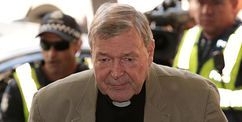
Extract from CathNews, ABC News, 15 March 2018
Cardinal George Pell’s committal hearing in the Melbourne Magistrate’s Court has been opened to the public and the media for the first time since it began on March 5. The hearing has been closed up until yesterday to allow the complainants to give their evidence, which is standard practice in Victoria for cases involving sexual offence charges. Cardinal Pell is fighting historical sexual offence charges involving multiple complaints. No other details can be reported for legal reasons. For the past 10 days, a security guard had been stationed by the door to court room 22 at the Melbourne Magistrates’ Court to ensure no one but Cardinal Pell, his support person, legal team, prosecutors and a magistrate made it inside. Over five days, multiple complainants gave their evidence via video link before being cross-examined by Cardinal Pell’s barrister Robert Richter QC. If Magistrate Belinda Wallington sends the case to trial, Cardinal Pell will be required to enter a plea to the charges. The hearing is expected to remain open for the rest of the committal hearing which is set down for another fortnight...(more) Photo:: CathNews, CNS/Stefan Postles)
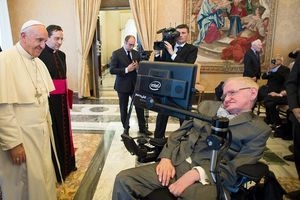
Extract from Carol Glatz, CNS, The Tablet, 14 March 2018
Theoretical physicist Stephen Hawking, who said he did not believe in God, was still an esteemed member of the Pontifical Academy of Sciences and fostered a fruitful dialogue between science and faith. The academy, which Pope Pius IX established in 1847, tweeted, "We are deeply saddened about the passing of our remarkable Academician Stephen #Hawking who was so faithful to our Academy." "He told the 4 Popes he met that he wanted to advance the relationship between Faith and Scientific Reason. We pray the Lord to welcome him in his Glory," @CasinaPioIV, the academy, tweeted March 14. The Vatican observatory, @SpecolaVaticana, also expressed its condolences to Hawking's family. "We value the enormous scientific contribution he has made to quantum cosmology and the courage he had in facing illness," the observatory tweeted in Italian. The British-born theoretical physicist, cosmologist and popular author died March 14 at the age of 76....(more) Photo: The Tablet
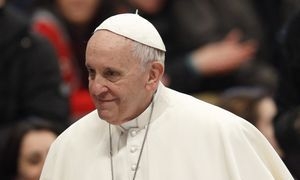
Extract from John Gehring, Commonweal magazine, 13 March 2018
Five years ago this week the cardinals of the Roman Catholic Church selected the first Latin American pope—and the first from a Jesuit religious order known for its fierce commitment to social justice. Pope Francis immediately began changing the public face of Catholicism. He warned that the church can’t only be “obsessed” with opposing abortion, struck a more welcoming tone toward LGBT people, and chose to live in a Vatican guesthouse instead of the more regal Apostolic Palace. Along with disrupting business as usual in Rome, the pope has empowered a new generation of “Francis bishops” in the United States to speak out with renewed vigor on issues beyond abortion and birth control, insisting that being prolife also means addressing income inequality, climate change, and treatment of immigrants. One of the most visible of them, San Diego Bishop Robert McElroy, has argued that the pope’s emphasis on economic justice and poverty demand a “transformation of the existing Catholic political conversation.” Another, Newark’s Joe Tobin, appointed a cardinal by Francis in 2016, took to Twitter a few days after President Trump touted a nativist, “America First” ideology at his inauguration with a warning that only “a fearful nation talks about building walls and is vulnerable to con men.” While a majority of white Catholics voted for Trump, the U.S. Conference of Catholic Bishops has consistently denounced his administration’s efforts to limit refugees from entering the country and blasted the president’s decision to rescind protections for young undocumented immigrants—a move the bishops called “reprehensible.”......Pope Francis has provided bishops a way out of the corner they boxed themselves into over the last decade....(more) Photo: Commonweal, CNS photo/Paul Haring
Extract from Vatican News, 12 March 2018
Pope Benedict wanted to give a contribution, very significant as always, to the interior spiritual unity of the two pontificates. Thus Msgr Dario Edoardo Viganò characterizes the letter sent to him by the Pope Emeritus. Regarding the magisterium of Pope Francis, Benedict writes that “there is interior unity” between his pontificate and that of Pope Francis, his successor. Pope Benedict’s letter was presented by its recipient, Msgr Dario Edoardo Viganò, during a press conference presenting “The Theology of Pope Francis,” a series of 11 books written by 11 different authors, and published by Libreria Editrice Vaticana. The news conference was held in Sala Marconi in the headquarters of Vatican Media. Pope Benedict applauds publication of the series. “I applaud this initiative,” writes Pope Benedict. “It contradicts the foolish prejudice of those who see Pope Francis as someone who lacks a particular theological and philosophical formation, while I would have been solely a theorist of theology with little understanding of the concrete lives of today’s Christian. The Pope Emeritus writes that he is grateful to have received the set of 11 books edited by Roberto Repole, President of the Italian Theological Association. Pope Benedict XVI adds that these volumes “reasonably demonstrate that Pope Francis is a man with profound philosophical and theological formation and are helpful to see the interior continuity between the two pontificates, even with all the differences in style and temperament.”...(more) Photo: Vatican News, Vatican Media

Francis’ reforms are aimed at changing mentalities Limited Extract from Editorial, Nicolas Senèze, Rome, subscription journal La Croix International, 10 March 2019
Pope Francis has already set in motion significant changes, particularly with the church’s finances but there is still much to do about the Curia’s structure and sexual abuse. “Making reforms in Rome is like cleaning the Egyptian Sphynx with a toothbrush,” the 19th century Belgian prelate and Papal States statesman Xavier de Mérode used to say. The phrase was taken up by Pope Francis when he addressed the Curia in December. The pope — elected five years ago with a mission to reform the church and the Curia, an aspiration expressed by cardinals in meetings prior to the conclave — was emphasizing the magnitude of the task ahead, and drawing attention to the lack of support from those who were supposed to be helping him. Is his revolution now well under way? Exactly a month after his election, Francis set up the “C9” — a council of cardinals charged with supporting him in the government of the church and the reform of the Curia. Yet, while this council held its 23rd meeting last week, there is still no sign of the forthcoming publication of an apostolic constitution replacing Pastor Bonus, the text enacted in 1988 by...(Source) Photo: LaCroix International.
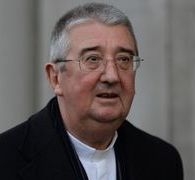
The former president has called on Pope Francis to address gender inequality in the Catholic Church. Extract from TheJournal Ireland, 10 March 2018
The Catholic Archbishop of Dublin has said former Irish President Mary McAleese’s criticism of the Catholic Church was “brutally stark”. Speaking in Dublin last night, Diarmuid Martin said: “Probably the most significant negative factor that influences attitudes to the Church in today’s Ireland is the place of women in the Church.” In recent days McAleese described the Catholic Church an “empire of misogyny”. She said the bar on women becoming priests should be lifted and called on Pope Francis to address gender inequality in the Church. “Failure to include women as equals has deprived the Church of fresh and innovative discernment; it has consigned it to recycled thinking among a hermetically sealed cosy male clerical elite flattered and rarely challenged by those tapped for jobs in secret and closed processes. “It has kept Christ out and bigotry in,” she said while giving a speech in Rome yesterday. Martin made his comments while launching a new edition of Donal Harrington’s book Tomorrow’s Parish....(more) Photo: Diarmuid Martin Artur Widakl NurPhoto via Getty Images
The church’s position on keeping women in a subordinate role to men 'kept Christ out and bigotry in,' says former Irish president Mary McAleese Limited extract from Staff, subscription journal La Croix International, 9 March 2018
Catholic women meeting at an international conference in Rome have called on Pope Francis to ensure greater decision-making roles for women in the church. Former Irish president Mary McAleese who was key speaker at the “Why ......(Source)
Voices of Faith International Women's Day 2018
The Keynote Speaker was Mary McAlewse, Former President of Ireland. In this video we see and hear catholic voices from across the globe speaking on women and leadership in the Catholic Church. See Video HERE
Extract from CathNews, ABC News, 9 March 2018
A national redress scheme for child sexual abuse survivors is a step closer with NSW and Victoria signing up to an agreement that offers practical services and compensation of up to $150,000. Source: The Age. Malcolm Turnbull will reveal the agreement with Victorian Premier Daniel Andrews and NSW Premier Gladys Berejiklian today, in an agreement that puts each state on the line for costs that will run to hundreds of millions of dollars over a decade. The new pact intensifies pressure on churches and other groups to submit to the scheme and help victims recover from abuse that dates back decades, putting the primary responsibility on the institutions to fund the payments and support services.
The Church’s Truth Justice and Healing Council chief Francis Sullivan has urged other states to sign up and noted that Catholic leaders are on the record saying they will join the national scheme. But the fine print of the agreement is yet to be finalised and some victims appear certain to fall between the gaps, with nobody offering to pay for their help if the institution responsible for their abuse no longer exists.....(more)

Extracts from Dorothy Ann Lee, The Conversation, 9 March 2018
Who was Mary Magdalene? What do we know about her? And how do we know it? These questions resurface with the release of a new movie, Mary Magdalene, starring Rooney Mara in the titular role. The question of how we know about her is a relatively simple one. She appears in a number of early Christian texts associated with the ministry of Jesus. These texts comprise Gospels written in the first and second century of the Common Era (CE). The earliest of them are included in the New Testament, where Magdalene plays a significant role. She also appears in later Gospels, which were not included in the Bible and come from a later period in early Christianity. The answer about who she was and what we know of her is more complex. In Western art, literature and theology, Mary Magdalene is portrayed as a prostitute who meets Jesus, repents of her sins, and pours oil on his feet in a gesture of humility, penitence and gratitude. She is sometimes depicted kneeling at the foot of the cross, hair unbound, emphasising the sinful past from which she can never quite escape, despite being declared a saint. The tradition of the penitent prostitute has persisted in the Western tradition. Institutions that cared for prostitutes from the 18th century onwards were called “Magdalenes” to encourage amendment of life in the women who took refuge in them. The word came into English as “maudlin”, meaning a tearful sentimentality. It is not a flattering description.........Yet nowhere in the Gospels is Mary Magdalene associated either overtly or covertly with sexuality. The four Gospels of the New Testament present her in two significant roles. In the first place, she is a disciple of Jesus: one among a band of women and men from Galilee who believed in his message of love and justice and followed him in his ministry. Secondly, Magdalene is a primary witness in the Gospels to the resurrection of Jesus from the dead. Unlike many of the other disciples, she does not flee when Jesus is arrested. She remains at the cross when he dies and later visits his tomb to find it empty, with a vision of angels declaring his resurrection....(more) Image: The Conversation, Titian c 1565 Magdalene Wikimedia
Extract from Claire Giangravè, CruxNow.com Friday 9 March 2018
While tensions over women in the Church have been a constant in Catholic life for a long time, recent signs suggest a turning point may be looming, with conferences, assemblies and media outlets both within and outside the Vatican speaking up in a new way about perceived injustices. Women meeting at a Voices of Faith conference this week in Rome, for instance, are saying the ‘Church is at a very important crossroads,’ while the editor of a Vatican magazine focusing on women says she sees an ‘internal cultural revolution’ brewing. At the same time, a general assembly of bishops from Latin America taking place inside the Vatican walls has invited forty women to take part in a conversation on the female role in the Church, amounting to another recognition that it’s a subject that can’t be avoided. While these female perspectives may differ in tone and focus, one common thread emerges: ‘The Times they are a Changin’.’ Today, the Church increasingly faces not only newfound feminist zeal expressed in the #metoo movement throughout the world, but also profound changes from within....(more)
Extract from Office for the Participation of Women, Australian Catholic Bishop's Conference, Melbourne Catholic, Thursday 8 March 2018
Australians are today encouraged to join with people around the world in reflection and consideration for the particular challenges women face when they live outside metropolitan areas. International Women’s Day is celebrated each year on 8 March and 2018 welcomes the theme of Time is Now: Rural and urban activists transforming women’s lives. The day will help give voice and support to the work, the rights and the activism of women living in rural areas across the globe. They make up more than one quarter of the world’s population. They till the lands and plant seeds to feed nations, ensure food security for their communities and build climate resilience. Yet, on almost every measure of development, because of deep seated gender inequalities and discrimination, rural women fare worse than rural men or urban women. Furthermore, 2018’s International Women’s Day comes on the heels of unprecedented global movement for women’s rights, equality and justice. Sexual harassment, violence and discrimination against women have captured headlines and public discourse, propelled by a rising determination for change....(more)
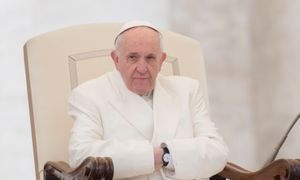
Extract from The Tablet, 8 March 2018
The Mass is Christ's sacrifice, which is free, the Pope explained Mass isn't a paid arrangement for salvation but rather the commemoration of Christ's sacrifice of his life, given freely to all, Pope Francis said at his general weekly audience at the Vatican this week. Christians can make a silent prayer during Mass or donate money to offer a Mass for a loved one who is in need or passed away, but should never feel obliged to make a payment, the Pope said at his audience yesterday (7 March). "Nothing! Understood? Nothing! You do not pay for the Mass! The Mass is Christ's sacrifice, which is free. Redemption is free. If you want to make an offering, do it. But you do not pay for it! This is important to understand!" he said. Pope Francis held the audience in the Vatican's Paul VI hall due to forecasts of rain for Rome. The Vatican also opened St Peter's Basilica to accommodate the overflow, with giant screens set up in the basilica so the people could follow the audience. In his main talk, the Pope continued his series on the Mass, focusing on the eucharistic prayer, "the central moment" in which Christians re-live "what Jesus himself did at the table with the apostles at the Last Supper". "In this solemn prayer, the Church expresses what it does when she celebrates the Eucharist and the reason why she celebrates it, that is, to make communion with Christ truly present in the consecrated bread and wine," the Pope said.....(more) Photo:The Tablet.
Pope Francis’ views on allowing the Sacraments for those who remarry not heretical — criticism of ‘Amoris laetitia’ misplaced
Limited extract from International staff, subscription journal, La Croix International, 7 March 2018
Pope Francis’ post-synodal apostolic exhortation on the family gives hope to “the wounded” and is not heretical, Cardinal Walter Kasper said while promoting his new book in Rome on March 5. The sanctity of marriage must be respected but debate on issues like di....(Source)
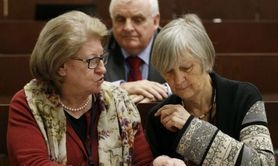
Extract from by Joshua J. McElwee, National Catholic Reporter, 7 Mar 2018
Rome — Pope Francis' clergy sexual abuse commission could be more effective in protecting children if the group were granted more time to work directly with the pope and given resources to hold more in-person meetings each year, a former member has suggested. French child psychiatrist Catherine Bonnet, who was among a group of six founding members of the Pontifical Commission for the Protection of Minors not reappointed by Francis last month, said the "most important thing" is that the group does not have adequate time to explain its proposals directly to the pontiff. "We never worked with Pope Francis," Bonnet said in an NCR interview Feb. 19. "We only said hello, two minutes, and good-bye, two minutes." "The most important thing for the next commission ... would be that there are times where Pope Francis can come and the proposals are explained to him, why they are so important," she said....(more). Photo: NCR, (CNS/Paul Haring)
Extract from Media and Communications Office, CAM, Tuesday 6 March 2018
The Andrews Government has introduced new laws to quash a legal loophole preventing child abuse survivors from suing some organisations for their abuse. Under proposed new laws introduced to parliament, unincorporated associations—including religious institutions—would have to nominate an entity to pay damages. If a religious organisation failed to nominate an entity, a court could order the unincorporated organisation’s associated trusts to be sued and used to pay compensation to victims. Previously victims of abuse have been unable to sue unincorporated entities like the Catholic Church in civil claims. Stemming from a case brought to the NSW Court of Appeal by abuse survivor John Ellis in 2007, the Court of Appeal found the Catholic Church was not a legal entity, and as such could not be sued for abuse. Leaders within the Catholic Church including Archbishop Denis Hart have voiced their support for the new laws. ‘I welcome today’s announcement by the Victorian Government of its intention to introduce new laws allowing victims of child abuse to sue institutions which may be responsible for their abuse’, the archbishop said in a statement. ‘I remain committed to fair, reasonable and honest dealings with victims of child abuse and to always treating them with respect and dignity,’ the archbishop said. Speaking with reporters, Premier Daniel Andrews said, ‘this deals with what is something that I think has re-traumatised victims and survivors for too long, something that has made a terrible set of circumstances even harder.....(more)
'Pope Francis, he gets it. Today there are all sorts of configurations of families ... gay couple raising children, people in second marriages'. Limited extract from International staff, subscription journal, La Croix International, 6 March 2018
A one minute clip about a Catholic bishop welcoming people in second marriages and gay people raising children has been removed from a video promoting the World Meeting of Families 2018. The meeting is scheduled to take place in Dublin in August and which Pope Francis is expected to attend....(source)

Extract from Paul Colins, Pearls and irritations, John Menadue Blog, 5 March 2018
It is patently obvious that Australian Catholicism is in crisis. The usual analysis is that this has been caused by the appalling mishandling and cover-up of child sexual abuse and the subsequent investigations of the Royal Commission. However, this is only a partial explanation. Catholicism’s problems have a much longer history and go much deeper. They won’t be solved merely by the application of the recommendations of the Commission. A much more radical root and branch reform is needed. Yet, despite the abuse crisis, Catholicism is still enormously influential in Australia. In the 2016 census 22.6% of the population (totalling 5,291,834 people) self-reported as Catholic. The church employs more than 230,000 people, making it the biggest private employer in the country, bigger than Wesfarmers and bigger than all the banks put together.....(more)
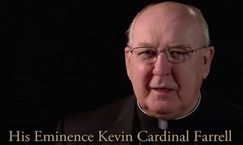
Cardinal Kevin Farrell – prefect of the Dicastery for Laity, Family and Life – has for the first time publicly defended his decision to deny a group called “Voices of Faith” from holding its fourth annual Women’s Day event inside the Vatican as it had done the previous three years. At a book launch on Thursday in a conference center at Jesuit headquarters in Rome, the cardinal seemed to suggest that the women’s group had de facto announced his sponsorship of their event before telling him specifically what it was about and who would be speaking. Ironically, he made his comments in the very room where the international women’s group will now hold its March 8 gathering. Early last month officials from “Voices of Faith” revealed that the Irish-born cardinal, who has been in his current post at the Vatican since August 2016, had withheld permission for three people slated to speak at their event, including Ireland’s former president, Mary McAleese....(Source) Photo: La Croix International
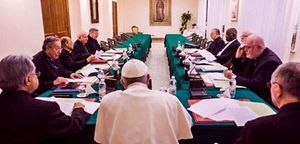
Extract from Junno Arocho Esteves, Catholic News Service, Melbourne Catholic, Thursday 1 March 2018
Pope Francis and his international Council of Cardinals discussed the possibility of establishing regional tribunals around the world that would judge cases of sexual abuse allegedly committed by clergy, the Vatican spokesman said. Greg Burke, the spokesman, confirmed a report published 27 February on the website Vatican Insider that said the pope and his cardinal advisers were considering decentralising the role of the Congregation for the Doctrine of the Faith in handling cases, but would not diminish the congregation's authority. ‘I can say that this is one of the options. The pope himself spoke about this in one of his press conferences,’ Burke told journalists 28 February. The Council of Cardinals, often referred to as the C9, held its first meeting of the year from 26-28 February with Pope Francis. The pope appointed the council members five years ago to advise him on the reform of the Roman Curia and on church governance. During his flight to Rome from Fatima last May, Pope Francis spoke to reporters about the possibility of establishing regional tribunals. The Congregation for the Doctrine of the Faith, the pope told journalists, was overwhelmed with ‘many delayed cases because they have been piling up.’ He added that discussions on the regional tribunals were ‘in the planning stage.’ ‘For this, we are thinking of providing continent-wide assistance, one or two per continent. For example -- in Latin America -- one in Colombia, another in Brazil. They would be continental pre-tribunals or tribunals,’ he said. According to Vatican Insider, the establishment of regional tribunals also would resolve the complication of dealing with cases in various countries with different laws and customs, thus allowing for a faster process in examining those cases. Burke emphasized that if established, regional tribunals ‘would always be under’ the authority of the doctrinal congregation. The Vatican spokesman said the council also discussed the role of bishops' conferences and ways the conferences could contribute to discussions on theological issues in a more collegial spirit. Pope Francis, in his 2013 exhortation, ‘The Joy of the Gospel,’ had written about the need for a greater role for bishops' conferences, asserting that ‘excessive centralisation, rather than proving helpful, complicates the church's life and her missionary outreach.’....(more) Photo: Melbourne Catholic (archive photo)
Extracts from Media and Communications Office, Melbourne Catholic, 28 February 2018
Roughly 600,000 non-for-profit (NFP) organisations exist in Australia, supported by 4.6 million Australian volunteers. As the size and complexity of NFP organisations has grown, so has the importance of good governance, explained Elizabeth Proust AO, during an afternoon workshop as part of the CSS Hearing Healing Hope conference. Proust is one of Melbourne’s leading business figures. With a mix of public sector and business experience, Proust has played key roles in developing and leading organisations, including as Chairman of the Australian Institute of Company Directors (AICD), Secretary of the Victorian Department of the Premier and Cabinet, and Chief Executive of the City of Melbourne. Proust explored the range of emerging issues facing NFPs, particularly around trust, company culture, and refining governance practices. ‘In Australia, trust in institutions is in decline,’ Proust said. In the last year alone, trust in government has fallen eight percentage points from 45 per cent to 37 per cent. Trust in the media has fallen to 32 per cent. Across all sectors for the last five years, trust has been falling. Trust is key to any organisation’s success, but trust is the non-for-profit sector ‘is absolutely vital’, says Proust......Given the decline in trust, the need for greater accountability and changes in regulation, the area of corporate governance is rapidly evolving. Responding to these forces, governing boards now look much different and much leaner than they might once have. ‘Boards have got smaller, and now a good board will look for someone who has a range of skills.’ Today boards are looking for strategic thinkers, and people who understand the people dynamics of an organisation, she explained. ‘Add an overlay of diversity on top of that, and not just gender, and boards are starting slowly to look different. The good ones look for much more than just the hard skills.’ Further, directors and board members will be more valued for their relevant skills rather than passion for the cause. Given there’s an overall demand for better governance and more accountability and transparency, in larger NFP organisations, boards are progressively becoming more professional including engaging directors with relevant experience and providing governance training for them. Ultimately more will be demanded of directors and NFPs will respond by making sure their directors become more professional....(more)
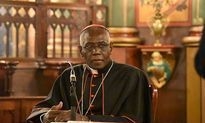
He is a reform-of-the-reform partisan, who believes that things went badly wrong in the implementation of the Vatican II reform of the liturgy
Limited extract from Rita Ferrone, La Croix International, 28 February 2018
In an arena where, arguably, the most important thing he could do is to encourage charity and an irenic spirit toward various forms of Eucharistic piety, Cardinal Robert Sarah, Prefect of the Congregation for Divine Worship, has once again demonstrated that what he really does best is sow division. He did it concerning washing women’s feet on Holy Thursday (delaying more than a year in fulfilling Pope Francis’ request). He did it by urging that altars be turned around so that Mass would be celebrated with the priest’s back to the people (for which he was reprimanded). He did it by minimizing and misinterpreting the pope’s initiative on liturgical translation (prompting a public correction from the pope). Now, he is sowing division concerning how communion is received. In a preface to a new book, the cardinal rages about offenses against the Eucharist. He fulminates over Satanism and black masses, and then — astonishingly — links these phenomena with receiving communion in the hand. He evaluates this liturgical practice as pure evil, a tool in the hand of Satan, promoting unbelief. Those who take communion in the hand are on the side of Lucifer in the great cosmic struggle of good against evil, Sarah claims. They are opposed to Michael and all the angels. If you think I am exaggerating, see for yourself. Here are his own words....(source). Photo: Cardinal Sarah 2 (La Croix International, François-Régis Salefran)
Extract from The Tablet, 28 February 2018
Pope Francis and his group of cardinal advisers are examining proposals over how to speed up the Church’s handling of priest sex abuse cases. One option being considered by Francis' cabinet - known as the C9 - is the creation of courts around the world to help deal with a huge backlog that has overwhelmed the Vatican’s Congregation for the Doctrine of the Faith, the body that deals with them. The proposal for the new tribunals would see them work under the direct supervision of the Vatican and would help tackle the 1,800 cases still waiting to be processed. C9 member Cardinal Sean O’Malley, the Archbishop of Boston and the president of the Pope’s child protection commission, has now been tasked to work on the proposal. During a lunchtime briefing with reporters on Wednesday, Vatican spokesman Greg Burke explained the creation of courts was one of the proposals being considered and that the prime objective is reducing the time that cases take....(more)
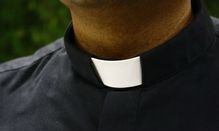
Extract from Andrew Hamilton, Eureka Street, 27 February 2018
In the Catholic Church clericalism is now the whipping boy of choice. But what it embraces is less clear. It is a pejorative word, used by people of others but never of themselves, and is normally defined ostensively by reference to examples of it. We know who is a clericalist even if we are not sure what he is. So it is worth pausing to reflect on clericalism and its significance for church and society. Although clericalism is rarely defined, it is possible to reconstruct a perfect case of clericalism by enumerating the various attitudes and practices that critics find fault with. The perfect clericalist always dresses formally in a style that identifies him clearly as a Catholic priest. He is also formal in address, addressing and speaking of other priests as father and bishops as my lord. He insists, too, that others address him as father or my lord. His pastoral relationships with laypeople are formal and asymmetrical. This asymmetry is based on a strongly hierarchical understanding of the Catholic Church in which authority and power are centralised in bishops and local power in the priest. Boundaries both within the Church and between the Church and the surrounding world are clearly marked out by clear and binding rules governing Catholic allegiance. It is the job of the priest to insist on and police them. The interest of the perfect clericalist is narrowly focused on the internal relationships, practices and customs of the Church, and particularly on the conduct of worship of which he sees himself as custodian. He shows little interest in the outside world except when he sees it intruding on the rights and freedom of the Church. His conversational style is didactic. He does not easily engage in dialogue, and is more comfortable issuing authoritative judgments and final decisions. Common to these traits is the urge to control — to have self control, control in relationships, control over the beliefs and practices of his congregation, over the language of faith, and over boundaries....(more) Photo: Eureka Street
Sadly, our celebration of the Eucharist or Mass, that has been so greatly ritualized, remains exclusive in many ways
Limited Extract from Virginia Saldanha, Mumbai, subscriptiopn Journal La Croix International, 27 February 2018
India. On Maundy Thursday, which this year falls on March 29, Catholics commemorate how Jesus instituted the Eucharist by offering himself as the "bread of life." (Jn. 6:35). We Catholics believe the frequent reception of the Eucharistic bread, which is transformed into the body of Christ at the altar of Mass, enhances our spiritual health. But this enhancement is subject to certain conditions, just as material food to benefit our physical health is subject to what we eat and how we eat it. Without fulfilling the essential conditions, the reception of the Eucharist alone will not provide us the "abundance of life" (Jn.10:10) that Jesus has destined for us. There are similarities between the Eucharist and the material food we eat. As a theologically trained Catholic mother, I see the dining table as having the innate capacity to enhance the Eucharistic experience....(more)
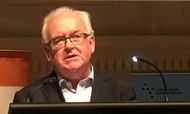
Eureka Street Staff 26 February 2018
'Instead of a church walking humbly with its God, it found an arrogant church, that placed its own reputation above the interests of victims, and did so knowlingly in a way that would cause further harm to many of those victims.' Robert Fitzgerald of the Royal Commission into Institutional Responses to Child Abuse addresses the Catholic Social Services annual conference in Melbourne, February 2018. LISTEN Photo: Eureka Street
Who will be the next Bishop of the Diocese of San Bernardino?
Extract from Inland Catholic Byte, Diocese of San Bernardino, 23 February 2018
With his mandatory retirement just two-and-a-half years away, Bishop Gerald Barnes used this year’s Combined Vicariate meetings to ask the leadership and staffs of diocesan parishes to ponder this question. As part of his keynote talk, Bishop Barnes explained the formal process of how a new bishop is chosen for a diocese when the existing one retires. While the ultimate decision of the next Bishop of San Bernardino rests with the Holy Father, there is a multi-layered process of consultation in the selection of a new bishop. Bishop Barnes invited the faithful of the Diocese to be part of it. “You have a say,” he said. “I’m proposing that before I send anything to Rome, that I consult with the parishes. In the next few months we’re going to come up with a tool to do that.” Bishop Barnes tied the consultation on the next bishop into the celebration this year of the 40th Anniversary of the Diocese. He asked parishes to look back and learn about the history of the Diocese, to assess both its strength areas and challenges, and, finally, to identify what qualities will be needed in the next bishop. “We need to do this a very transparent, honest way,” he said. Some specific questions to guide these parish discussions will be provided to the parishes in March....(More).

Extract from CathNews, MelbourneCatholic.org.au, 20 February 2018
The #MeToo global movement presents an opportunity for the Church to engage in important issues of gender equity and justice, says the head of the National Office for Participation of Women. Andrea Dean, Director of the Office established by the Australian Catholic Bishops to promote the participation of women in the Church, says the situation offers a chance to revaluate the shifting role of women in the Church. “Narratives about one group of powerful people exploiting another group can open our eyes to understand the call to justice more clearly,” she says. “The #MeToo movement is a gift to society as it brings hidden abuse into the light in the same way that the Royal Commission into Institutional Responses to Child Sexual Abuse is gift to the Catholic Church as it has brought hidden abuse into the light.” Ms Dean says this stretches far beyond sexual abuse and harassment, and concerns systemic abuse of power, something the Church is dealing with in the wake of the royal commission. “It is apparent that the Catholic Church’s problem is not so much the sexual exploitation of women, but the abuse of power,” Ms Dean says. “This abuse of power has damaged the lives of too many children. “Some women in the Catholic Church — though certainly not all — feel that the intractable link between ordination and power sets up a disparity between ordained men and lay women that fosters injustice and exploitation. “These are legitimate concerns and addressing them will no doubt take time. For the Church to remain relevant throughout this movement and beyond, it should aim for parity where there has been a disparity. This would mean equal numbers of women in leadership positions, and some degree of transparency in pay scales to eliminate the possibility of a gender pay gap.”....(more) Photo: CathNews, Shutterstock
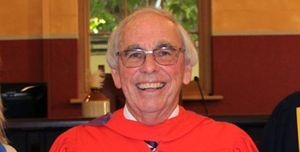
Extract from CathNews, Truth Justice and Healing Commission, 19 February 2018
Neville Owen, chair of the Truth Justice and Healing Council, is one of eight new members appointed to Pope Francis’s renewed clergy sexual abuse commission.
The 17-member Pontifical Commission for the Protection of Minors, headed by Boston Cardinal Sean O'Malley, is the Pope’s peak advisory body on clerical sexual abuse and child protection issues. Mr Owen is a former senior judge of the Court of Appeal of the Supreme Court of Western Australia. Francis Sullivan, chief executive of the Truth Justice and Healing Council, said the appointment of Mr Owen to the commission was significant and insightful. “Having worked with Neville for more than three years in his capacity as Chair of the TJHC I am confident he will bring unique insights and experience to the commission," Mr Sullivan said. “There are few people, anywhere in the world, who have both a deep understanding of the Catholic Church and of the clerical child sexual abuse crisis which has had such an impact on it over the past decades.”...(more) Photo: CathNews, The Record Neville Owen The Record.
Extracts from Joshua J. McElwee, Vatican, National Catholic Reporter, 17 Feb 2018
Pope Francis renewed the mandate of his clergy sexual abuse commission Feb. 17, two months after the group's lapse into an inactive state led some survivor advocates to question whether protecting children was being given the highest priority in the Catholic Church. The pontiff reappointed eight of the previous members of the Pontifical Commission for the Protection of Minors and added nine new people to its ranks. Boston Cardinal Sean O'Malley returns as the president of the group, and Boston priest Msgr. Robert Oliver returns as its secretary. While none of the members of the commission are publicly known as abuse survivors, the group said in a statement that some of them are survivors who have yet to publicly identify themselves. The commission said it "believes that their privacy in this matter is to be respected." Six former members of the commission were not reappointed by Francis, including some of the best known figures in the group, such as: French psychotherapist Catherine Bonnet, British Baroness Sheila Hollins, New Zealand church official Bill Kilgallon, and religious congregation advisor Krysten Winter-Green. Marie Collins, an Irish abuse survivor who resigned from the commission in frustration last March, told NCR some of those not reappointed were among the group's most active members.....The three-year mandate of commission members had lapsed Dec. 17. Francis' appointment of new members to his advisory body comes as he is facing some of the heaviest criticism of his papacy over his handling of accusations against a Chilean bishop accused of covering up abuse while he has a priest in the 1980s and 90s. After decrying the accusations as "calumny" last month, the pope made an about-face Jan. 30 and sent Maltese Archbishop Charles Scicluna, one of the church's most respected investigators of clergy abuse, to examine the survivors' claims......The abuse commission has come under increasing public scrutiny since its creation by Francis in March 2014.....(more) [Ed: Nine new members include Australian Justice Neville Owen, Chair of the Truth Justice and Healing Council]

Pope Francis reveals his near weekly meetings with sex abuse victims
Limited Extract from Robert Mickens, Vatican City, subscription journal LaCroix International, 16 February 2018
It was revealed this week that Pope Francis, unbeknownst to the public and even most Vatican officials, has been holding regular and extremely private meetings with people who were sexually abused as youngsters. “I can confirm that, numerous times a month, the Holy Father meets victims of sexual abuse either individually or in groups,” said Greg Burke, director of the Holy See Press Office. “The meetings are held in complete privacy out of respect for the victims........(source)
Extract from Australian Catholic Bishops Conference, Friday 16 February 2018
Religious freedom must be enshrined in Australian law and recognised as a right, rather than an exception or an exemption, the Australian Catholic Bishops Conference (ACBC) has explained. In its submission to the Religious Freedom Review called by Prime Minister Malcolm Turnbull and chaired by the Hon Phillip Ruddock, the ACBC has tasked the Review to recognise the increased need for a framework to support all people of faith as Australian society continues to evolve. Joining a group of lay Catholic leaders with expertise in health, education and law, Broken Bay Bishop Peter Comensoli will next week represent the ACBC at a hearing before the Expert Panel on Religious Freedom to make the argument for an Australian society that upholds the protection of religious freedom of its people. ‘Australia is a pluralist society and inherent to this welcomed diversity is the holding of different worldviews and beliefs. The challenge of how to accommodate these different perspectives, without excluding or discouraging views from people who have a religious faith, is one of the great tasks of our current generation,’ Bishop Comensoli said. The ACBC submission says the Religious Freedom Review ‘is a timely opportunity to consider whether Australia’s laws need to be updated to ensure all Australians continue to enjoy freedom of thought, conscience and religion, and the accompanying freedom of association’....(more)
Extract from John Warhurst, Canberra Times. 15 February 2018
The Catholic Church is a wealthy institution, but Archbishop Anthony Fisher is right that to compare its type of wealth to that of Westfield or Wesfarmers is crude and simplistic. Nevertheless, that wealth, however calculated, stands in stark contrast to the resistance and mean-spiritedness that, it has now been demonstrated beyond reasonable doubt, has characterised its leaders' treatment of those who were sexually abused while in the church's care. This injustice has compounded the crimes that happened on its watch and its criminal cover-ups. Most of the victims were Catholics themselves at the time. There is another disjunction that troubles many Catholics. The rhythm of church life experienced by most ordinary Catholics is not one of great wealth, but of local fund-raising and donations to church causes. This month, there are two major church-related campaigns: the Vinnies annual doorknock appeal and the Project Compassion annual Lenten appeal to support the church's international aid and development arm, Caritas Australia. Last year, Project Compassion raised $359,000 in Canberra-Goulburn alone. This disjunction between the hurt that has been done under the church's name and the demands made on ordinary Catholics is one reason for the growing bewilderment and lack of trust that is now sweeping the church. The National Church Life Survey, conducted across 20 denominations, has reported that 48 per cent of Catholic respondents agreed (only 34 per cent disagreed) that sexual abuse by clergy had damaged their confidence in church authorities. In the past, Catholics were mainly loyal and hard-working subjects rather than informed and vocal citizens within their own church. Bewilderment and lack of trust is now turning belatedly to activism and demands for renewal of church governance and structures, as well as for the transparency and accountability rightly demanded by the community at large. It remains to be seen whether the church's authorities are really listening....(more)

Truth Justice and Healing Council chief Francis Sullivan says the federal and state governments have "failed miserably" in advancing the establishment of a national redress scheme for survivors of institutional abuse. Extract from CathNews, Source: TJHC, 16 February 2018
The council has called for a separate Council Of Australian Governments (COAG) committee to urgently consider the issues currently blocking the redress scheme a national redress scheme, after the February 9 COAG meeting failed to deliver progress. “Despite the Prime Minister’s rhetoric the day before, which gave some indication that the COAG meeting might deliver something, as it turns out redress for child abuse survivors hardly got a look in," Mr Sullivan said. “The COAG agenda was heavily committed, and I’m sure all the issues for discussion were worthy,” Mr Sullivan said. “But it was disappointing to see the outcomes from the discussion on a national redress scheme warranted just one paragraph. And beyond this there was no further insight into how the stalemate currently facing the states and the federal government might be resolved. Mr Sullivan said the a dedicated COAG committee should urgently focus on having the national redress scheme ready to begin on July 1. “Politicians have been dodging this issue for far too long. They have had the [royal] commission’s redress report for well over two years. All the talk about support for the commission from state and federal leaders means nothing unless survivors see some action,” Mr Sullivan said. The council’s submission to the Senate Community Affairs Legislation Committee’s inquiry into the Commonwealth Redress Scheme for Institutional Child Sexual Abuse Bill 2017 notes the bills currently under consideration will not deliver a scheme which operates nationally. As presently understood, the ability of non-government institutions, including Church authorities, to opt in to the scheme is limited as no state government has chosen to participate.....(more) Photo: CathNews

Extract from Fr Noel Connolly, Columban eNewsletter, 15 February 2018
The Australian Bishops at their November meeting decided that the Plenary Council will be held in two sessions, one in October 2020 around the tenth anniversary of Mary Mackillop’s canonisation and the second in May 2021. One of these sessions will be held in Central Australia and the other in one of the major cities on the East Coast. In the next few months, the Facilitation Team and the Executive Council will prepare a website, social media access, a Plenary Council logo and prayer, a survey [online and on paper] and other instruments to ensure that all Catholics can be consulted in as full, free and productive way as possible. Meanwhile, the Bishops are to appoint working groups to ensure that the people in their dioceses, parishes, schools, health care and social welfare facilities can be involved. The official launch will be on Pentecost Sunday 2018. That will begin a year of consultation through diocesan and parish meetings, family conversations, facilitated community discussions, meetings with schools, health care, social welfare agencies, with aboriginal groups, the poor, listening sessions with the bishops and so forth. There will also be consultation and reporting back through the website, discussion through social media, and other ways. The hope is that many Catholics, active and disaffected, will take the opportunity to help plan the future of our Australian Church. After Easter 2019 we will try to review and consolidate what has been said in the hope of beginning a second phase of consultation and prayerful discernment after Pentecost 2019. Early in 2020 the main issues and directions should be clearer and we can.......(more) Fr Noel Connolly SSC is a lecturer in Missiology at both the Broken Bay Institute and the Catholic Institute of Sydney. He is also a member of the Adult Formation Team with Catholic Mission Australia and has recently been appointed by the Australian Bishops to the Facilitation Team for the Plenary Council 2020.
Currently Trier Diocese has 172 parishes but this number will be reduced to 35 by the end of 2020
Limited extract from Delphine Nerbollier, Berlin, subscription journal La Croix International, 15 February 2018
To the surprise of many local priests, the Diocese of Trier has launched a sizable reform plan. Located in Germany’s west on the border with France, Luxembourg and Belgium, the diocese is the country’s oldest with 1.5 million Catholics out of a total population of 2.5 million. Currently it has 172 parishes but this number will be reduced to 35 by the end of 2020....(source)
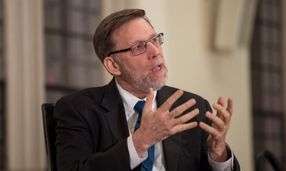
Extract from Charles C. Camosy interview with Richard Gaillardetz, Crux, 14 February 2018
...One of the more daunting challenges facing the Church today comes from many young adults, in particular, for whom the idea of adhering to a normative religious tradition appears both unnecessary and irrelevant to their lives. The Church needs to offer an account of its tradition that makes evident the authentic human flourishing that tradition makes possible while affirming the value of questioning, doubt and disagreement. Such an account might build on the biblical metaphor of Jacob’s wrestling with an angel in the book of Genesis to propose what it might mean to “wrestle “with the Church’s normative tradition....(more) Photo: Crux, Gaillardetz.com

After a Rome-sanctioned bishop agreed to stand aside, the only impediments to an agreement are two bishops with families
Limited Extract from Michael Sainsbury and ucanews.com reporters, Subscription journal La Croix International, Hong Kong, China, 13 February 2018
The Vatican appears to have cleared the ecclesiastical decks for a deal with China's ruling Communist Party after one of two bishops at the center of a dispute over the Sino-Vatican agreement was reported to have promised to step down and make way for a bishop appointed by Beijing. The final hurdle for the Holy See now appears to be recognizing two bishops, appointed by Beijing without Rome's approval, who are widely understood to have familial arrangements including long-term partners and children. After sacking Bishop Zhuang Jianjian in December, no Vatican-appointed bishops stand in the way of a deal that would see the Holy See give its imprimatur to five bishops appointed by Beijing whose dioceses do not have Vatican appointees in charge of the....(source) Photo: La Croix International, Bishop Vincent Guo Xijin
Extract from Peter Johnstone, Pearls and Irritations, John Menadue website, 13 February 2018
“The bond of trust between the laity and their bishops has been severely impaired…a serious erosion of trust in the hierarchical leadership of the church’’.- leading Australian Catholic theologian Professor Neil Ormerod of the Australian Catholic University in Fairfax papers on Sunday 11 February 2018. Many Catholics have become demanding of their Church leaders following the starkly inadequate responses of the Australian bishops to the findings of the Royal Commission on Institutional Responses to Child Sexual Abuse. It is remarkable that the bishops have focussed on processes and procedures, basic changes that did not need a Royal Commission, while failing to address the culture of unaccountable clericalist leadership exposed by the Commission – the actual basis of the cover up and protection of paedophiles. Inexplicably, that culture of unaccountable clericalist leadership seems to be continuing in the bishops’ response to the Royal Commission. They possibly hope that their focus on the horror of the statistics and the condemnation of paedophiles will distract the faithful from the moral and criminal failings of the Church’s leadership and governance. The bishops are perhaps stunned by the Royal Commission’s terrible finding that the Catholic Church accounted for more than 60 per cent of all abuse survivors who reported sexual abuse in a religious institution. But are they so stunned, like rabbits in the headlights, that they are unable to face the dysfunctional governance and urgent reforms identified by the Royal Commission? The hierarchical leadership of the church has seemingly ignored the Commission’s key findings that the Church’s dysfunctional governance aggravated the harm done by paedophile priests and religious. The faithful have not been so easily distracted....(more)

The Return of Catholic Anti-Liberalism
Limited extract from Massimo Faggioli, subscription journal Commonweal, 12 February 2018
One of the most troubling developments in the current debate on religion and politics is the renewed characterization of liberal democracy as a bigger threat to Christian morality than any other political system. This is not just a return of the old legitimist doctrine that nondemocratic systems and monarchies are more Christian than democracies; rather, it’s a general crisis of the theological-political alignments of the twentieth century. Catholic anti-liberalism is trying once again to cast serious doubts on the idea that democracy and Christianity are even compatible. This is a sign that what Ross Douthat has called “the John Paul II synthesis” is in crisis, while demonstrating as well that John Paul II was not a neo-conservative pope. In Tertio millennio adveniente (1994), his apostolic letter introducing the church to the third millennium, John Paul II wrote that “the Second Vatican Council is often considered as the beginning of a new era in the life of the Church. This is true, but at the same time it is difficult to overlook the fact that the Council drew much from the experiences and reflections of the immediate past, especially from the intellectual legacy left by Pius XII” (italics in the original). In that legacy there is also Pope Pius XII’s radio message of December 1944, what French historian Jean-Dominique Durand has called the pontiff’s “baptism of democracy.” Delivering it on the eve of the last Christmas during World War II, Pius XII said:.....(more) Photo: Commonweal
The decision whether to canonize a pope is always a question of ecclesial policy, related to the current pontificate
Limited extract from Gauthier Vaillant, subscription Journal La Croix International, 10 February 2018
With the Holy See shortly set to announce the canonization of Pope Paul VI, this two-part series explores the phenomenon of recent popes being canonized. In this final installment, Gauthier Vaillant interviews Philippe Chenaux, professor of the history of the modern and contemporary Church at Lateran University, Rome, to explore if this trend is becoming a bit too automatic. I can understand that many people feel that canonizing recent popes is....(source)
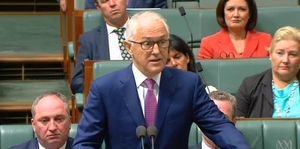
Extract from ABC News, 8 February 2018
Malcolm Turnbull will deliver an apology to survivors of child sexual abuse by the end of this year, and is urging states to join a redress scheme recommended by the Royal Commission into Institutional Responses to Child Sexual Abuse. The Prime Minister announced to Parliament this morning abuse survivors would be consulted to ensure they were comfortable with the way the apology process is handled. The royal commission's report was released late last year after a four-year inquiry, and found tens of thousands of children had been sexually abused. It found the abuse happened in almost every type of institution, including church-run bodies, as well as schools and places run by sporting and cultural groups. Mr Turnbull said the survivors had relived the worst moments of their lives when they gave evidence — often telling their stories for the first time — so that the abuse would "never be allowed to happen again". "Now that those stories have been told, now that they are on the record, we must do everything within our power to honour them," he said. Mr Turnbull also used his speech to Parliament to warn the states and territories to act quickly so a national redress scheme could be set up by July 1....(more) Photo: ABC
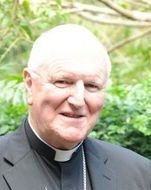
Dear Friends, Lent is a time for ‘Spring cleaning’ in our souls. We move the furniture in our life, take down the curtains, wash the windows and create space by removing what clutters our daily lives. It is not just a matter of getting rid of mess. It is rearranging things, finding ways to create more room, a better space. We see ourselves differently and make more room for God. During the holy season of Lent we open our hearts and minds to a fresh, deeper, fuller awareness of God within us, around us: a deeper awareness of God's will for us. We are each called to spend extra time in prayer and to confess our sins honestly to Christ in the Sacrament of Penance. Lent reminds us forcefully that we will be judged at our death and must give an account of our life. Yet death is such a taboo subject in our culture. Some treat it as a ’problem’ that can be 'solved' and legislated about. But Lent reminds us we must ponder deeply its stark reality. During our life on earth we struggle to protect our future with bank accounts, credit cards and investments. We protect the future with health plans, life insurance, social security and retirement plans. There is nothing wrong with that. But the statistic on death has not changed. It is still one per person. There comes a moment when no amount of cash or plastic or investment protects us. We die. No human support goes with us to the grave. Human companionship stops at the tomb, and we enter alone, except that the Lord goes with us. Because of his dying and rising to new life, the Lord is with us at death, through death, and takes us to the other side to share in the transformed life which God has prepared for us. This is why we could wear ashes on our forehead for four weeks and say "dust to dust" without being morbid. We were entering into the dying and rising of Christ. So this Lent please fast, pray, and give alms. When we reduce our intake of food we discover what it is like for so many in our world to go hungry all day. We reflect more deeply about life… and death. When we pray more intensely, our mind opens up to wider horizons. When we give things away and support Project Compassion, we create more space in our lives, more room for God, and we realise how much we depend on God . And during this Lent of 2018 we have a special duty. At every Mass we pray ‘through my fault, through my most grievous fault’, and the recent Royal Commission has indeed highlighted the evil and sins that have done so much damage to children, families and all of the Body of Christ. I urge each of you this Lent and beyond to pray and act for healing for all victims. I commit our Church once again to the sacred vocation of ensuring such terrible evils are never again inflicted on Christ’s ‘little ones”. Yes, let us pray for the grace of repentance. Christ’s message is demanding, but let us never forget, it is our Good News and salvation!....(More, including a link to the Pastoral Letter)

Extract from CathNews, 8 February 2018
As the inaugural chief of Catholic Professional Standards Limited, Sheree Limbrick says she will know she is doing her job when children and vulnerable people know where to go when something is not right. Source: The Southern Cross. “My concern is not whether the bishops and religious leaders are happy with the job we’ve been doing, it’s about whether children and vulnerable people can get a message to me that says ‘yes I feel safe in our communities’,” Ms Limbrick told representatives of the Adelaide Archdiocese during a visit to South Australia recently. Catholic Professional Standards Limited (CPSL) is a new independent company established by the Church in Australia in November 2016 to develop, audit and report on compliance with professional standards across Catholic entities. Appointed CEO in July 2017, Ms Limbrick most recently worked with CatholicCare Melbourne as deputy CEO and has managed statewide programs for Berry Street, a service provider for vulnerable children and families across Victoria. She said CPSL was “functionally independent” from the Church and as such was a new model. Its mission was to “promote the dignity and welfare of all persons who come into contact with the Church and its work, especially its young and vulnerable”. The aim is to change culture through four key areas: awareness, accountability, consistency and compassion. “Critical to the implementation of the CPSL Standards is that Church leaders should be accountable for the activities under their jurisdiction,” she told the diocesan gathering.....(more) Photo: Cathnews, The Southern Cross Sheree Limbrick The Southern Cross
Extract from Tom Heneghan, Religion News Service, World, National Catholic Reporter, 5 February 2018
One of Roman Catholicism’s most influential cardinals has signaled cautious support for Catholic priests to bless same-sex couples, indicating movement on the issue after he and other German Catholic leaders opposed the legalization of "marriage for all" last year. Cardinal Reinhard Marx, the archbishop of Munich, said in a radio interview Saturday (Feb. 3) that the Catholic Church must find pastoral ways to respond to the challenges of changing societal views and should be welcoming to gay people who seek its spiritual guidance. Marx stopped short of a full endorsement of blessings for same-sex couples, which would be difficult in a church that opposes gay marriage as unnatural and does not now officially bless these couples. But his positive comments made it clear he was open to approving such benedictions in private ceremonies. Two German bishops have recently come out in favor of blessing same-sex couples and urged the church to consider allowing the practice. Marx, as head of the national bishops' conference, is the top Catholic prelate in Germany....(more)
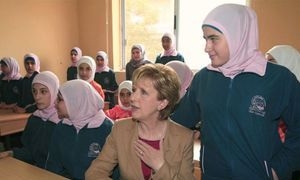
Organizers move conference outside the Vatican, make former Irish President Mary McAleese keynote
Extract from Sarah Mac Donald,Vatican, National Catholic Reporter, Feb 2, 2018
Dublin — An attempt to stop a former president of Ireland from speaking at an international conference on women's rights, which was due to be held in the Vatican next month, is causing a stir in Ireland as the country prepares to host the Vatican-organized World Meeting of Families in August. The Voices of Faith conference has been held at the Vatican on March 8, International Women's Day, the last four years. Organizers say when the Vatican reviewed the list of speakers for this year's event, three speakers were not approved, one of them Mary McAleese, who was president of Ireland from 1997-2011. Cover Death eBook small.jpgDownload this complimentary eBook from our sister publication, Celebration. Chantal Götz, managing director of Voices of Faith, said that Cardinal Kevin Farrell, the prefect of the Vatican's Dicastery for Laity, Family and Life, had objected to the three speakers. No reasons were given, according to Götz, but McAleese has been outspoken on gay rights and women's ordination. The matter has gained extra attention because Farrell's dicastery is the main organizer of the World Meeting of Families, which is being promoted as a major event for the Irish church. Dublin Archbishop Diarmuid Martin distanced himself from controversy, issuing a statement Friday saying neither he nor his offices "were consulted by the Vatican in relation to this matter." Neither Farrell nor the dicastery responded to requests for comment. The Voices of Faith conference will now go ahead at a venue outside the Vatican, and organizers have made McAleese the keynote speaker in a gesture of solidarity. She had previously been asked to take part in a panel discussion at the event. McAleese, who has studied for a doctorate in canon law at the Gregorian University in Rome, has written to Pope Francis about the situation. In a statement on Friday, she said she would not make any further comment on the matter as she was waiting to see if the pope responds to her letter....(more) Photo: NCR, RNS/AP Mohammd Zaatari
Unresolved issues that plague an extraordinary pontificate
Limited extract from Robert Mickens, Letter from Rome, subscription journal La Croix International
Clergy sex abuse and women in church and society
Unresolved issues that plague an extraordinary pontificate
One of the most remarkable characteristics of Pope Francis is his capacity — demonstrated throughout his lifetime — to carefully listen to viewpoints different from his own and, in the end, be willing to change his mind and even entire way of thinking about a particular issue. This is all the more notable for a man in his 80s, a time of life when most people are already deeply set in their ways and not exactly receptive to opinions that threaten their own well-established certitudes. But on at least two important issues that pose a challenge to the Roman Church’s credibility and its future, many Catholics feel Francis has been less willing to listen to other points of view. More precisely, they see him dragging his heals as others try to force him to deal with these items. The first issue is the worldwide clergy sex abuse scandal, most specifically how to hold to accountability those bishops who have ignored, attempted to hide or failed to report such clerical crimes. The second is the role of women in church and society, specifically how to address the injustice of a global Catholic community (especially the Vatican) that continues to treat women largely as second-class members and excludes them from almost of all of the church’s most important decision-making positions and structures.....(source) Photo: La Croix International.
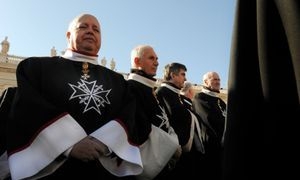
Extract from Christopher Lamb The Tablet, 1 February 2018
Pope Francis has told an elite section of the Order of Malta to stop admitting new members until reforms have been carried out, while declining a request from those knights to hand them greater control of the organisation. The move comes just over a year after the Grand Master of the order, Fra’ Matthew Festing, resigned following a public stand-off with the Pope and an unprecedented intervention by the Vatican. It resulted in the election last April of Fra’ Giacomo dalla Torre del Tempio di Sanguinetto who took over as interim leader with a brief to reform the 11th century organisation, a religious order that combines a vast global charitable enterprise with a byzantine governance structure. Knights from across the world are due to gather in Rome next week for a major summit on planned reforms. But Fra’Giacomo is now grappling with a bid by a small group of knights to gain more power over the order. This emerged in a letter written on 16 December by the knight’s Grand Commander, Fra’ Ludwig Hoffman von Rumerstein, to Francis. It was sent without consultation with the order’s governing body....(more) Photo: Order of Malta, The Tablet.
Extract from Media and Communications , Melbourne Catholic, Wednesday 31 January 2018
In an attempt to curb foreign political influence, in December the federal government has announced an overhaul of espionage and intelligence laws. Proposed new laws will ban foreign political donations and anyone attempting to influence federal politics on behalf of other nations will be forced to declare exactly who they are working for. ‘Foreign powers are making unprecedented and increasingly sophisticated attempts to influence the political process, both here and abroad,’ Prime Minister Malcolm Turnbull told the ABC last year. Australian bishops have expressed concerns about new laws that could force Catholics to register as agents of Vatican under foreign interference laws. Especially when it comes to political donations.....(more)

In a stunning move of the utmost importance, the Vatican today announced that Pope Francis has decided to send Archbishop Charles Scicluna of Malta to Chile to listen to the victims that accuse Bishop Juan Barros of being present when they were abused by the country’s most notorious predator, the Rev. Fernando Karadima, and of covering this up. The Vatican statement, issued in Italian and Spanish, said: As a result of some information received recently regarding the case of Monsignor Juan de La Cruz Barros Madrid, Bishop of Osorno (Chile), the Holy Father has decided that Msgr. Charles Scicluna, the archbishop of Malta and President of the College for the examination of appeals (“in materia delicta graviora,” “in matters of grave crimes”) in the Ordinary Session of the Congregation for the Doctrine of the Faith, is to go to Chile to hear those who have expressed their wish to submit elements in their possession. Sources told America that Francis made the crucial decision a few days after returning to the Vatican from his weeklong visit to Chile and Peru during which he had staunchly defended Bishop Barros against those who accused him of cover-up, saying they had not yet produced proof or evidence for such charges, and consequently the allegations can be considered “calumny.”
Until now Pope Francis has stood firmly by Bishop Barros...(more) Photo: Pope Chile Luca Zennaro Pool via AP
Extract from Roberty Mickens, Pearls and Irritations, John Menadue website, 23 January 2018
Pope Francis has been away in South America this past week and, while in Chile, he drew only modest crowds of supporters. It was the frostiest reception he’s received on any of his 22 foreign trips — at least to those countries with a majority of Christians and certainly in the traditionally Catholic lands of Latin America. Some say the 81-year-old pope got the cold shoulder because Chile is a highly secularized nation that has lost all confidence in the church and its ordained leaders. That’s only part of it. What the trip made glaringly clear is that, despite the support Francis has received for his many good and inspiring steps to restore evangelical credibility to the church and its mission, many people still see him as “all talk and no action” when it comes to the issue of clergy sex abuse — especially in holding accountable those bishops who tried to cover it up. The best-known case of this in Chile directly involves the pope and his unwavering support of Bishop Juan Barros Madrid, who has been accused of protecting one of the country’s most notorious abusing priests. Many Chileans were angered when the pope allowed the bishop to concelebrate at the largest public Mass of the papal trip. And while the surprising and touching wedding ceremony that Francis performed for two flight attendants during an inland flight on Thursday may have deflected attention from this for a fleeting moment, it is not likely to reassure the people of Chile — or many other Catholics from around the world — who continue to be disappointed and confused by the pope’s apparent inaction on sex abuse. This has long been the ugliest blot on his pontificate. And in the course of a few days it is now even uglier. Pope Francis’ credibility in dealing with sexual abuse has always been questionable, despite the many excuses and the positive “spin” his apologists and adulators have continued to put forth.....(more)
The bishop, the priest, and the sins of omission
Extract from Farrah Tomazin, The Age, 28 January 2018
On
a Winter evening in 2016, dozens of churchgoers gathered at a local
primary school in the NSW Riverina to bid farewell to the town's
most-senior religious figure Gerard Hanna had been the bishop of Wagga
Wagga for 14 years, a servant of God who led a diocese of 66,000
Catholics in 31 parishes. But here, in the refurbished sports stadium
at Henschke Primary School, Bishop Hanna was set to step down sooner
than expected, citing "continuous ill health" as the reason for his
early retirement. It was about two weeks before he was due to give
evidence at the Royal Commission into Institutional Responses to Child
Sexual Abuse. As the tributes flowed, few in the room would have
known that this church leader was harbouring a secret.....(more)

Mandate of the Bishops Commission for the Plenary Council
Extract from Preamble to New ACBC website "Plenary Council 2020", a website than promises "resources plus regular updates", 16 January 2018
At the conclusion of the Jubilee Year 2000, Pope Saint John Paul II encouraged the Church in his Apostolic Letter ‘Novo Millennio Ineunte’ (2001) to discern what the Spirit has been saying to the Church and to put into practice resolutions and guidelines for action that fit the context and culture of each place (§3). Reflecting on what the Spirit has been saying to the People of God, he exhorted “the Pastors of the particular Churches, with the help of all sectors of God’s People”, to plan for the future in a collegial way that harmonises among the dioceses the work of pastoral revitalisation (§29).
Pope Francis has encouraged and fostered the same collegiality among bishops and synodality throughout the whole Church. In his address last October commemorating the fiftieth anniversary of the institution of the Synod of Bishops, he stated: “A synodal Church is a Church which listens, which realises that listening ‘is more than simply hearing’. It is a mutual listening in which everyone has something to learn. The faithful people, the college of bishops, the Bishop of Rome: all listening to each other, and all listening to the Holy Spirit, the ‘Spirit of truth’ (Jn 14:17), in order to know what he ‘says to the Churches’ (Rev 2:7).” Speaking of Ecclesiastical Provinces and Regions, Particular Councils and Conferences of Bishops, the Holy Father went on to observe that, “We need to reflect on how better to bring about, through these bodies, intermediary instances of collegiality, perhaps by integrating and updating certain aspects of the ancient ecclesiastical organisation. The hope expressed by the [Second Vatican] Council that such bodies would help increase the spirit of episcopal collegiality has not yet been fully realised. We are still on the way, part-way there.”
The circumstances of the Church in Australia in our time, including the patterns of change that are evident within the community of the Church, the issues confronting the Church in modern multicultural and secular Australia, the increase in entrusting responsibility for and leadership of the Church’s mission to laity, and even the changing face of the Episcopate, prompt the Church to review, analyse, and discern the signs of the times, to listen anew to the Spirit, and to chart its course into the future.
Accordingly, the Australian Catholic Bishops Conference (ACBC) has decided to celebrate a Plenary Council for the Church in Australia in 2020.....(more) Image: Mark Votava
Extract from Kerry Weber, The Jesuit Review (U.S.), 16 January 2018
Coleen Heckner grew up immersed in Catholic culture. From her parents and her devout grandfather, who served as an usher in his parish, to the Daughters of Charity and the Sisters of Mercy, who educated her in grade school and high school, she was surrounded by examples of faith. A member of the Vatican II generation, she was influenced by St. John XXIII and became passionate about issues of social justice, in part because the peace activists Daniel Berrigan, S.J., and Phil Berrigan were among the speakers brought to her Baltimore classroom. “I grew up in a really neat time to have all these folks touch my life in some way,” she said. In the years that have followed, Ms. Heckner’s faith commitment has not waned. While working as a psychiatric nurse practitioner, she has attended Mass weekly and has been active in parish life, having served as a member of a parish council and a eucharistic minister to the homebound. Her adult son spent some time in seminary, and she enjoyed her visits there. She would love to be a deacon someday and has a devotion to Mary (“I’ve always believed if you want to get something done you give it to a woman”). In 2011 she earned a master’s degree in pastoral studies from St. Bernard’s School of Theology and Ministry in Albany, N.Y., which allowed her to serve as a chaplain resident at Albany Medical Center and now as a pastoral associate at a nearby nursing home. Her wealth of experience would seem to make her a natural role model for others looking to put their faith into action, but she shies away from the title. “I don’t see myself as a role model,” Ms. Heckner said. “I tend to work one on one behind the scenes.” Yet Ms. Heckner is, in some ways, just the type of person many Catholic women name when describing their models of the faith.....(more)
Pope Francis has not just unleashed the stifled energies of Vatican II, he is actually leading the effort to help the church enter into the new paradigm
Limited extract from Robert Mickens, Rome, subscription journal La Croix International, 12 January 2018
Cardinal Pietro Parolin this week put his finger on the single most important issue that has become the driving force of the small, but tenacious opposition to Pope Francis and his pontificate. It is the full-scale “paradigm shift” the pope is working so diligently to bring about within the global Catholic Church. That’s not exactly how the pope’s Secretary of State articulated it in a video-taped interview posted Thursday on the Vatican News website. But looking at the many changes and processes for change that Francis has set in motion since being elected Bishop of Rome in March 2013, the paradigm shift is definitely well underway. And this has caused some very influential people – both inside and outside the church – to be extremely worried. So what did Cardinal Parolin actually say? He actually used the word “paradigm” three different times in the recent interview conducted by the Holy See’s Secretariat for Communication. The first instance was in reference to the creative approach the Vatican is taking to prepare for next October’s meeting of the Synod of Bishops, which will discuss issues regarding today’s youth. “I believe the most innovative aspect to this approach is the search for a new relationship between the church and young people, based on....(source)

Extract from Junno Arocho Esteves, Melbourne Catholic, Catholic News Service, Friday 12 January 2018
When Pope Francis embarks on his fourth visit to South America, he will face the enormous task of restoring trust and encouraging healing after scandals in both countries left many wounded and angry at the Catholic Church. Pope Francis planned the trip 15-21 January to Chile and Peru as an opportunity to take a message of hope and comfort to people on the margins of society, particularly the indigenous people. The Vatican said on 10 January that Pope Francis followed the case ‘with concern’ and ‘insistently requested’ the congregation to act. Despite his actions to address the issue of sexual abuse in Peru, his decision to appoint a bishop accused of turning a blind eye to abuse drew outrage in Chile. The pope's appointment of Bishop Juan Barros as head of the Diocese of Osorno sparked several protests — most notably at the bishop's installation Mass — due to the bishop's connection to Father Fernando Karadima, his former mentor. Father Karadima was sentenced to a life of prayer and penance by the Vatican after he was found guilty of sexually abusing boys. Greg Burke, director of the Vatican press office, told reporters on 11 January that Pope Francis' formal schedule for Chile and Peru does not include a meeting with sexual abuse victims or with the people still protesting Bishop Barros' appointment. Sexual abuse is ‘clearly an important theme,’ Burke said, adding ‘the best meetings are private meetings.’...(more) Photo: Melbourne Catholic. (CNS photo/Pablo Sanhueza, Reuters)
Edited extract from SBS News,10 Jan 2018
A government-appointed panel set up to critique whether Australia's laws adequately protect religious freedom (has just met) for the first time in Sydney. The prime minister, Malcolm Turnbull, announced the review in the final month of the national same-sex marriage debate last year, amid pressure from some Coalition conservatives who wanted to see religious exemptions built into the bill to amend the Marriage Act. In the end, the so-called Smith bill to legalise same-sex marriage in Australia passed with no amendments. Mr Turnbull decided the panel would be led by Phillip Ruddock, a Liberal elder who served as a senior minister in the Howard government and is now the mayor of Hornsby in Sydney. Also on the panel are Jesuit prist Frank Brennan, former high-profile judge Dr Annabelle Bennett, Australian Human Rights Commission president Rosalind Croucher and constitutional lawyer Nicholas Aroney. The panel has been asked to make its recommendations by March 31 and is currently accepting submissions, although the submissions have not been made public.....(more)

The priest tossed the wooden cross high in an arc over her head, and Emily Paxevanos took a deep breath, turned and plunged into the water. The 16-year-old swam about 30 metres through the choppy sea at Rye, the only girl in a field of young men who were all in hot pursuit of the crucifix. In doing so on Saturday, Emily became the first girl to retrieve the cross at the annual Blessing of the Waters ceremony at Rye – possibly the first girl to win the traditionally male-only event anywhere in Australia, her family believes. She was the only female swimmer in the race. The Greek Orthodox community holds several blessing ceremonies across Melbourne, with the largest held at Port Melbourne....The ritual commemorates Christ's baptism in the River Jordan, and is one of the most important days on the Greek Orthodox calendar. A priest tosses a wooden cross into the sea for young men to chase, with the winner receiving good luck and prosperity....."When I jumped under the railings to go on the pier, people were going 'oh, what's this'. But I didn't really care, I just went up front," she said. "There was a few of the boys kicking up a stink about girls being allowed in – I think because she got it. He thinks it will be the last time only a single girl competes in the ceremony, with many adoring young women approaching Emily after she emerged victorious....On Tuesday, the Red Hill parish issued a statement confirming Emily was the first woman to retrieve the cross in Father Tatsis' 51 years as a priest. "Our congratulations to dear Emily. Her achievement in retrieving the cross also helps dispel the oft-levelled charge the Orthodox Church is misogynistic in character," the Red Hill church statement said....(more) Photo: The Age, Rob Paxevanos [Ed: Joyous female surrounded by unhappy males]
Damian Dignan, who lived in the Victorian town of Ballarat, made allegations that were strenuously denied by the Australian cardinal. Edited extract from The Guardian, 8 January 2018
A man who publicly accused Australia’s most senior Catholic cardinal, George Pell, of child sexual abuse has died following a long illness.....QC and former chief Victorian magistrate and crown prosecutor, Nicholas Papas, told Guardian Australia that Damian Dignan’s death would affect the structure of Pell’s upcoming court case in Melbourne. “The death of a witness if generally very serious and can affect whether the case proceeds or not,” he said. “But it’s not as simple as that, as there may be other evidence or witnesses. In a murder case, for example, the victim is obviously never there and yet a case can proceed. So it’s not that it’s unusual for witnesses to be dead, but in a case where an allegation involved historic sexual assault and there may be no other direct witnesses to that abuse, it can seriously affect the case.”(more)
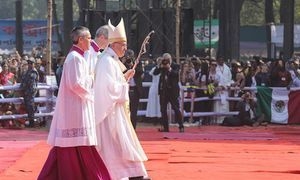
The aim of papal activity over the next year is to put more flesh on the inspiring blueprint the pope issued for his pontificate in 2013
Limited extract from Robert Mickens, Rome, subscription journal La Croix International 5 January 2018
We are just into the first week of 2018, but this new calendar year is already showing clear signs that this will be a challenging and exciting time for the continuing reforms Pope Francis has been trying to bring to the Vatican and the entire Catholic Church. The 81-year-old pope, who will mark his fifth anniversary as Bishop of Rome in only a few months from now, has a full slate of events over the next twelve months. They promise to form yet another series of decisive moments in his efforts to change the mentality and practice of what it means to be church in the 21st century. The aim of all this papal activity over the next year is to put more flesh on the inspiring, yet skeletal outline and blueprint Francis issued for his pontificate in the 2013 apostolic exhortation Evangelii Gaudium (Joy of the Gospel). “I dream of a ‘missionary option’, that is, a missionary impulse capable of transforming everything, so that the church’s customs, ways of doing things, times and schedules, language and structures can be suitably channeled for the evangelization of today’s world rather than for her self-preservation,” Francis wrote in that remarkable document. “The renewal of structures demanded by pastoral conversion can only be understood in this light: as part of an effort to make them more mission-oriented, to make ordinary pastoral activity on every level more inclusive and open, to inspire in pastoral workers a constant desire to go forth and in this way to elicit a positive response from all those whom Jesus summons to friendship with himself,” he stressed, still in the early months of his papal ministry.....(more). Photo: La Croix International/ucanews
'If one chooses to be more Catholic than the pope, at least do so with a touch of modesty'
Limited extract from Benoît Bourgine. subscription journal La Croix International 4 January 2018
Heresy is back. Not at the end of a dark alley or whispered at illicit meetings of nonconformists, but, we are told, at the very summit of the church, on the throne of St. Peter himself. In a petition, a few dozen priests and academics overtly accuse Pope Francis of propagating doctrines which "tend of themselves to the profaning of all the sacraments and the subversion of the Law of God." Let us be clear from the outset that there is no reason to doubt the sincerity of the signatories of the 25-page letter entitled "Filial Correction." The anguish they feel and which inspired them to put collective pen to paper is worthy of respect......(more)
Extract from Eric Hodgens, Pearls and Irritations, John Menadue website, 5 January 2018
2018 will be a fateful year for the Catholic Church in Australia as Melbourne gets a new archbishop. This appointment, if successful, offers some hope for the Church; if a failure, it will hasten the Church’s decline into insignificance. Here’s why. The national episcopal conference is of central importance because changes affecting the whole country require its approval. Pope Francis is encouraging national conference to be more proactive – in contrast to the policy of the last two popes who restricted conference authority. The Australian Conference of Catholic Bishops (ACCB) is in poor shape having been hit by a triple whammy of Roman constriction under the last two popes, the back room influence of Cardinal Pell and the public devastation of the Royal Commission into Institutional Responses to Child Sexual Abuse. The two popes exercised their control by carefully selecting compliant bishops and then closely supervising them. Over 35 years this led to a paralysis of local initiative and a policy of doing nothing without Rome’s approval.....(more)

Extract from Joam McCarthy, Newcastle Herald, 4 January 2017
The Australian Government should ignore the church/state divide and put “massive pressure” on the Catholic Church to name child sexual abuse as a crime in church law, says the American Catholic cleric who first blew the whistle on the global abuse scandal in 1984. “The church gave up this privilege long ago when they started to enable sex abuse, lie about it to society and cover up for abusers,” said Dominican priest Tom Doyle after the Royal Commission into Institutional Responses to Child Sexual Abuse’s final report in December recommended major changes, including to celibacy and the secrecy of the confessional. The government must link tax concessions with the need for significant change in the church because “when enough money goes away they start to feel the reality”, he said. Australian politicians needed to end the “deference and preferential treatment” given to the Catholic Church because “the deference accorded by many sectors in civil society has done its part to enable this harm, by allowing the churches to escape accountability”, he said in response to Newcastle Herald questions.....(more) Photo: Newcastle Herald, Tom Doyle Newcastle Herald

Migrants and refugees: men and women in search of peace
Extract from Pope Francis, published in Melbourne Catholic, Monday 1 January 2018
Peace to all people and to all nations on earth! Peace, which the angels proclaimed to the shepherds on Christmas night, is a profound aspiration for everyone, for each individual and all peoples, and especially for those who most keenly suffer its absence. Among these whom I constantly keep in my thoughts and prayers, I would once again mention the over 250 million migrants worldwide, of whom 22.5 million are refugees. Pope Benedict XVI, my beloved predecessor, spoke of them as ‘men and women, children, young and elderly people, who are searching for somewhere to live in peace.’ In order to find that peace, they are willing to risk their lives on a journey that is often long and perilous, to endure hardships and suffering, and to encounter fences and walls built to keep them far from their goal. In a spirit of compassion, let us embrace all those fleeing from war and hunger, or forced by discrimination, persecution, poverty and environmental degradation to leave their homelands. We know that it is not enough to open our hearts to the suffering of others......(more) Image: Pope Francis Facebook